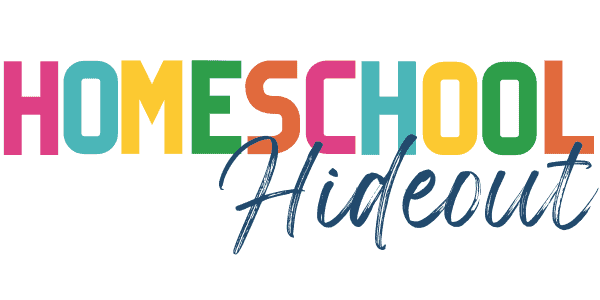

Our Favorite Creative Writing Curriculum
You guys. Next year my daughter will be in 9th grade. Do you know what that means? Yep. High School.
As a relaxed homeschooler who teeters on the verge of unschooling, the idea of earning credits and completing an entire curriculum has me shaking in my boots. Long gone are my days of “winging it” and letting the weeks slip by without touching our curriculum. Now, I must keep track of credits and plan ahead to ensure my daughter completes everything needed in order to attend college.
When I sat my daughter down and started discussing which classes she’d take, she had only one request: a creative writing curriculum. As a blogger, I’ve always loved writing, so I was giddy at her request. But even after all of the creative writing classes I’ve taken, I still don’t really know how to teach creative writing. So I set out to find a curriculum that would take the guesswork out of it.
This post is sponsored by WriteShop. I received the products for free & was compensated for my time. All opinions are 100% my own.
Going from relaxed homeschoolers to “semi-strict, gotta-get-this-done homeschoolers” is a huge change. My daughter isn’t the only one who is struggling with the thought of it. I knew there were several creative writing curriculum options on the market and I hoped and prayed that one of them would help us with the transition.
I had a few things that I really wanted included in our creative writing curriculum and I wasn’t willing to budge on them.
- We didn’t want a dry and boring curriculum that would make my daughter despise writing.
- I wanted something that brought her out of her shell and helped her feel more confident in her writing.
- There were dreams of a curriculum that didn’t require me to spend hours prepping and teaching. It needed to take out all the guesswork and clearly lay out all expectations for her.
- I still needed flexibility, as my other kids are still relaxed, almost-unschoolers . A rigorous schedule would interfere in life’s natural learning process.
Lucky for me, I found all of these things wrapped up in WriteShop I.

A Creative Writing Curriculum That Sparks Imagination
With WriteShop I, we opted to take the 2 year path so we could enjoy some flexibility in our writing. Each lesson takes 2 weeks to complete so there’s no need to rush through the information. Each concept is presented and built upon until the idea becomes second natural to the student.
In each lesson, kids will work through a series of hands-on activities to help them thoroughly understand each concept:
Pre-writing activity:.
Activities that are designed to build skills, help kids understand the introduced concepts and help them feel more comfortable with new ideas.
Brainstorm & Write a Practice Paragraph:
Students will brainstorm for the upcoming assignment and construct a practice paragraph.
Jot Down a Sloppy Copy:
The sloppy copy is a great way to help kids focus on getting their pencil on paper and not worry about grammar, spelling and other details. They organize their ideas into paragraphs and add more details and information.
First Revision:
Give the kids a chance to edit their own work before you dive into it. This will put the responsibility back on the writer to find and correct mistakes.
Teacher/Parenting Edit:
Using the Teacher Checklist, editing writing has never been so easy! Simply go through the steps and make suggestions as the list suggests. You want in on a secret? Us mamas don’t have to be a word-lover to be able to edit your child’s papers. You just need the perfect creative writing curriculum. ( Hint: this is it!!! )
WriteShop also stole my heart when I found the “Addressing Errors Lesson by Lesson” section of my teacher’s manual. WOWZA! It addresses every single issue I’ve ever came across and it offers solutions to help your child become a better writer.
Final Draft:
Students will create a final draft based on the edits and suggestions of the teacher. They’ll learn new concepts and key points to becoming a better essay writer through each lesson. They’ll even be proud to show off their compositions!
Teaching with a Creative Writing Curriculum that Covers It All
If you’re anything like me, you are struggling to find the perfect creative writing curriculum. But teaching creative writing doesn’t have to be scary or hard. I kid you not when I say that WriteShop has outdone themselves. I’ve seen plenty of curriculum and I’ve never laid eyes on a Teacher’s Manual that covers everything as completely and thoroughly as WriteShop has done. The sections it covers takes the guesswork out of teaching and editing your students’ work. Each section is neatly organized and streamlined with only the most vital information.
Sections include:
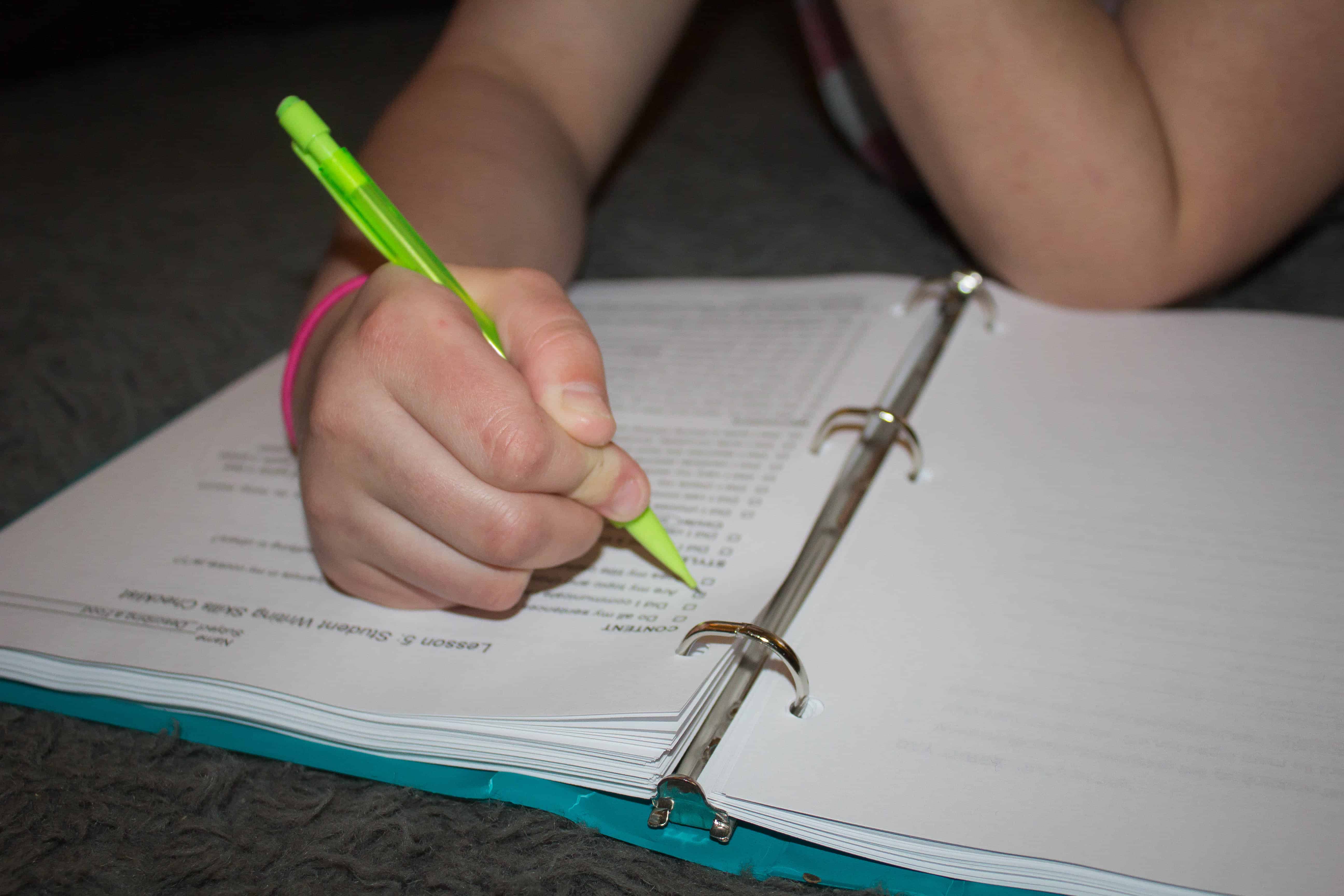
Lesson Plans
Editing & Evaluating
Positive & Encouraging Comments
Addressing Errors Lesson by Lesson
Common Problems of Mechanics
Student Writing Samples
Skill Builder Keys
Pre-Writing & Lesson Activity Keys
Appendix A: Handy References
Appendix B: Supplemental Activities
Seriously! Have you ever seen anything so thorough? I love the fact that the folks at WriteShop want to make sure ALL of the bases are covered. They’ve thought of the issues I’ve faced, long before I’ve faced them. And even better, they’re ready and waiting with a solution right at my fingertips!
If you’re looking for a comprehensive creative writing curriculum that won’t break the bank, you do NOT want to miss WriteShop! Down to the last details, they’ve gone above and beyond to make it easier for you and your child to fall in love for writing.
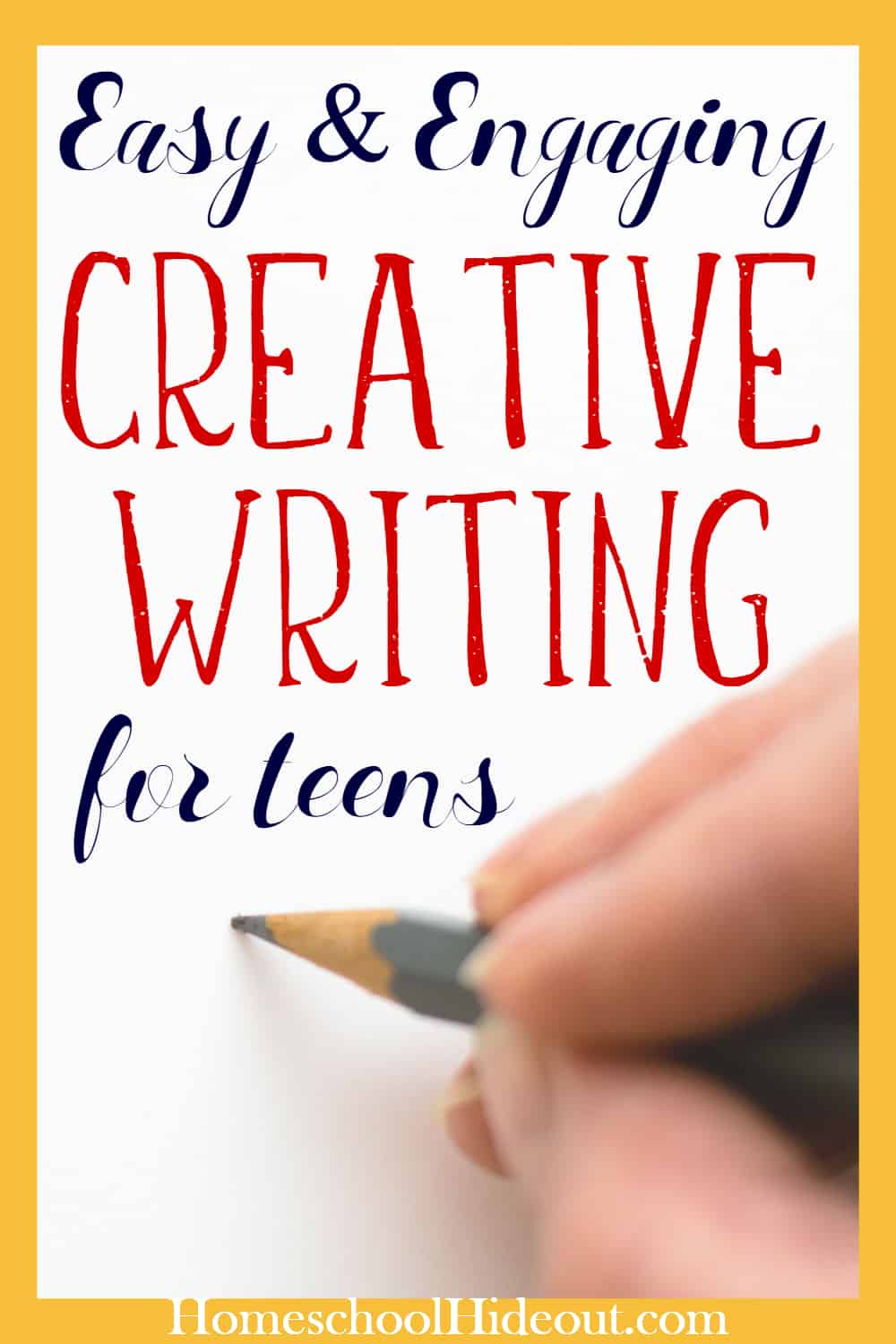
Want More From WriteShop?
Grab a free gift.
You don’t want to miss this bundle! It includes a total of 480 writing and essay prompts to inspire both elementary and teen students for an entire calendar year! You get two different products with a total value of $7.00.
Print the prompts in your choice of three formats: calendars, cards, or strips. Only available for a limited time.
Grab their “Journal All Year!” Elementary Writing Prompt Calendar Scoop up the “Journal All Year!” Teen Writing Prompt Calendar
Get Social with WriteShop!
Request a catalog, check out samples, more from my site.
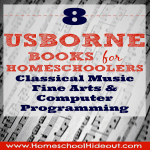
Share this:
- Click to share on Facebook (Opens in new window)
- Click to share on Pinterest (Opens in new window)
- Click to share on Twitter (Opens in new window)
- Click to share on Reddit (Opens in new window)
- Click to email a link to a friend (Opens in new window)
- Click to print (Opens in new window)

Complete Guide to Homeschool Writing Curriculum for Every Budget and Age

Looking for a homeschool writing curriculum that will educate and motivate your child to write with excellence?
It can be a hard road, Homeschool Mama!
Writing is one of the three core subjects (reading and math are the other two) that form the basis of a solid education – which is why it can be so stressful for the homeschooling parent!
We feel the pressure to develop strong writers, but we also want our kids to love writing. It can be hard to achieve both of those things.
Blessedly, there is a mountain of homeschool writing curriculum out there that can fit any homeschool style, education philosophy, budget, and family size!
This blog post is going to be your complete guide to the 12 best and most loved homeschool writing curriculums on the market.
Think of it as a one-stop-shop to explore curriculum you’ve heard of but don’t know that much about – or to discover new curriculum that is just right for your homeschool!
Enjoy and happy homeschooling!
Ultimate Guide To The 12 Best Homeschool Writing Curriculum Options

Below I have provided quick reference information for each curriculum in terms of grade level, materials needed, price, and details.
Price is for new curriculum and according to prices available to me as I write this.
1. IEW (Institute for Excellence in Writing)

For Grades : 1st grade – 12th
What You Need : Teacher’s Guide and Student Book
Price : $55
Details About IEW:
This was the first homeschool writing curriculum that we tried, and I think it truly set an excellent foundation for my then 3rd grader.
Our co-op at the time taught it every year, but I sat down and did the actual lessons and writing with her during the week.
I loved that it did such a thorough job teaching kids how to put a keyword outline together for a structured, low-stress writing experience. As a writer myself, I understand how important an outline is to keep you organized and productive!
IEW is also very big on teaching vocabulary words and encouraging students to use more “interesting words” in their writing. To this day, my daughter still includes lots of adjectives and “strong verbs” in her writing because of her experience with IEW. She also carefully avoids using the “banned words” like “big” and “good” – why use those words when there are so many other more descriptive and colorful word choices out there!
Another fun part of IEW is that you can choose what theme you want your child to use for the year. For example, grades 3-5 can pick from “ Fables, Myths, and Fairy Tales ,” “ Bible Heroes ,” “ Ancient History ,” or” All Things Fun and Fascinating .”
If you are looking to build a strong foundation in writing, I would recommend IEW for an excellent beginning. It was easy to teach, reasonably priced (definitely use the above links to check for used prices on Amazon), and solid.
I have not used the higher levels, but I have often heard it discussed as the gold standard for homeschool writing.
Keep in mind that the IEW grammar program is sold separately.
2. BJU Writing & Grammar

What You Need : Teacher’s Guide and Student Workbook
Price : $110
Details About BJU Grammar and Writing:
BJU Writing & Grammar is the next writing program we tried. When our co-op shut down for the pandemic, I realized I was on my own for teaching writing.
We shifted gears to BJU Press because it bundled together grammar and writing, which would be a big time saver.
My favorite thing about this homeschool writing curriculum is that it teaches the writing process perfectly. My then 4th grader learned the steps of Planning, Drafting, Revising, Editing, and Publishing – steps that she still uses today.
I loved that my kid was being taught to draft an entire piece in one day and that it didn’t need to be perfect! She could just pour out her thoughts on paper or “make the dough” as we called it. And then we would shape the dough during revising and editing later in the week.
This helped very much with her paralysis with writing, because she felt overwhelmed with it being perfect.
She still uses these writing process steps for her writing today and I even still make her editing checklists similar to what the book had so she can edit her own work.
I would strongly recommend BJU Grammar and Writing for strong grammar, time-saving, and high-quality writing.
3. Writing With Ease/Writing With Skill

For Grades : 1st – 12th
What You Need to Buy : Writing With Ease (elementary level) only requires a student workbook. Writing With Skill will require a student workbook and Instructor Text (teacher’s guide).
Price : $25 – $50
Details About Writing With Ease and Writing With Skill:
I love this super gentle writing curriculum from A Well Trained Mind and written by Susan Wise Bauer.
I am on my second round of using Writing With Ease (the elementary level) with my younger children, and I absolutely recommend it as a beautiful introduction to writing.
Every week I read sections of classic stories to my daughter and I ask her listening comprehension questions that she has to answer in full sentences. She thinks it’s just a fun story and talking time with mom, but there is a specific purpose.
This process teaches her what a complete sentence is and what a fragment is – which is key information before you sit down to write.
There is also copy work of classic literature, grammar instruction, and writing original thoughts.
I haven’t used the next levels of this writing program from Susan Wise Bauer yet, but if this quote from The Well Trained Mind is any indicator, you need to check it out!
“We offer a variety of easy-to-use resources for teaching the vital skill of written communication. Our Writing With Ease series teaches elementary students how to transform thoughts into coherent paragraphs. Writing With Skill adds many other skills for middle and high schoolers, such as outlining, research, citation, and the construction of full-length essays in history, literature, science, and other subjects. The Creative Writer helps them write a best-selling novel that will get turned into a worldwide blockbuster movie starring Benedict Cumberbatch, which will enable them to support you in your old age.”
There are four levels of Writing With Ease and three levels of Writing With Skill .
4. WriteShop

For Grades : K – 12th
What You Need to Buy : WriteShop Primary (ages 5-9) requires an activity pack and a teacher’s guide. WriteShop Junior (ages 8-13) can pick from a number of things or bundle them all together: activity pack, teacher’s guide, fold-and-go grammar guide, and time-saver pack. WriteShop 1 & 2 (Middle School/High School) requires a student workbook, teacher’s guide, and dictation/copy work guide.
Price : $41 – $110
Details About WriteShop:
WriteShop is a homeschool writing curriculum that I’ve had my eye on for a long time. In all of my homeschooling blogging circles, I seem to always hear buzz about how incredible this writing program is!
I have done some homework, and it is beautifully laid out, colorful, and so engaging from first sight. It is known for fun activities, engaging writing assignments, and its step-by-step, incremental approach to teaching writing skills.
And as an added bonus, WriteShop focuses on teaching the homeschool parent how to teach writing – in an easily understandable way.
The lower levels enjoy fun, hands-on writing activities to get kids excited about writing! I love that there are supply lists in the teacher’s guides (all regular things you’d have in the house) to teach a writing lesson!
And the assignments would catch any kid’s attention: science fiction, adventure, and mystery story writing!
There are also additional resources on the website that you can use alongside WriteShop or as a writing supplement to your current curriculum. Check out StoryBuilders and Writing Prompts for some fun springboards for creative writing!
The higher levels allow students to work more independently, and there is even a video course offered.
It may be difficult to know which level you need to start with, so definitely check out the WriteShop placement test .
To find out more about Writeshop, head on over to their website or check out this full review from MeaningfulHomeschooling .
5. BraveWriter

What You Need to Buy : BraveWriter offers bundles of their curriculum that covers multiple kids, but they are very relaxed about what you “need.” It is cheaper overall to buy the bundle, but you can also just start out with one of their books, and go from there. Online classes are also offered. They are taught by homeschool parents, who are also published authors.
Price : $50 – $229 (bundle price)
Details About Brave Writer:
Brave Writer is definitely the most unique writing curriculum that I have researched yet.
This writing program was written by Julie Bogart, a homeschool mom who has 5 homeschool graduates to her credit.
Brave Writer promotes a “Brave Writer Lifestyle” that focuses on raising kids in a language-rich environment where they will learn to not just be a good writer – but to love writing. There is a large focus on reading great books aloud and a weekly poetry tea time (I love that!), and less of a focus on structured lesson plans and “you have to write this many sentences.”
Parents are encouraged to purchase one bundle and adapt it to teach all the grades in their homeschool. That is a huge time saver!
Learn more at the Brave Writer website or check out this full review at This Simple Balance .
6. Wordsmith

For Grades : 4th – 12th
What You Need to Buy : Each level only requires one book. Level 2 suggests buying a helpful teacher’s guide.
Price : $18
Details About Wordsmith :
Wordsmith is an economical homeschool writing curriculum from Janie B. Cheaney, a published author of six books.
She provides a simple, easy-to-use curriculum that is broken up over three main books.
Wordsmith Apprentice (4th-6th grade) :
“All the practicality, humor and fun of Wordsmith, but written for the younger student, ages 9-12. An easy to use writing course encouraging students to develop their writing skills as they participate in every role on a newspaper staff: editor, reporter, writer, etc. Children develop a love for writing as they express themselves through sentence and paragraph writing, persuasive writing, and much more. The third edition has a larger font and cleaner type for easier reading. With added examples and delightful new illustrations, developing writing skills is made fun and easy.”
Wordsmith: Building Skills (6th-9th grade) :
“Confidence is what most young writers lack, and Wordsmith is designed to lead them to the place where they can read over their own work and think, “Hey—that’s pretty good!” Wordsmith is the core book in the series, the one that every student from age 12 and up should complete, especially if their writing skills lag behind the recommended level.”
Wordsmith Craftsman (9th-12th grade) :
Part Three of Wordsmith Craftsman is a master class on The Essay, pulling together thought, organization, logic, personal connection, and style. A well-written essay is rightly considered the mark of an educated, thoughtful man or woman. A student will learn how to apply the TOWER process (Think, Organize, Write, Evaluate, and Rewrite) to a variety of essay types, namely descriptive, narrative, expository, critical , and persuasive . The expository section includes a primer on the all-important first step in writing research papers (which will save a lot of freshman-comp angst later!).
There are sample lessons for all three of their books. Hop on over to the Wordsmith website to check them out and see if this homeschool writing curriculum best fits your homeschool!
7. Clear Water Press

For Grades : 6th – 12th
What You Need to Buy : Student Kit and matching DVD or Cloud Access
Price : $258 – $343
Details About Clear Water Press :
ClearWater Press is the perfect writing curriculum for aspiring authors! Students are taught this creative writing course through in-depth video lectures while they work on year-long writing projects.
Below are the details of their three main curriculum books.
Cover Story (6th-9th grade) :
“The Cover Story magazine writing program works with your student, not against them. Award-winning author Daniel Schwabauer takes 6th–9th graders on a creative journey writing their very own magazine through engaging videos. The optional grammar lessons make Cover Story a full English Language Arts! Choose to watch Cover Story lessons on Cloud streaming or DVDs.”
One Year Novel (9th-12th grade) :
“Author Daniel Schwabauer takes 9th–12th graders under his wing to write their own compelling original novel—for a high school English credit! His unique approach begins where many writing courses don’t go at all, with an exploration of how Story works . A creative community and support resources help students thrive. Video lessons now available on Cloud streaming only.”
Byline Journalism and Essay Writing (9th-12th grade) :
“In the Byline journalism and essay writing program, students step into the role of a 1930s-era newspaper reporter, training under Editor-in-Chief Daniel Schwabauer, who takes them under his wings to teach them everything he knows. Before they even realize it, they master the dreaded high school essay! Choose to watch Byline video lessons on Cloud streaming or DVDs.”
Head on over the Clear Water Press website to find out more information and see sample lessons !
8. Writers in Residence: Apologia

What You Need to Buy : All in One Student Text and Workbook, answer key, additional workbooks for teaching more than one child
Price : $21 for one student
Details About Writers in Residence :
I have to be honest with you all, I had no idea that Apologia offered anything besides science! Apparently, they do offer a full language arts program through their Writers in Residence series!
I love that it is designed to be used with multiple children at the same time – a huge time and money saver for homeschoolers with multiple kids!
Your students will learn about everything from sentence structure to short stories to persuasive essay writing – all through a Christian worldview lens.
“Thorough and systematic, six units and twenty-four modules are included, with lively and colorful lessons building on previously-taught concepts, skills, and terms. The easy-to-use, “all-in-one” Student Text and Workbook features an engaging tone that’s written directly to the student. Each unit opener includes a focus on a Christian writer, unit overview, and rubric; units include models from professional writers for students to study and use as an inspiration for their own writing. Modules integrate clear, engaging instruction with sidebar notes and a variety of exercises. Assignments cycle through four types of writing tasks: I Remember: assignments focused on the personal narrative I Imagine: creative writing assignments such as short stories, poetry, and novels I Investigate: research skills assignments I Think: tasks that teach opinion and argument writing, including persuasive and argument writing”
To find out more, check out Rainbow Resource, Christianbook.com, or Amazon for reviews, sale prices, and more details!

What You Need to Buy : Student Text and Teacher’s Guide
Price : $45
Details About Jump In :
Jump In is a budget-minded homeschool writing curriculum focused on getting middle school students ready for the expectations of high school writing. It has a gentle, low-stress format that is focused on independent student writing.
“What to do when high school is just around the corner and your middle schooler HATES to write? Jump In: Middle School Composition covers all the basics needed for high school writing in an engaging fashion; humor sneaking in occasionally. Daily lessons will take 5 – 20 minutes to complete. Instruction is written directly to the student and sometimes involves Bible stories or characters. Lessons might start with 10-Minute Writing Plunges that are designed to engage reluctant writers or appeal to eager writers. Or the Plunges can be a break from other assignments or a course by themselves. Plunge prompts are given M-Th with no grading (or turning in). On Friday, the student chooses which one they like best, proofreads it, and gets it ready to hand in.
10. Essentials in Writing

For Grades : K-12th
What You Need to Buy : Student Workbook, Instruction Manual, and access to video lessons
Price : $69-$89
Details About Essentials in Writing :
Essentials in Writing is a video-based course that will take a lot of stress off the busy homeschool parent or the parent who is intimidated to teach writing.
The format is rather simple. The student watches a video (DVD or streamed) and then completes the corresponding workbook pages. The parent is responsible to look over the work and discuss it with the child.
There are also fun hands-on activities, such as time capsules, that will get kids excited and engaged with the writing process.
“Looking for a complete English course for all grade levels that is well organized, thorough in explanation, effective in teaching and easy to use in a homeschool or group setting? Then consider Essentials in Writing! Video instructor Matthew Stephens taught English at the elementary and high school levels for years, and he used his experience to good effect in authoring this course. Video lessons featuring Mr. Stephens are the essence of the course, with supporting workbook activities as follow-up. Mr. Stephens is doing the heavy lifting of presenting and explaining the material, leaving only clarification and follow-up questions to the home instructor. Lessons are presented in bite-sized chunks, so each day’s lesson features one main point. The quality of the video and audio is good, showing Mr. Stephens teaching in front of a classroom on a white board. For younger grades, the teacher and student would watch the videos together, then discuss to make sure that the student grasps the main ideas of the presentation. Students at more advanced grades can watch the videos on their own (as the instruction is always directed to the student), leaving only follow-up discussion of the material and assignment to the teacher. Of course, the instructor should preview the video material to ensure knowledge of the material and consistency of approach in working with the student.”
Check out the Essentials in Writing website for more information, sample lessons, and videos!
11. Writing Strands

For Grades : 5th – 12th
What You Need to Buy : One Student Book and One Teacher’s Guide (One teacher’s guide covers all 6 levels of Writing Strands)
Price : $40
Details About Writing Strands :
Writing Strands is a full language arts and writing curriculum from Master Books. It is a newly revised edition that has streamlined and improved on the older version.
The curriculum includes a Beginner, Intermediate, and Advanced level and has a Christian Worldview.
You will find clear daily schedules, opportunities for independent work, and writing lessons based on the analysis of literature and scripture.
Here is a snippet of the curriculum description for Writing Strands Book 2:
“This resource covers 180 days of instruction and includes a weekly lesson schedule, student worksheets, and an answer key for the objective questions in the reading lesson portion. Each week alternates between writing lessons and reading lessons; for their reading, students will read biblical passages as well as books chosen and assigned by the parent. A weekly lesson schedule is also included. This comprehensive approach will help students begin to develop a solid foundation in communication as they focus on basic, creative, organizational, and descriptive writing skills. This course alternates a week of writing exercises with a week of reading and discussing books and ideas.”
12. Writing & Rhetoric

For Grades : 3rd and up
What You Need to Buy : Student Edition and Teacher’s Edition
Price : $40 (for one semester)
Details About Writing and Rhetoric :
Writing & Rhetoric is an award-winning series of writing curriculum books.
Each book will only cover one semester, so if you stay on track, you will be doing 2 books per year.
Books 1-6 are for grades 3-6. Books 7-12 are marked for grades 6 and up.
Here is a description of this overall curriculum:
“Writing needs to be taught just like any other subject, and letting students be ‘free’ to write without a model is often letting them jump in the deep end without learning to swim first! Writing & Rhetoric assumes students learn best by first reading excellent literature and then imitating those writers. Students who complete the entire program will learn to write narrative, expository, descriptive, and persuasive essays while developing their own unique style. Each exercise is designed to teach a skill that can be employed across all subjects. Skills are arranged from simple to complex, and the cumulative nature of each chapter reviews skills from earlier in the book, helping students to build a solid foundation of writing skills.”
Recap: Best Homeschool Writing Curriculum
I don’t know about you, Homeschool Mama, but it’s going to be very difficult to choose between all of these writing curriculums!
I do hope that you found a few that you want to research, dig deeper into, and hopefully use in your homeschool.
Of course, this is not a complete list of all writing curriculum – I would need a whole book to write out everything that is out there!
Please drop a comment and share if you have a favorite writing curriculum that I didn’t list above!

Leave a Reply Cancel reply
Your email address will not be published. Required fields are marked *
BEST Homeschool Writing Curriculum Picks // Options 2024
- August 9, 2023
- Homeschool Curriculum & Reviews
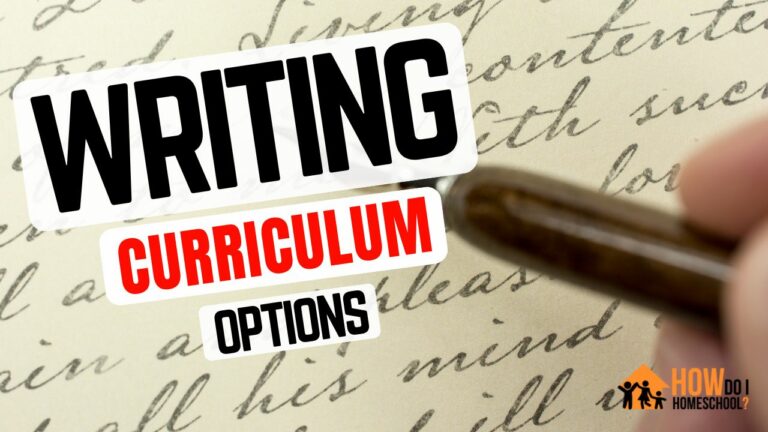
When it comes to homeschooling, one of the essential skills parents strive to teach their children is effective writing. The ability to communicate thoughts, ideas, and stories in a coherent and engaging manner is a cornerstone of education. As such, selecting the right homeschool writing curriculum becomes a crucial decision for homeschooling families. In this article, we will delve into some of the top writing curriculum options available, each offering a unique approach to cultivating strong writing skills.

I hope you enjoy reading this blog post. If you want to do my course on how to homeschool, click here .

BJU Press Writing Curriculum
BJU Press is a well-loved and popular homeschool curriculum. They offer a comprehensive homeschool writing curriculum for all grades , fostering essential skills in effective communication.
Through a focus on writing and grammar, students enhance their language mastery, expand their vocabulary, and learn to contextualize words.
The curriculum’s holistic approach extends to literature appreciation, guiding students to read literature through a biblical lens and equipping them to handle objectionable elements biblically.
BJU Press Literature introduces diverse genres, hailing from various cultures, nurturing critical thinking skills and an understanding of literary techniques in Scripture.
This integrated program cultivates well-rounded communicators equipped with language precision, analytical acumen, and an ethical framework, ensuring their readiness for both academic and life endeavors.
Check out their program here .
A Gentle Feast Manuscript Writing
A Gentle Feast presents the enriching “100 Gentle Lessons in Manuscript Handwriting” program, thoughtfully tailored for children around the age of 6 who are prepared for formal handwriting instruction.
Drawing inspiration from Charlotte Mason’s educational philosophy, the curriculum encapsulates the essence of short lessons, fundamental strokes, and gradual progress.
Infused with the artistic beauty of classical paintings, poignant poetry, and captivating coloring pages, this program transforms handwriting into an engaging and holistic learning experience.
With a strategic approach, the curriculum commences with lowercase letters, enabling students to familiarize themselves with the most frequently used characters in reading and writing.
Notably, the program accommodates left-handed learners, with its unique top-bound design featuring sample letters on both sides of the handwriting lines.
By teaching letters in stroke groups, the program promotes effective muscle memory, facilitating the acquisition of elegant handwriting skills.
Through “100 Gentle Lessons in Manuscript Handwriting,” A Gentle Feast skillfully combines artistic inspiration, pedagogical wisdom, and thoughtful design to nurture a child’s journey towards handwriting mastery, in alignment with Charlotte Mason’s educational principles.
Schoolhouse Teachers 34 Week Writing Program
The Writing Life: Learn to Write Well homeschool course offered by Schoolhouse Teachers provides an essential platform for students to cultivate concise, clear, and influential writing skills, irrespective of their future career paths.
With a comprehensive duration of 34 weeks and tailored for grades 9-12, this text-based program underscores the universal importance of effective written communication.
By focusing on the art of writing and its impact, the curriculum equips students with the tools to convey ideas powerfully.
Minimal supplies are required, with access to corresponding lessons on SchoolhouseTeachers.com and a journal for note-taking and research.
The course’s structure is intuitive, guiding students to download lesson plans and lesson files from the Class Lessons section, enabling a gradual and organized progression through the curriculum.
Through “The Writing Life,” students embark on a transformative journey that enriches their writing abilities, fostering proficiency in articulating thoughts and emotions with clarity and precision.
Creative Writing with ABeka
ABeka introduces students to the diverse and captivating facets of the English language through its Creative Writing program.
This comprehensive curriculum embarks on a journey encompassing exquisite penmanship, the art of figurative language, and the eloquence of poetry, allowing students to refine both the appearance and content of their writing.
Rooted in the belief that writing reflects observation, ABEKA empowers students to keenly observe their surroundings and translate these observations into eloquent prose.
The curriculum equips students with a range of literary tools, including various poem forms, alliteration, and metaphors, enhancing their ability to recognize and adeptly employ these elements.
With 17 penmanship tests and an array of creative writing exercises, this text not only hones students’ writing skills but also fosters a deeper appreciation for the art of expression.
Through ABEKA’s Creative Writing program, students are guided to master the intricacies of written communication, from the aesthetic allure of penmanship to the captivating depths of figurative language, ultimately nurturing a well-rounded and skilled approach to the craft of writing.
Institute for Excellence in Writing (IEW)
The Institute for Excellence in Writing (IEW) stands as a respected institution dedicated to fostering proficient writers through a full writing curriculum.
Founded by Andrew Pudewa, IEW prioritizes effective communication skills by providing tailored writing programs for various age groups.
From early elementary to high school, IEW’s structured approach equips students with essential writing tools, encompassing organization, reasoning, and persuasive techniques.
IEW’s emphasis on teaching diverse writing forms empowers students to master reports, essays, narratives, and more.
The integration of literature study enhances comprehension and analytical abilities while cultivating a profound appreciation for language.
By offering resources for educators, IEW ensures a holistic writing education that prepares students for academic success and confident expression.
Check out their program here or find a review of IEW here..
Easy Peasy All-in-One Homeschool
Within the framework of Easy Peasy All-in-One Homeschool , students are provided with a foundational free homeschool writing curriculum course that focuses on developing handwriting skills.
This free course progressively guides students through the process of mastering both letters and numbers.
As the course unfolds, students advance from learning individual letters and numbers to composing words, sentences, and more complex written forms by the culmination of the academic year.
The writing curriculum includes a set of printables and workbooks designed to facilitate offline learning or complement the online course.
These resources offer flexibility in how students engage with the materials, catering to different learning preferences and environments.
Easy Peasy All-in-One Homeschool’s approach to writing underscores its commitment to laying down strong foundational skills.
By enabling students to build proficiency in handwriting, the program equips them with an essential skill set that serves as a cornerstone for future writing endeavors.
Whether students are at the beginning stages of letter formation or progressing towards constructing sentences, this writing option ensures a structured and gradual development of writing abilities.
AOP Writing Options
Explore opportunities to enhance your homeschooler’s reading and writing skills with AOP language arts courses and electives.
This selection encompasses a range of options suitable for various grade levels and curricula.
Monarch’s online platform integrates reading, writing, listening, and speaking lessons, while elective choices like American Literature, British Literature, and Speech are available for grades 3-12.
The LIFEPAC print worktexts offer self-paced learning of essential language arts concepts across grades K-12.
Horizons print workbooks present customizable word lists and writing assignments, with phonics-based programs like Spelling & Vocabulary and Phonics & Reading contributing to comprehension enhancement for grades 1-3 and K-3, respectively.
Writing Strands by Master Books
Experience the comprehensive homeschool writing curriculum offered by Writing Strands, a composition series interweaving grammar instruction seamlessly.
This user-friendly program features a convenient daily schedule that requires 30 to 45 minutes per lesson, five days a week, effectively saving preparation time.
The systematic breakdown of writing instruction ensures accessibility, covering dialogue, reporting, persuasion, story writing, and more in Beginning levels, progressing to sentence structure, paragraph usage, point of view, and character creation in Intermediate stages.
Advanced levels refine skills in writing reports, short stories, essays, while also exploring literary devices. The program uniquely integrates composition with Bible-based literature study.
Complementing the student experience, the Teacher Companion serves as a vital resource for educators, offering an overview of the Writing Strands system and addressing various writing, grammar, and literature concerns across all levels, making it an indispensable tool for successful writing and literary analysis instruction.
Gather Round Homeschool Writing Curriculum
Gather ‘Round Homeschool offers a versatile array of writing options designed to foster students’ writing skills across different age groups and proficiency levels.
Among these options are the Essay, Report, Paragraph, Vikings, and Underground to Canada Writing Tracks, each available in both printed and digital formats at $14.95 and $12.95 respectively.
The Essay Writing Track facilitates the development of persuasive essay-writing abilities, while the Report Writing Track hones research and presentation skills.
The Paragraph Writing Track focuses on concise and effective paragraph composition.
For those intrigued by specific themes, the Vikings and Underground to Canada Writing Tracks offer engaging content.
These options cater to Early Readers, Early Elementary, Upper Elementary, Middle School, and High School levels, accommodating various developmental stages.
Whether families prefer tangible printed materials or the convenience of digital resources, Gather ‘Round Homeschool ensures accessible and engaging writing resources that empower students with essential writing tools and techniques.
Writing with Ease from Well-Trained Mind
The Writing With Ease Four-Year Guide offers a carefully structured homeschool writing curriculum for students to develop elegant writing skills over four graded levels of assignments.
Its adaptable approach allows integration of personal reading choices for narrations and copywork, enhancing interdisciplinary connections.
While optional alongside the Workbooks, the guide provides an insightful overview of the comprehensive four-year writing curriculum, aiding educators’ understanding and troubleshooting.
Combining the guide with the Workbooks streamlines teaching, offering comprehensive support and efficient preparation.
Whether used alone or with the Workbooks, the guide empowers educators and students with a structured path toward confident writing, fostering fluency and finesse in expression.
New American Cursive Homeschool Writing Curriculum
While writing skills encompass more than just penmanship, New American Cursive from Memoria Press recognizes the importance of neat handwriting as a part of effective communication.
This curriculum teaches students a fluid and legible cursive style while also introducing them to basic writing exercises.
Winning with Writing
Winning With Writing is a secular homeschool writing program designed for grades 1 to 8, corresponding to each grade level.
The curriculum is structured based on a 36-week school year, with each week consisting of five separate daily lessons.
The program covers various writing aspects, including direct and indirect quotations, dialogue, creative writing, how-to writing, personal narratives, descriptive writing, and persuasive writing.
Each level provides ample writing space in workbooks with 36pt. blanks and dotted guidelines.
Subscribe to How to Homeschool (Youtube channel)
If you’re eager to know more about homeschooling and you’re new to this whole home education thing, hop on over to my YouTube channel , where a treasure trove of homeschooling wisdom awaits.
From practical tips to curriculum reviews and more, you’re going to love it!
Enroll in the Homeschool Parenting Program
For those yearning for a comprehensive guide to homeschooling, look no further than my Homeschool Parenting Program .
This online course will equip you with the knowledge, strategies, and confidence to navigate the exhilarating world of homeschooling like a seasoned pro.
Enroll today and unlock the door to extraordinary educational possibilities.
The Bottom Line
Choosing the right homeschool writing curriculum for homeschooling involves considering factors such as teaching philosophy, learning style, and the individual needs of the student. Whether you opt for a structured approach like ABEKA or a more creative method like A Gentle Feast, each curriculum option offers a unique path to nurturing strong writing skills in the comfort of your homeschool environment. Remember that the key to success lies in finding the curriculum that aligns best with your child’s learning preferences and educational goals.
Rebecca Devitt
Most adults don't particularly want to relive their schooling experience on a daily basis. They would gladly move on to a new life devoid of homework and teachers. Very, very few adults will passionately blog about their schooling some 15 years after graduating. This makes Rebecca Devitt somewhat unique. As it happens, she was homeschooled. And she loved it. Still does. And she wishes every kid could get a taste of homeschooling at its very best. Her website How Do I Homeschool , is a springboard for parents to see what a life of homeschooling could be for both them & their children. When she's not blogging Rebecca is still homeschooling her-adult-self by learning Latin, growing weird vegetables and most importantly looking after her two children Luke & Penny. She has a husband Tristan and is a participant at Wollongong Baptist Church. She's also written a book about why parents should homeschool called 'Why on Earth Homeschool' .
Related Posts

10 Affordable Homeschool Curriculum PICKS [2024]
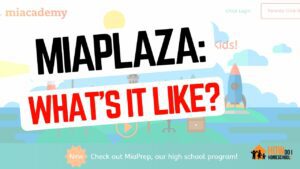
Miacademy Review || Homeschool Curriculum [MUST-READ] 2024
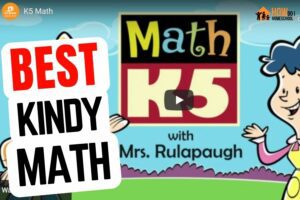
BJU Press Online Math K5 REVIEW (with Mrs. Rulapaugh)
Leave a reply cancel reply.
Your email address will not be published. Required fields are marked *
Name *
Email *
Add Comment
I accept the Privacy Policy
Post Comment
Homeschool Writing Curriculum: 17 Actually Engaging Options
The specifics of a writing curriculum will vary, but a comprehensive curriculum should cover a progression of skills, increasing in complexity and sophistication from elementary to high school. Here's which homeschool writing programs best prepare kids to be great writers.

Prisma is the world’s most engaging virtual school that combines a fun, real-world curriculum with powerful mentorship from experienced coaches and a supportive peer community.
The Power of Being a Great Writer
Living in an era dominated by rapid technological advances and artificial intelligence, it’s harder than ever, as educators and homeschooling parents, to figure out what skills kids will need to succeed in the future.
For example, why should we care about writing in the age of AI? Will technology make traditional skills like writing obsolete? On the contrary, at Prisma we believe the rise of AI makes writing more important than ever . While AI can generate text and even mimic human-like writing, it lacks the nuance, critical thinking, and empathy that are the hallmarks of human communication. The best human writers will always be able to use their command of language arts to influence others.
Plus, the practice of writing skills is important for children’s brain development. As Flannery O’Connor aptly stated, "I write because I don't know what I think until I read what I say." The writing process enables us to crystallize our thoughts, stimulating disciplined and critical thinking —a skill that remains irreplaceable by AI. Whether it's a scientist explaining a complicated theory or an entrepreneur pitching their company to investors, the ability to articulate thoughts clearly & with originality is indispensable.
Moreover, writing fosters empathy . Writing, especially creative writing, allows us to imagine and understand different perspectives—an emotional skill that even the most advanced AI lacks. Empathy is vital for personal relationships, teamwork, and any profession involving human interaction.
Furthermore, writing teaches resilience . It's a journey filled with trials and errors. Children learn to handle setbacks, receive criticism, while continuously revising their work, skills that instill adaptability and persistence.
And it's a skill where we see a worrisome trend. According to a recent National Assessment of Educational Progress (NAEP) report, only 27% of students in America achieved or exceeded proficiency in writing. This statistic rings alarm bells about the declining writing skills among our children.
As we guide our children's learning paths at home, our responsibility extends beyond teaching writing. Our aim is to help them appreciate writing as a tool for thinking, empathizing, and persevering. Despite the rise of AI, the art of writing is here to stay. It's not just a skill, it's a compass—a compass that will guide our learners to navigate the evolving landscape of the future with thoughtfulness, empathy, and resilience.
Selecting a Homeschool Writing Curriculum: Key Factors
Choosing a homeschool writing curriculum is a crucial decision, as it will greatly impact your child's development of writing skills. Here are some key factors to consider:
- Your Child’s Interest in Writing: Is your child a very reluctant writer who may need an online app with gamified elements or lots of varied, hands-on worksheets to stay interested? Or is your child a voracious reader & enthusiastic future author who might do better with open-ended journaling, creative writing prompts , and research papers on topics they’re interested in?
- Your Child’s Learning Needs & Style: If your child has any learning differences, such as dyslexia , ADHD, or autism, you should evaluate any possible curriculum for accommodations and supports. Also consider the way your child prefers to learn. Do they like variety or lots of structure? Pen and paper or digital? Visual, audio, or hands-on?
- Level of Interaction: Consider the level of interaction the curriculum offers. Does it provide opportunities for discussions, peer review, or one-on-one feedback sessions? Interaction can often boost motivation and improve learning outcomes. You could even look for programs that offer live online instruction (we share a few options below).
- Alignment with Goals: What are your goals for your child's writing education? Do you want them to homeschool permanently, or do you hope to have them transition to a more traditional high school or college? If so, make sure the curriculum you choose prepares your learner to write aligned to Common Core standards , and make sure you feel comfortable supporting them.
- Flexibility: Look for a curriculum that allows flexibility in pace and approach. Every child is unique and might not fit into a rigid learning structure.
- Incorporation of Writing Process: The curriculum should teach the writing process – brainstorming, drafting, revising, editing, and publishing. This will help your child understand that good writing often involves rewriting and refining.
- Grammar and Mechanics: While the primary focus might be on developing expressive and organized writing, the curriculum should also help your child learn the grammar and mechanics necessary for clarity and correctness. But we personally feel at Prisma that too many grammar drills can be counterproductive, and many writing experts recommend teaching grammar mostly in the context of a real writing assignment after elementary age.
- Integration with Other Subjects: Writing is a skill that can and should be integrated into other subject areas. A curriculum that encourages writing across subjects can foster more meaningful learning experiences. At Prisma, all writing happens in the context of our fun interdisciplinary themes , like Cities of the Future (where kids wrote a speech proposing a new law for their dream city), Build a Business (where kids wrote a business pitch), and Unsolved Mysteries (where kids wrote research-driven podcast & video scripts for a real life mystery).
Writing Curriculum Guidelines by Grade Level
The specifics of a writing curriculum will vary, but a comprehensive curriculum should cover a progression of skills, increasing in complexity and sophistication from elementary to high school. Here's a broad guideline to assess curriculum options, or if you feel like building your own curriculum from scratch:
Elementary School Writing Curriculum
At Prisma, elementary school writers focus on developing key skills in our live Literacy Labs & completing writing missions connected to our project-based themes. Content covers:
- Sentence Structure: Understanding the basic elements of a sentence, like nouns, verbs, and adjectives, and how to construct simple sentences.
- Paragraph Writing: Introduce the concept of a paragraph, topic sentences, and supporting sentences. Graphic organizers often help in this process.
- Basic Grammar and Punctuation: Understanding the rules of capitalization, the usage of periods, question marks, and exclamation points.
- Story Writing: Introduction to narrative writing, creating simple stories with a beginning, middle, and end.
- Writing for Different Purposes: Practice writing informative, persuasive, and narrative pieces.
Middle School Writing Curriculum
Middle school Prisma learners build up to longer writing assignments to prepare for high school writing, and increasingly complete multiple revisions and use peer feedback to perfect their work. They build skills of:
- Advanced Grammar and Punctuation: Dive deeper into the intricacies of grammar and the use of more advanced punctuation marks like semicolons and colons.
- Essay Writing: Understanding essay structure, crafting thesis statements, and creating coherent arguments.
- Narrative Writing: Developing complex narrative techniques, such as point of view, character development, plot structure, and dialogue.
- Research Skills: Learning how to conduct research, evaluate sources, and incorporate evidence into their writing.
- Revision and Editing: Strengthening the ability to revise and edit their own work for clarity, coherence, and correctness.
High School Writing Curriculum
Prisma high school students develop real-world writing assignments for real audiences, preparing to share their writing with the world and developing college-ready writing skills:
- Advanced Essay Writing: Enhancing argumentative, expository, and analytical writing skills. Practice writing longer, more complex essays.
- Literary Analysis: Writing essays that analyze literature for theme, symbolism, and other literary devices.
- Research Papers: Learning to write comprehensive research papers with proper citation and referencing.
- Persuasive Writing: Developing the ability to write persuasively, shaping arguments and using evidence effectively.
- Creative Writing: Exploring different creative writing genres like poetry, short stories, and script writing.
- College Application Essays: Learning to write personal essays that can be used for college applications.
- Critical Thinking: Developing the ability to critique, analyze, and evaluate arguments in writing.
Sign up for more research-backed guides in your inbox
- Prisma is an accredited, project-based, online program for grades 4-12.
- Our personalized curriculum builds love of learning and prepares kids to thrive.
- Our middle school , high school , and parent-coach programs provide 1:1 coaching and supportive peer cohorts .
Online Homeschool Writing Programs
Live online writing courses.
If you don’t feel comfortable teaching or designing writing curriculum yourself, an online course can be a great way to give your learner an interactive, high-quality language arts curriculum.
In a nutshell: Marketplace for online courses in all subjects, including writing. You can read teacher reviews and course descriptions to get a good feel of which classes will work best for your child (and try a bunch to see what works!)
Grade Levels: K-12 and above
Cost: Depends on the length, format, and teacher. Expect to pay around $10/class for most offerings, and up to $50/class for private, 1-to-1 tutoring.
Format: Depends on the class and instructor. Some courses may only be live sessions, and others may include asynchronous materials like worksheets, rubrics, and journal prompts.
Pros: Low-lift for parents, high interactivity; and often fun, engaging topics like Comic Strip Stories or Fan Fiction
Cons: If you switch instructors frequently, your child may have gaps in their knowledge or struggle to build momentum with one writing process
Written Out Loud
In a nutshell: Written Out Loud’s three core principles are transforming how kids learn - and love - to write. Prisma partnered with this organization the past two years and we can say that kids LOVE learning to write with this program. Kids write a whole book as part of a team.
Grade Levels: Ages 10+
Cost: Fee per class or camp. Current summer camp offerings are $529.
Format: In virtual courses (or in-person if a homeschool group reaches out to form a class together), kids work in teams to “break” a story in the style of Hollywood writers (decide verbally as a team what the story will look like) and then write their portions, ending in the publication of a full-length book!
Pros: Helps kids love writing, low-lift for parents, high interactivity
Cons: Doesn’t teach more traditional or “academic” forms of writing, so likely will need to be a supplement.
Prisma & Other Online Private Schools
Some homeschooling families choose to enroll in comprehensive online schools like Prisma, especially as their children get older and need more teacher support or rigorous curriculum. Although these options do charge tuition, they offer a comprehensive, intentional, expert-driven approach to academics (including writing) while still offering the personalization, flexibility, and environment of homeschooling.
Best Online Writing Apps & Websites for Homeschoolers
Choosing an online program is great if you want something your learner can do at their own pace with minimal supervision from you. These programs can also be great at motivating learners by providing gamified elements (like points, badges, and achievements).
Essentials in Writing
In a nutshell: Former schoolteacher Matthew Stephens’ popular online program delivers direct instruction & writing practice aligned with the traditional way of teaching writing.
Grade Levels: K-12
Cost: $69-89
Format: A video-based online course with corresponding workbooks
Pros: Low-lift for parents with a consistent structure
Cons: May not be enough variety or interactivity for easily bored learners
Night Zookeeper
In a nutshell: A highly engaging game-based online world for kids to explore writing through mini games, interesting writing prompts, and drills
Grade Levels: Ages 6-12
Cost: Subscription costing about $9-13/month, depending on if you pay annually or monthly
Format: Learners sign on to the platform and explore the online activities freely. Parents can view insights into their progress on the back-end.
Pros: Both reluctant and enthusiastic writers tend to LOVE this platform, and the subscription model makes it easy to try out.
Cons: Doesn’t offer as much instruction as more traditional programs.
In a nutshell: No Red Ink is used in 60% of school districts and although the platform is primarily built for teachers, homeschool parents can register for teacher accounts and provide their children access to this interactive, comprehensive writing program.
Grade Levels: Grades 3-12
Cost: Free version, plus a premium version with additional features
Format: A mix of targeted exercises to help students master sentence structure & grammar, scaffolded writing and revising activities for a range of genres, and diagnostics & quizzes to assess your learner’s skills
Pros: Research-driven, interactive, and incorporates learner interests (kids take a fun quiz at the beginning to tailor the curriculum to what they like to write about), plus built-in assessment (a rarity for writing platforms!)
Cons: Since it’s built for teachers, may not be user-friendly for solo homeschooling parents
Online Grammar & Comprehension Practice
At Prisma, we use grammar apps to supplement our more in-depth writing assignments. Some of our favorites are:
- IXL : We like their initial diagnostic and that you can assign individual skills to learners to practice. The format is not the most exciting or engaging, though.
- Freckle : Elementary school-age writers enjoy the gamified elements of this math & language arts platform.
- Quill : Built around the research-backed strategy of sentence combining & revising as a way to learn key grammar and mechanics, this tool is both free and highly effective (though it may get boring if used too often!).
Best Traditional Homeschool Writing Curricula
Brave writer.
In a nutshell: Brave Writer is a writing curriculum designed to help children discover their own unique voice in writing. It emphasizes creativity and individuality, incorporating various elements of language arts such as grammar, spelling, literature, and writing. This curriculum is by far the most popular one with Prisma parents!
Grade Levels : Pre-K to 12th grade
Cost: Individual online classes range from $99 to $199 per course. Home study courses are available from $79 to $149.
Format: Online classes, home study courses with lesson plans and teacher’s guides, and resources for self-study. The courses take a unique approach, focusing on having lots of conversations before getting writing out on the page.
Pros: The curriculum is flexible and customizable to meet the needs of each student. It also encourages a positive attitude towards writing, reducing stress and resistance. It’s great for engaging and empowering young writers.
Cons: The less structured format may not work for all families. Parents may need to be more involved and excited about teaching writing to ensure progress and there is no built-in evaluation or assessment.
The Institute for Excellence in Writing (IEW)
In a nutshell: IEW is a tried-and-true homeschool curriculum option that employs a method that builds writing confidence and competence. It uses a structured and systematic approach, focused on helping students create quality writing pieces.
Grade Levels: K to 12th grade
Cost: The cost can range from $19 for single items up to $249 for a comprehensive level course.
Format: Mostly DVD-based courses, workbooks, and some online classes.
Pros: Provides clear instruction and step-by-step methods that are easy to follow. It is suitable for a variety of learning styles and abilities. The curriculum covers a broad range of writing styles.
Cons: It can be perceived as rigid by some and may stifle creativity for others. It is more traditional, we have found, than many Prisma parents are looking for. It might be too intensive for students who are not used to structured learning.
Classical Composition
In a nutshell: Based on the ancient principles of storytelling and rhetoric, Classical Composition is a rigorous writing program that leads students step-by-step through the process of writing. If you resonate with the classical approach to homeschooling, you’ll likely be drawn in by this approach.
Grade Levels: 4th to 12th grade
Cost: The cost can vary, but most books range from $15 to $30. DVDs range from $55 to $85.
Format: Textbooks and DVDs.
Pros: It provides a thorough, rigorous program that can help students become proficient writers. It's ideal for parents who prefer a traditional, structured approach to teaching writing, similarly to IEW.
Cons: According to curriculum reviews, it can be challenging and time-consuming. Some students may find it too rigorous or not creative enough.
In a nutshell: WriteShop is a writing curriculum that helps parents teach writing to their children in a step-by-step manner. It focuses on both the creative and mechanical aspects of writing.
Cost: Books and resources range from $7 to $50. Full-set curriculum kits range from $120 to $160.
Format: Books, digital downloads, and online resources.
Pros: The curriculum is easy to use and provides parents with detailed lesson plans. It encourages more creativity than some of the traditional options above while still teaching the technical aspects of writing.
Cons: Some parents have found it to be too teacher-intensive. It requires more preparation than other programs.
Writing Strands
In a nutshell: Writing Strands provides a step-by-step approach to teaching writing, focusing on a broad range of skills such as creative writing, report writing, composition, and critical thinking.
Grade Levels: 2nd to 12th grade
Cost: Individual books cost about $20 each.
Format : Books.
Pros: Even though it’s step-by-step, it is flexible and can be adapted to suit individual student needs. It's also affordable.
Cons: It lacks extensive grammar instruction, and some parents find it lacks depth in certain writing skills. The book-only format may not work for some kids who need more varied types of assignments.
New York Times Writing Curriculum
In a nutshell: This is a modern, real-world-focused curriculum, drawing from The New York Times resources. It emphasizes critical thinking, research, and journalistic writing skills.
Grade Levels: Middle school to high school
Cost: The online resources from The New York Times are often free, but for detailed curriculum materials, cost can vary.
Format: Online, leveraging articles, essays, and multimedia from The New York Times.
Pros: It offers contemporary, engaging, and relevant content. It helps students understand and engage with current events. Great for developing research and critical thinking skills.
Cons: Less emphasis on creative writing. The content might be advanced for younger students. Parental guidance might be necessary due to potentially sensitive topics.
BJU Press Writing & Grammar
In a nutshell: BJU Press Writing & Grammar is a Christian-oriented program that emphasizes grammar and the writing process, incorporating both traditional and creative assignments.
Grade Levels: 1st to 12th grade
Cost: Subject kits can range from $100 to $150, while individual books can range from $15 to $40.
Format: Textbooks, workbooks, and tests.
Pros: The program provides a comprehensive approach to teaching grammar and writing. It's straightforward and structured, providing detailed lesson plans.
Cons: Some parents have found the curriculum to be too rigid and not engaging enough. The Christian worldview integrated throughout the material may not be appealing to everyone.
Well-Trained Mind
In a nutshell: Based on classical education principles, the Well-Trained Mind approach guides parents in crafting a rigorous, comprehensive homeschool curriculum.
Cost: The core book "The Well-Trained Mind" costs around $20 - $30. Other resources' costs vary.
Format: Books and online resources.
Pros: It provides a detailed, rigorous roadmap for classical education at home. It is highly customizable, allowing parents to adapt to their children's learning style and interests.
Cons: It requires significant time and effort from parents. The approach may be too rigorous or structured for some students.
Does Your Writing Curriculum Prepare Your Kids for the Real World?
At Prisma, one of our learning values is that education should prepare learners for the real world . 98% of Prisma parents say that our school does a better job preparing their learner for the real world than their last school. “The real world problem solving the learners do is unlike anything they do in more conventional schools,” says one parent. “If anyone tells you kids aren't ‘ready’ to consider meaningful topics like the world refugee crisis, neurodiversity, building a business, or scientific research, don't listen!”
When kids see why what they’re learning matters, they’re much more motivated and engaged . When we compartmentalize subjects, we make it unclear for learners how those subjects are used in the real world. When the only writing assignments you are given in school are to write 5-paragraph essays only your English teacher (or parent!) will read, you’re unlikely to grasp why writing is an essential skill in so many careers. Imagine if, instead, you’re asked to write a product pitch for an invention you developed to solve a real-world sustainability problem, like our learners did for the Biomimicry Youth Design Challenge in our interdisciplinary theme Wild Inventions . Prisma learners are still taught foundational writing skills, they’re just asked to apply them to real world problem-solving in an interdisciplinary way.
Join our community of families all over the world doing school differently.
Want to learn more about how Prisma can empower your child to thrive?
More from our blog
Recommendations.
Prisma Newsletter

The Homeschool Writing Curriculum
That grows with you.
1 MINUTE TO YOUR PERFECT LEVEL
EXPLORE OUR PRODUCTS

WriteShop Primary

WriteShop Junior

WriteShop I & II

Parents Love WriteShop!
Quality, parent-approved writing resources, award-winning.
Chris, using WriteShop Primary Book A
Levi has really enjoyed this program. It has taken the pressure off of him to read and write, and just allowed him to be creative … Our kindergarten year has been a pretty rough start up to the last couple of months. But WriteShop has really changed things at our house!
Ashley, using WriteShop I
My 13 yo has gone from tears over more than 2 sentences to beautiful paragraphs in the year and a half that we’ve been using Write Shop.
Heily, using WriteShop I
Thank you very much for creating Write Shop! It has been a pleasure to teach this curriculum and the results are phenomenal. Our son went from hating writing to asking for more!
Dena, using WriteShop I
WriteShop has been a wonderful program for us. I don’t think my dyslexic daughter would have ever learned to write without it!
Nikki, using WriteShop Primary Book C
You know this is a good product when your reluctant writer asks, “Mom, when are we going to write another story?” My son has always struggled with writing. Because of Write Shop, my son has enjoyed writing creative stories, and I am tearing up as I type this.
Zandra, using WriteShop II
Somehow the words fun and writing have become connected, ever since we started using WriteShop. That, along with the progress I’m seeing in my students’ writing, is the highest recommendation I can give.

Writing Doesn't Have to be a Struggle
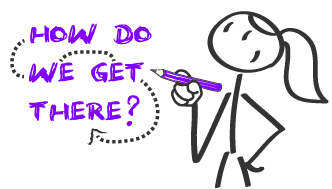
- Lessons break down writing into bite-sized pieces so students confidently move step-by-step to complete their writing assignments.
- Repetition of the basics reinforces the concepts until they are learned.
The proven writing program gives you the tools to teach your students how to effectively plan and write a quality essay from scratch, by equipping them with the writing skills needed to easily write a variety of paper and essays.
ORDER NOW: Complete Curriculum Packages (includes 1 set of Student Worksheets)
Need extra set(s) of worksheets? Need just a set of Student Worksheets for a class? ORDER NOW: Student Worksheets Only
This is a writing program I believe any parent could comfortably teach-even those who call themselves “non-writing” parents. Rebecca is a customer service dream, readily and efficiently responding to any questions I’ve had via email or phone.
Heather Sanders, The Pioneer Woman Homeschool Blog
TWF Curriculum Descriptions: Click Here to Order Now
The Write Foundation has 5 levels available. Each level can be completed in 1 or 2 years depending on your schedule and your student’s maturity and ability level.
Jr. High and High School Level Courses
- Does your student struggle to easily write a well-written paragraph?
- Can your student take any topic and develop into a well-written paragraph?
- Your student may be able to write fairly decent paragraphs, but does his or her writing meet at least high school if not college level formal writing standards?
- Well-written papers are logical and easily developed when students are equipped with the right writing tools.
Level 1: Sentence to Paragraph : (Ages 12 - 14, 6th-9th Grade) Students creatively develop descriptive and more complex sentences. They quickly move to writing basic 1-paragraph and then 2-paragraph compositions using the writing process with a variety of brainstorming techniques and outlines. Samples / Assessment Test / Order Now
Level 2: Paragraph Writing : (Ages 13 - 16, 7th-10th Grade) Students improve and develop their paragraph writing skills, while being challenged to quickly grasp more complex pieces of the writing puzzle, and advancing to a basic 5-paragraph college-level essay. Samples / Assessment Test / Order Now
Level 3: Essay Writing (Ages 14 - 18, 9th-12th Grade) Can your student take any topic and independently write a college-level essay easily and successfully? Students gain a solid foundation of the writing process and writing structure so they can take a complicated subject and make it easy to understand through a well-written essay. Essay Writing gives them the skills to confidently write to please any professor. Samples / Assessment Test / Order Now
Elementary Level Courses
Entry level i & ii: well written paragraphs have well written sentences..
Each lesson uses engaging writing activities and games, which develop and advance students' creative writing abilities and other writing skills.
Does your student struggle to write a basic simple sentence? Does your student need to improve his or her sentence writing skills? Entry Level I: Prepare to Write : (Ages 8 – 10, Grades 2-4) Students begin by writing complete basic sentences and quickly develop their basic sentences into creative, more complex sentences using the 9 foundational parts of speech. Samples / Assessment Test / Order Now
Does your student write simple sentences? Does he or she need to begin developing higher level sentence writing skills? Entry Level II: Creating Sentences : (Ages 9 – 11, Grades 3-5) Students continue developing descriptive, informative sentences from basic sentences using grammar and figures of speech. Students learn to avoid common errors people make when casually and formally writing for school and work. Samples / Assessment Test / Order Now
Eight (8) free lessons, a syllabus for each level, free consultations, articles and curriculum information videos are available on this website.
View the syllabus and try free lessons for each level. Print and use the sample writing lessons with detailed lesson plans if you want to try this writing curriculum before you buy it.
ASSESSMENT/EVALUATION TESTS: Determine the right level for your student(s).
- Placement/assessment tests are available to help you determine the right level for your student. /assessment
- Rebecca Celsor is available for free email (rebecca@thewritefoundation.org) consultation to help you determine which level is right for your student(s).
- Get hands-on writing practice using our writing method before you make your purchase. Two (2) free sample writing lessons per level (8 lessons) with student worksheets, teaching instructions with teacher presentation information included, separate teacher presentation pages, and daily schedules are available on this website.
- A syllabus for each of the 4 levels is also available on this website. The syllabi lay out lesson by lesson the writing skills as they are taught, so you can see what types of writing, grammar and figures of speech are covered in each level.
- Articles are also available on this website to help you determine what levels would be appropriate for your children. /age-levels/
New Interactive Digital Format : You type on the Teacher Presentation as your students write on their worksheets. Now a part of each curriculum package in the Additional Resources.
Intimidated about grading? The Write Foundation offers Online Grading .
I am very happy with the results I am seeing. There is noticeable improvement in my son's writing from week to week. To date, this is the most effective writing curriculum I have used in our 13+ years of homeschooling. If you are looking for simple, hands-off writing lessons, this product is not for you. If you want a curriculum that will produce students skilled in all areas of writing, you need The Write Foundation.
Lorie D., The Midlife Housewife
Recent Articles
- Correcting Run-on Sentences
- How Does Skipping the Writing Process Affect your Writing?
- Graduating Homeschooling
- Is My Child Ready for Formal Writing?
- Teaching Spelling
- Evaluating Homeschool Writing Curriculums
- How to Teach Essay Writing
- Why Most Writing Curriculums Fail (and How to Make Sure your Homeschooler Doesn't!)
- Top Five Reasons Students Hate to Write (and How You can Help!)
- College Preparation for Homeschooled Students
H e is like a man building a house, who dug deep and laid the foundation on the rock. Luke 6:48

View, Print, and Practice the Sample Lessons
(We're here to help you teach!)
Now Available!
Free Reading Lists Get your copy today!
Have a struggling writer? Maybe he hates writing? Does your student just need to learn how to write? Long for teacher-friendly lesson plans you can quickly prepare and teach? Desire a writing curriculum your children will enjoy while learning creatively?
- Complete Lesson Plans
- Free Assessment Tests
- Free Reading Lists
- Organization for Writing
- Checklists & Guidelines
- Brainstorm & Outline Forms
Open doors to writing success!
Contact Rebecca . Rebecca Celsor will answer your questions regarding how to easily teach your child to write.
" Thank you for your homeschool writing program. We are using the Sentence to Paragraph on the two week plan, although we are not quite at that pace, more like three week plan. My daughter LOVES it! And she doesn't like writing. So, rather than make serious sentences with the adjectives and such, she makes them ALL silly and it's like a little stress break for her. She's learning and having fun all "

- Course Selection Assistance
- Suggested Age Levels for Homeschool Writing
- Entry Level I - Prepare to Write
- Entry Level II - Creating Sentences
- Level 1 - Sentence to Paragraph
- Level 2 - Paragraph
- Level 3 - Essay
- Free Curriculum Writing Samples
- Example Teaching Videos
- Online Grading Service
- Writing Skills Reference Folder
- How to Present a Lesson
- Grading Writing
- Key Points for Grading Writing
- MindBenders®
- Order Curriculum Packages
- Order Worksheets Only
- Refund/Return Policy
- Selecting Home School Curriculum
- Writing Preparation
- Writing Development
- High School and Beyond
- Homeschool Co-ops
- Homeschool How To
- The Story Behind TWF
- Why Another Writing Curriculum?
- Copyright Information

He is like a man building a house, who dug deep and laid the foundation on the rock . Luke 6:48
Dedicated to equipping God's children with the ability to communicate His Truth to the world.
- Teaching Tools
- Curriculum Ordering
- homeschool writing curriculum
- home school writing samples
- Mind Benders®
- Online Grading
Copyright © 2021 TheWriteFoundation.org
web site design - evolvethebrand.com

- Clear Water Press
- Writing Programs:
- Cover Story
- One Year Novel
- Other Worlds

Any student who loves stories can love writing!
Quick video overview.

We understand why both eager and reluctant writers are frustrated by traditional writing assignments.
With the one year adventure novel your young writer will:, complete their own novel, understand how stories work, enjoy a creative community and supportive resources, young writers deserve a guide who will show them the ropes without stifling their creativity..

“Never have I seen a more in-depth, engaging, challenging and altogether FUN writing curriculum than this one.” – Denise in Washington
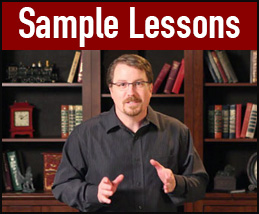
- About the Curriculum
- Syllabus with Lesson Table
- Cloud Streaming Benefits
- Your Instructor
- Reviews & Testimonials
- Sample Lessons
- Summer Workshop
- Student Novel Contest
- Homeschool Curriculum Conferences
- Cloud Video Sign-in
- Online Quizzes
- How to Watch Webinars
- How to Join the Forum
- Student Forum Sign-in
- Good Books List
- Curiosity Saved the Cat
- Ask Us a Question
- Order Materials for a Group

Homeschool Writing Curriculum
Selecting a writing curriculum for your homeschool.

Home > Homeschool > Writing Curriculum
With many curricula and programs claiming to transform young writers into budding young authors, it is crucial to gather information about choosing a writing curriculum before reaching a decision. Making a choice can be daunting, but it ultimately comes down to picking a homeschool writing curriculum tha compliments your family's lifestyle, routine, learning style, and academic priorities.
We're here to offer our advice on different aspects you should consider when choosing the right homeschool writing curriculum for your child, including:
What is a homeschool writing curriculum?
The role of a homeschool writing curriculum, benefits of a homeschool writing curriculum, challenges of a homeschool writing curriculum.
A homeschool writing curriculum can be a single program or a set of educational materials used to teach writing skills. These resources can be digital or physical and include lessons, activities, games, and exercises that cover different aspects of writing such as:
- Composing sentences
- Developing grammar skills
- Building a rich vocabulary
- Writing stories
- Other creative writing (such as poetry )
There are many reasons for using a homeschool writing curriculum. Many parents and guardians count on these curricula to support their child's writing skills development in a home-based learning environment, especially if they have no prior teaching experience. Homeschool writing curricula can also be tailored to specific grade levels and a child's unique learning style, which is often a priority for homeschoolers.
Teaching writing can be a challenging task, but a homeschool writing curriculum will help simplify this process. It offers structure for the parent or guardian who's taken on the teaching role, helping them feel supported while delivering writing lessons. This takes way the pressure of solely trying to make writing engaging for children, while ensuring skills development.
Writing plays a big role in a child's overall development, boosting communication, critical thinking, and confidence from an early age. These skills are valuable academically, professionally, and personally. By choosing a writing curriculum in your homeschool, you ensure that your child not only excels in writing, but also in reading , grammar , spelling , and vocabulary , as these skills are interconnected.
We understand that families enjoy the freedom that homeschooling offers. In a way, using a homeschool writing curriculum that works seamlessly with your routine can provide even more time freedom, especially to parents and guardians, as all lessons and supplemental activities are all planned for you.

A homeschool writing curriculum offers a range of benefits, not only improving a child's writing skills but also playing a crucial role in their overall educational and personal growth. There are a host of benefits to be had for the parent or guardian too!
Benefits for the child:
- Enthusiasm: The right homeschool writing curriculum can make your child feel genuinely excited to learn!
- Confidence: Using a writing curriculum ensures that your child is constantly working toward improving their skills, which often results in boosting their confidence and minimizing disagreements over completing writing assignments.
- Creativity: The right homeschool writing curriculum should inspire your child to explore and express their thoughts and ideas.
- Skill development: Developing your child’s writing skills can help them not only in other subjects they learn but also in their future careers. Being a strong writer will essentially help them be better at other language arts-based topics, like reading, spelling, and grammar.
- Preparation for further education: Being a strong writer will be a fundamental benefit when they reach high school level.

Benefits for the parent:
- Structure: It provides the option to have an organized framework for teaching writing, making it easier to deliver lessons efficiently. You can also decide how and when you use this structure.
- Consistency: A homeschool writing curriculum offers progress consistency and covers all the essential aspects of writing.
- Versatility: Choosing a curriculum that suits your child's learning requirements removes the need for you to create customized plans.
- Clear objectives: By following a curriculum, you can be confident that your child is working toward clear learning goals, and that the curriculum's content is designed to achieve those objectives.
“My kids love this writing curriculum!! They are very artistically inclined and this is right up their alley! They are learning how to write while drawing animals and making stories. I love the feedback from the zookeepers who help edit the kid's work! I just really think the program is really fun and well put together. The kids love all the games and they are learning language arts at the same time - yay!” - Jennifer, homeschool parent, US
Homeschooling often presents its own set of challenges, and implementing a homeschool writing curriculum can contribute to this. Some homeschooling families encounter common obstacles when selecting a writing program:
- Motivation: Keeping a child motivated during their writing lessons can be a struggle. It’s important to find an interactive writing curriculum that will keep them engaged whilst also improving their writing skills.
- Resource availability: Accessing a curriculum can be difficult for some homeschool families. Finding a curriculum that will be easy to access for multiple children and doesn't require a lot of additional materials is very helpful. Online programs are a great remedy for this, as they are all in one place and can be accessed anywhere.
- Time management: Implementing a structured curriculum requires time. This can be challenging if the homeschool parent has a lot of responsibilities to juggle. Choosing a curriculum that creates the lessons and assesses the work for you can help combat this issue.
- Balancing creativity with structure: It’s helpful to have a framework to follow, but many homeschool families opt for a more flexible approach. It’s important to find a homeschool writing curriculum that aligns with your preferences. This may involve selecting a curriculum with a less rigid structure, offering a more adaptable approach that you can customize according to your preferences and requirements.
“My son has always struggled with writing due to some obstacles he has to work to overcome and LOATHED any writing assignments and even shorter practice assignments. Night Zookeeper has been the key to getting him engaged and excited to write. He will spend a good deal of time playing, and actually LOOKS FORWARD to the writing!” - Lanie, homeschool parent, US
Why choose Night Zookeeper
Choosing a homeschool writing curriculum can be tough with so many options available. It's important to pick one that fits your needs and preferences. Keep in mind that if your child doesn't enjoy what they're learning, it can negatively affect their progress and make homeschooling more challenging and stressful for you as a homeschool parent.
Night Zookeeper is used by many homeschoolers as their homeschool writing curriculum. The program has been designed to inspire young writers and fuel their creativity. As writing is a crucial skill in any child’s educational development, our mission is to ensure it is an enjoyable and engaging experience for children. Our language arts program motivates children to improve their writing skills while they're having fun.
Our program can be used as either a full curriculum or as a supplemental resource. Night Zookeeper offers a variety of ways to cater to children of all writing levels, from those who struggle to those who have a passion for writing.
Here's why Night Zookeeper is a great choice for your homeschool writing curriculum:
- Writing features: From writing lessons to inspiring writing prompts, your child will be spoilt for choice with exciting work they can do on our program. Many of the activities will help your child with sentence structure, persuasive writing , essay writing, writing strands, and much more.
- The storyline: Our program offers a unique approach to teaching writing skills. Through interactive online adventures, students become "Night Zookeepers" in our virtual Night Zoo. Your child’s writing skills will be put to the test and improved when they navigate through the Night Zoo map, playing all the games and activities to further their progress.
- It’s FUN: We make learning to write genuinely fun for kids by turning it into an interactive game. They’ll feel inspired to explore their own writing potential through the lessons, games, and activities throughout the program. It’s so fun, they won’t even realize they’re learning!
- Full English Language Arts Program: Night Zookeeper is built around a comprehensive language arts curriculum . Alongside writing, the program covers reading, spelling, grammar, and vocabulary. Our program can also be your homeschool reading curriculum that will complement your child’s progress made in their writing curriculum.
“Night Zookeeper is an excellent program that I am so glad to have found for my 7-year-old son. Before Night Zookeeper he was very intimidated by writing, now he plays Night Zookeeper almost every day. Thanks to Night Zookeeper he has learned about different types of writing as well as works on improving his spelling, grammar punctuation, and more. This game has blown us out of the water with how much he has been able to learn while having fun in the process.” - Noel, homeschool parent, US
Try Night Zookeeper

Writing doesn't have to be a tedious subject to teach in your homeschool. Night Zookeeper transforms the process of learning to write into an enjoyable experience for your child by making it genuinely fun. With numerous writing games designed to enhance your child's writing skills, you'll witness their love for writing blossom every day.
Sign up today and get a 7-day free trial!
Related articles
- Elementary Writing
- Writing Games For Kids
- How To Get Your Child To Love Writing

Make Reading & Writing Fantastically Fun!
- Award-winning reading & writing program for kids
- Improves spelling, grammar, punctuation & vocabulary
- Over 1,000 different learning games and activities

Homeschool Writing Curriculums
Your guide to the best homeschool writing curriculums and learning ideas.
Top 5 Homeschool Writing Curriculums - Voted by YOU!
Our Homeschool Writing and Grammar Curriculum Course guide is based on real feedback and input from people just like you—homeschool parents, moms, and dads.
We have received thousands of votes from our homeschool families and have our top 5 winners for elementary, middle and high school programs.
Click below to download your FREE copy!
Top 5 Elementary Writing Curriculums
- Institute for Excellence in Writing (IEW)
- Easy Grammar
- Language Lessons for a Living Education
- Fix-It Grammar from IEW
- Rod & Staff
Learn about our top five elementary school homeschool writing curriculums ranked by our homeschool family community—people just like you and me— who have experienced these curriculums first hand.
This top five guide is a helpful roadmap to help you navigate the best of the best courses on the market today whether you are seeking information about homeschooling, are a new home school educator, or are a successful and experienced homeschool educator.
Top 5 Middle School Writing Curriculums
- Writing Strands
- Essentials in Writing
Writing curriculum programs for middle school homeschooling are not a one size fits all; and, as a home educator, it is ultimately up to you to make the best decision.
We have pooled our resources and asked our homeschool audience of teachers and students to come up with the top 5 middle school writing curriculums to help you on your journey.
Top 5 High School Writing Curriculums
- Analytical Grammar
- Jensen's Grammar
- BJU Press Grammar & Writing
Research papers, essay writing, grammar, and communication are several of the critical writing skills that are learned in high school. What is the best writing curriculum for home school high school students?
We have our top ranked 1-5 publishers and providers that will help you match up with a curriculum that will be a perfect fit for your home-based student.
The Institute for Excellence in Writing (IEW) is an easy, fun, flexible, and structured writing curriculum that has a lifetime guarantee.
IEW’s framework for structure and style will give your student the tools he or she needs to excel in all areas of writing starting with elementary age programs all the way through high school.
According to many home school educator reviews, Easy Grammar is an easy and effective tool for home school families. The students are able to easily retain the concepts because the instructions are to the point and in an easy to understand format.
Students that have struggled with grammar in the past find Easy Grammar’s teaching method to be a no-stress, fun way to learn and feel successful.
Essentials in Writing offers a complete writing curriculum for grades 1-12 that includes text books and video instruction.
One of the many benefits of Essentials in Writing is that it is student led and there is little prep time for the teacher (parent) for each lesson.
Also, Essentials in Writing offers online classes for college prep as well as creative writing.
Analytical grammar offers a middle and high school homeschool program focusing primarily on grammar. The other two key components are punctuation and usage.
This course offers a flexible learning style and can be used for students who are struggling in grammar as well for more advanced students.
Teachers love this course and find the teacher’s guide to be very thorough and easy to follow.
MasterBooks Writing’s writing program, Writing Strands, is a composition writing course that incorporates grammar lessons and Bible-based content throughout the course.
MasterBooks writing offers course from Kindergarten through 12th grade.
There are several other wonderful writing and grammar curriculums for home school students like One Year Adventure Novel for high school writing. Many of the curriculums are broad based and cover a wide range of topics.
There are also other writing and grammar curriculums that drill down to a specific writing topic like Handwriting without Tears for elementary students.
Homeschool Writing Resources
The power of developing quality communication skills | 185.
We talk a lot about Heart Schooling—or discipleship-focused homeschooling. So, this week, David and I are going to look specifically at what Heart Schooling really entails and give you some ideas to start putting some of these concepts into action right now.
Free LIFEPAC Writing Lesson from AOP
Writing worksheets can supplement any child’s education to help build some of the fundamental skills to become a better writer. Get your student writing and
Top 10 Homeschooling High School Writing Curriculum Choices For 2021
Writing is very personal. When we share our efforts, we are hoping to evoke an emotion, stir a reaction, and touch your life in some
Top 10 Homeschooling Middle School Writing Curriculum Choices For 2021
Writing curriculum programs for middle school homeschooling are not a one size fits all; and, as a home educator, it is ultimately up to you
Top 10 Homeschooling Elementary Handwriting Curriculum Choices For 2021
One thing that binds every homeschooling subject together is the need for handwriting. Handwriting is one of the core homeschooling subjects we need to teach.
Top 10 Elementary Writing Curriculum Choices For 2021
Writing curriculum programs are not a one size fits all; and, as a home educator, it is ultimately up to you to make the best
Top 10 Homeschooling Elementary Handwriting Curriculum Choices
*This page may contain affiliate links. For more information please see our disclosure page/privacy statement for more information. One thing that binds every homeschooling subject
Help Your Child Unleash their Creativity in Writing
Martin Luther said, “If you want to change the world, pick up your pen!” Harriet Beecher Stowe proved this with her compelling novel in the
6 Ways to Inspire Reluctant Writers
For many homeschooling parents and students, writing is a difficult and dreaded subject. “If you and your child are reluctant writers, there are ways to
Overcome Teaching Journalism Fundamentals at Home
Journalism, you probably have some pretty set ideas of what it is, and why you can’t teach it as a homeschool class. Perhaps you think
Thanksgiving Ideas to get Creative Writing Flowing
Thanksgiving writing prompts for middle school students offer a variety of ways to sneak a little bit of school into your hectic holiday-schooling days. Use the holiday excitement building in your home to make writing assignments more exciting as well.
Season of Autumn Inspires Creative Writing
What to write… Does your student have a passion for writing? Are writing assignments met with groans of protest? These fall writing themes will foster
Tips for Writing a College Entrance Essay
Applying to colleges can be a long and exhausting process. Most schools require an application, standardized test scores (the ACT or SAT), high school transcripts,
Clever Writing Prompts for Elementary Students
During the summer months, it is very easy to overlook skills such as reading, writing, and math. Sticking with summer sharpeners at least 23
Encourage Your Children In Their Writing
Encourage Your Children In Their Writing While I am not a homeschooling parent, my parents have homeschooled me from the beginning. My dad taught
Join TTD365 for Even More Homeschool Writing Resources!
Teach Them Diligently 365 is an online homeschool community and homeschool resource library designed to help you make the most out of your homeschool experience.
TTD365 Audio Resources: Writing (Members Only!)
The tension between self-care and selfishness.
I want to delve into a topic that I suspect resonates deeply with many of you: the tension between self-care and selfishness. We live in a world that often expects and even demands endless giving. And if you are a Christian, prioritizing your well-being can sometimes feel like an act of selfishness. You might feel […]
A Happy Gut Equals A Happy Mood!
Before we dive into having a happier mood, I want you to know that I have a special invitation for you at the end of this email so make sure you don’t miss it!Did you know that 80-90% of your serotonin is produced in your gut? You know, that BRAIN chemical that helps us to […]
Trauma and Our Body
Many women deal with health concerns like anxiety and irritability, hormone issues, foggy thinking, poor sleep and low energy. But most women don’t connect their symptoms with past or even current trauma that they have experienced.We think of trauma in terms of war, abuse, horrific accidents and natural disasters. But trauma is anything that overwhelms […]
Why Am I So Tired?
Insufficient sleep. Adults need 8 hours of sleep per night. This isn’t just the hours that you are in bed, but the time that you are sleeping. If you struggle with sleep, I have several recommendations to help you. Avoid blue light from screens for 1-2 hours before sleep to promote better melatonin production. Dim artificial […]
Your Body Is Speaking
Your body is speaking.Are you listening?It is common to feel frustrated with your body when it doesn’t act the way you want it to.You want to feel energized and instead you feel fatigued.You want to sleep deeply and instead you wake in the middle of the night and can’t go back to sleep.You want your […]
Productive Rest: You Need It!
Whew! You made it through the school year! Congratulations, Mom!How do you plan to spend your summer?Regardless of whether you are going to school right through, travel for much of it or spend your days at the pool, can I encourage you to be intentional about resting this summer? I’m not suggesting laziness. I’m suggesting […]
You Can Help Develop Your Child’s Critical Thinking Skills
Critical thinking is a commonly used term in homeschooling communities, but why is it so important? What makes it such a crucial skill to master, and how can you assist your child in developing it? Let’s explore the various resources and techniques that can aid in the cultivation of this vital ability. Speaker Sharon Fisher […]
Will it Bring Your Children to Christ
Speaker David Nunnery Listen Now
Why your child needs STEM education (and how to give it to them!)
Computer literacy, once considered a competitive advantage, is now a survival skill. STEM education helps develop valuable 21st century skills like critical thinking, logical reasoning, and communication. Even those not interested in a career as a programmer or engineer will benefit from developing these skills. This session will show how STEM education helps students in […]
Why the world still needs classical, Christian education
We will look at the current cultural identity crisis and identify a few ways that classical education strengthens faith, examining how timeless materials and habits can address timely issues. Speaker Jennifer Courtney Listen Now
Why Teaching Boys to Read and Spell is Different Than Teaching Girls!
Lessons from the trenches! Learn the scientific reasons why your boys learn differently. We will dive into practical tips for teaching boys how to read and spell. Discover why many of the common strategies don’t actually work (and it’s not what you think!). We will also review “what to do” when teaching boys to read […]
Why Choose a Christian College
A successful transition from homeschool to college is such a vital and important decision. A homeschool education has built a foundation of faith, and when a young person learns to love the Word of God and develops a passion for serving others, they will have the perfect roadmap for a great future. Join Brian Tanedo […]
What’s Going On With Your Middle Schooler and How to Prepare Them for High School
As our children begin to mature, they are experiencing drastic changes: physically, intellectually, emotionally, and even spiritually. It is a natural (and good!) process of transitioning to adulthood. As homeschoolers, we have the unique ability to encourage those changes to help them along the way. They will need more sleep; they will need more time […]
Unhurried Homeschooling: Scheduling 101
Do your homeschool days feel like an endless exercise in treading water? Is there constant animosity between you and Monday morning? Do you feel like a hamster on a wheel, running at full speed, but getting nowhere fast? Perhaps you need to re-order your days so that your school schedule works for your home, and […]

Understanding Your Artistic Child
Artistic children are often misunderstood by their parents. This causes stress to both the child and the parent. Often a parent doesn’t know how to relate to them. Instead of blooming their child, they are discouraging them. Because Sharon Hofer is an artist herself, she understands the ups and downs of her personality. More than […]
Understanding the Phases of High School
Want to know what your teen should be focusing on to prepare for college and a career? In this session we will break high-school down into four crucial phases that build on each other, and give you the tools to determine what should be the priority for this next year, how to be career focused […]
Tollers and Jack: The Extraordinary Friendship of J.R.R. Tolkien and C.S. Lewis.
Come and hear homeschool graduate and author of the seven books in the “History Bites” series Solomon Schmidt! He will teach about the amazing life and works of one of the world’s most beloved writers, J.R.R. Tolkien, author of The Hobbit and The Lord of the Rings series. You will be inspired as Solomon shares […]
To Court, to Date or to Become a Eunuch
Speaker Catherine Zoller Listen Now
This, We Believe
Dads and moms, in all the busyness of life and swell of expert advice, we’ve forgotten the fundamental truths of homeschooling and family. In short, we’ve forgotten why we do what we do. We have plenty of “how tos” but have forgotten the “why tos” and it evidences itself in our lack of joy of […]
The Underground History of Education, Part 2: The Bad. Synopsis
In The Underground History of Education, Part 2, Robyn answers the question, “What went wrong?”, telling the tale of the destruction of the highest literacy level in human history. Speaker Robyn van Eck Listen Now
The Underground History of Education, Part 1: The Good.
Do we really have the pagan Greeks and Romans to thank for education? What was education like before modern education? What is the true story of education? Speaker Robyn van Eck Listen Now
The Titus 2 Woman – Is She Relevant for Today?
In the book of Titus, Paul instructs Titus about what to teach the older men of the church. He tells us that the older men are to then teach the younger men and the older women of the church. Based on what they learned from the older men, the older women are then commanded to […]
The Stricken Earth
The earth is wearing out just like the Bible said it would. The earth is undergoing changes that can beseen everywhere. Why do volcanoes erupt? Why are there earthquakes? Why do rocks fall from the sky? What arecomets? Why are there unique weather patterns? Is the earth warming? If so, why? Why are all continents […]
The Serpent!
The fear of snakes is understandable. Right at the outset of history, the Bible records an astounding Speaker Mike Snavely Listen Now
The Power of Doing
The Power of Doing is tailored for those eager to boost their health, unleash creativity, and set up successful family routines. This workshop focuses on cultivating a culture of ‘follow-through’ in every family aspect. You’ll learn strategies for building enduring success habits, improving time management, and effective goal setting for both personal and family accomplishments. […]
The Pied Piper: How media is leading our children astray and what you can do about it
This session will look at the impact that film, literature, and music can have on our children. With 30 years of experience in the field, Heather has an insider’s view into the hidden goals of the industry and how they package information in a way that can change our perspectives little by little. She calls […]
The Once-a-Year Plan: Taking the Overwhelm Out of Homeschool Planning
So you’ve got a box full of unused planners and half-erased lesson plan books. Trust me, you’re not alone! From curriculum to the daily schedule, there is a simple way to plan your whole school year in just ONE week. Reclaim your Sunday nights and your sanity by joining veteran homeschool mom, Kim Sorgius, for […]
The Mystery of the Dinosaurs
This session provides a biblical alternative to the standard explanation for these creatures, and answers Speaker Mike Snavely Listen Now
The Middle East for Teens and ‘Tweens
How do you explain war in the Middle East to teens and tweens? What resources do you have for making sense of the headlines? How do you point students toward a biblical worldview of current events? Opinions will vary on the status of the Middle East and the proper response to it. But you can […]
The Horror of the Flood
Could you explain where the water for a world-wide flood would have come from, & where it all went afterward? Many Christians can’t. Understanding the flood (the purpose, causes, aftermath and evidence) is very important to an understanding of a biblically sound creation model. This session covers the basics of this event, and also includes […]
Sign up for Updates
Event Details
Homeschool Tools
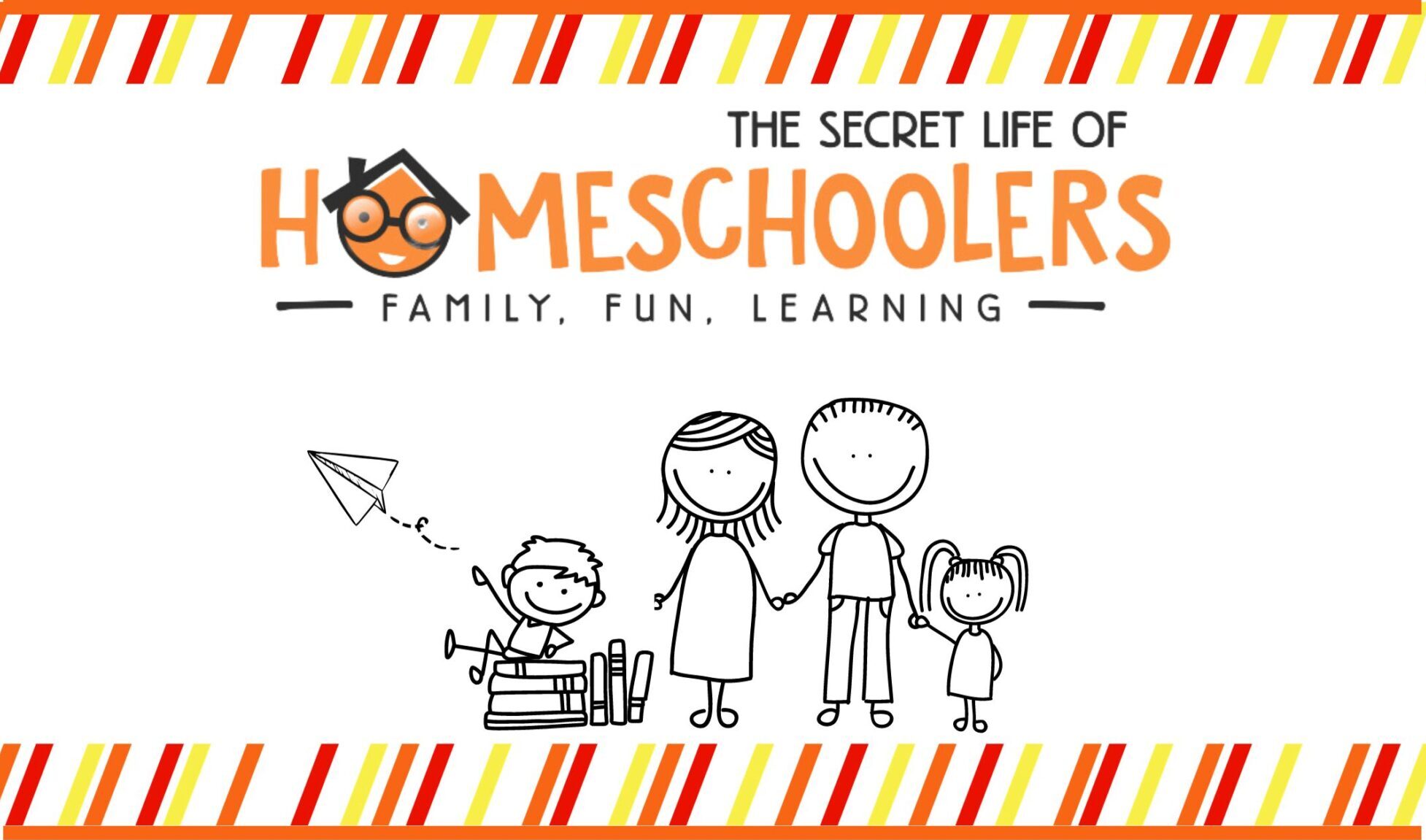
Cover Story: A Homeschool Creative Writing Curriculum That is So Much Fun
- Post author: Sharon
- Post published: July 5, 2022
- Post category: Curriculum and Resources / Language Arts
- Post comments: 3 Comments
Disclosure: I received this complimentary product through the Homeschool Review Crew .
I was so excited to have the chance to review Cover Story Cloud Set by Clear Water Press for the Homeschool Review Crew. My daughter is a writer, and we have been eyeing Clear Water Press courses for a couple of years now. So, when this review came up, we jumped on the opportunity to review this homeschool creative writing curriculum.
Table of Contents
Cover story cloud set- homeschool creative writing curriculum, the teacher’s guide for this homeschool creative writing curriculum, videos and student book, the remarkable journal of professor von steuben, who would like cover story, who might not prefer this homeschool creative writing curriculum, my daughter’s thoughts on this creative writing curriculum.
So, what exactly is Cover Story?
Cover Story Cloud Set is a homeschool creative writing curriculum for grades 6-9 . Students work on language arts skills by creating their own magazines. That is why it is called Cover Story!
Through a wide range of writing assignments, kids create a magazine on a topic of interest. Kids create short stories, poems, reviews, editorials, and more.
When the year is over, kids have a completed magazine!
It is a very clever way to work on writing and grammar that is engaging for kids.
For the review, we received physical copies of a Student Book, Teacher’s Guide, and The Remarkable Journal of Professor Gunther von Steuben.
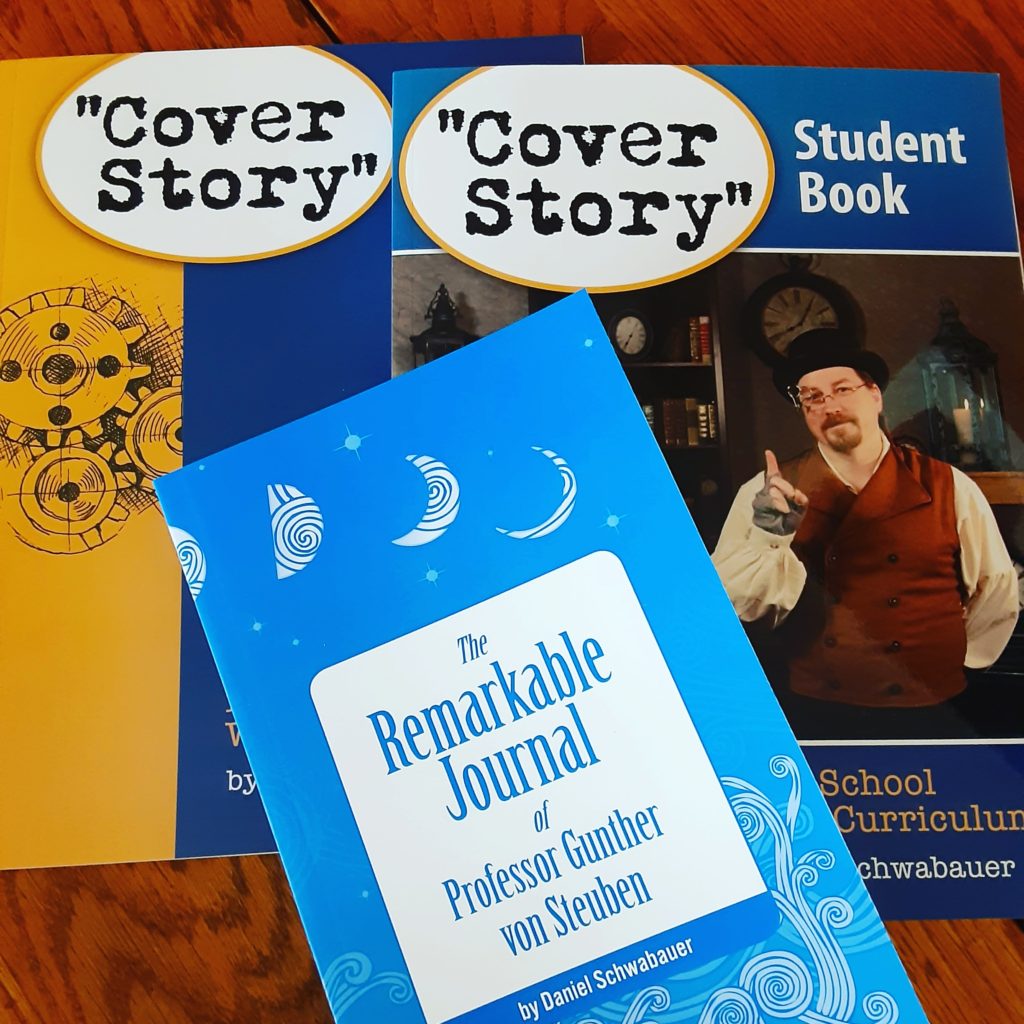
We received 12 months of online instructional videos along with the soft-covered books. However, if, for some reason, you don’t finish it in 12 months, you can purchase an extension to the cloud videos. Because we all know that life happens, and we might need extra time.
The course is taught by Daniel Schwabauer, a published author, and editor for Crosswind Comics. Plus, he has been involved in many areas of writing, from stage plays to non-fiction ghostwriting. So he has a depth of knowledge and a whole lot of enthusiasm. Also another cool thing is that Mr. S created this program for homeschoolers!
A Look Inside Cover Story
So, that was a quick overview of what you get with Cover Story. Now, let’s look at this homeschool creative writing curriculum a little more closely.
When I received Cover Story, the first thing I did was look through the Teacher’s Guide. I wanted to see the details of this program.
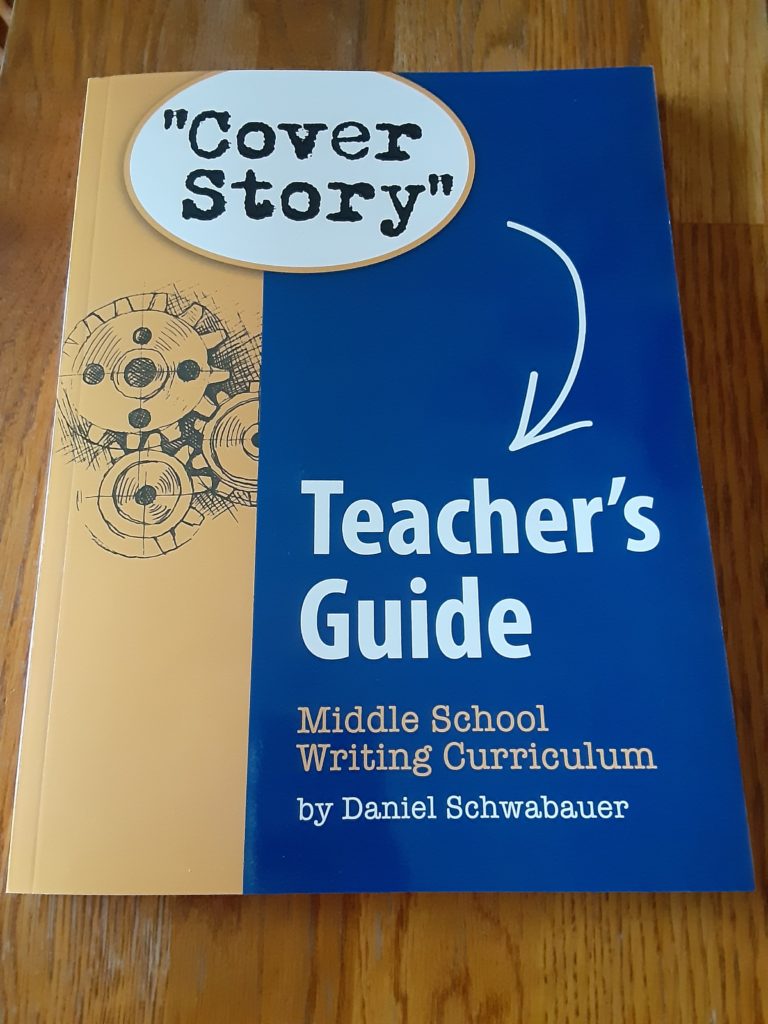
Boy, I was VERY impressed with the teacher book . The instructions are very well laid out and detailed!
The teacher’s guide provides:
- Brief description of the program.
- How to teach the course: video lessons with workbook assignments 3 days a week and work in journal 5 days a week.
- One section gives you a heads up on things you will need to do to prepare for specific lessons.
- Suggestions for grading assignments, journal entries, tests, and optional grammar lessons.
- Run time on the videos.
- An outline of all the coursework.
- Weekly lesson guides.
- The reading materials for the Assigned Reading for the course.
- Answer key for lesson activities, unit tests, and grammar work.
- Super helpful sheets to keep track of student grades to help tally up their score at the end of the course.
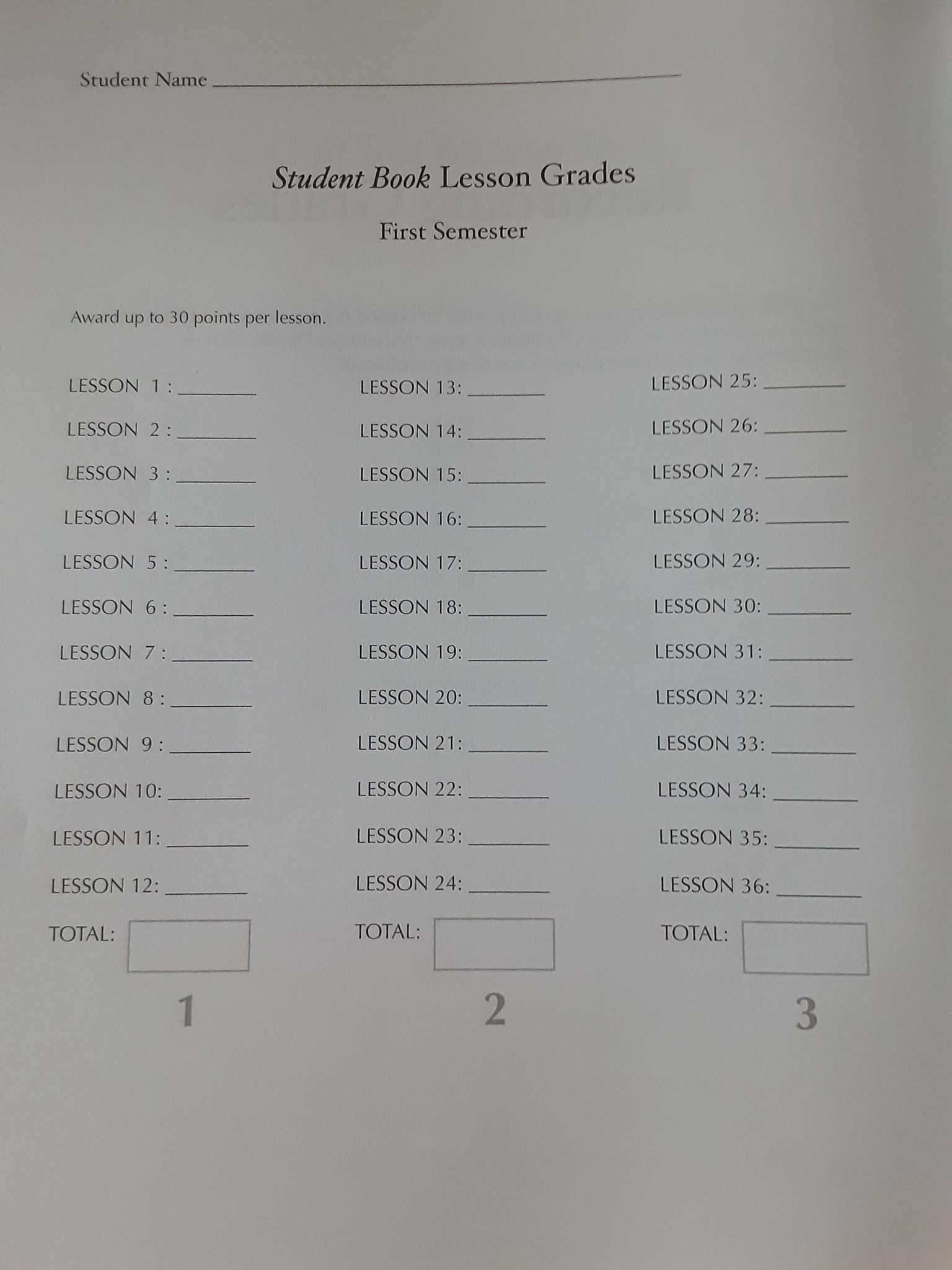
I can’t express how valuable this teacher’s guide is for planning and grading your student. I was not intimidated by this homeschool creative writing curriculum. It is so well laid out that it makes it simple to assign work and let the videos and student book do all the work!
Videos, Student Book, and Journal:
Now, let’s look at the heart of the program: the videos, student book, and journal.
The course is laid out as follows :
- Unit 1- Works on grammar and the foundations of good writing. It also helps kids pick a theme for their magazine and begin writing things like reviews.
- Unit 2- This unit covers poetry, interviewing, and perspective.
- Unit 3- Students will work on editorials and short stories.
- Unit 4- Discusses the Four layers of meaning, writing personal experiences, humorous pieces, and chronological narratives.
- Unit 5- Works on an advice column and more work on short stories.
- Unit 6- Finishes with more poetry work and completing the magazine with layout and publishing.
With each assignment, students watch the online video (most are 6 to 16 minutes long), complete that day’s Student Book assignment, and then do work in the journal.
Some of the assignments have assigned readings. These readings are found in the student’s book and teacher’s book, which is very convenient.
The best part of this creative writing curriculum is the online videos. The videos are engaging for kids. Mr. S truly speaks to the kids and explains things well.
Each video starts with a skit. The skits are pretty entertaining. After the skit, there is a recap explaining how it ties into the topic for the day. Lastly, the video then gets into the lesson.
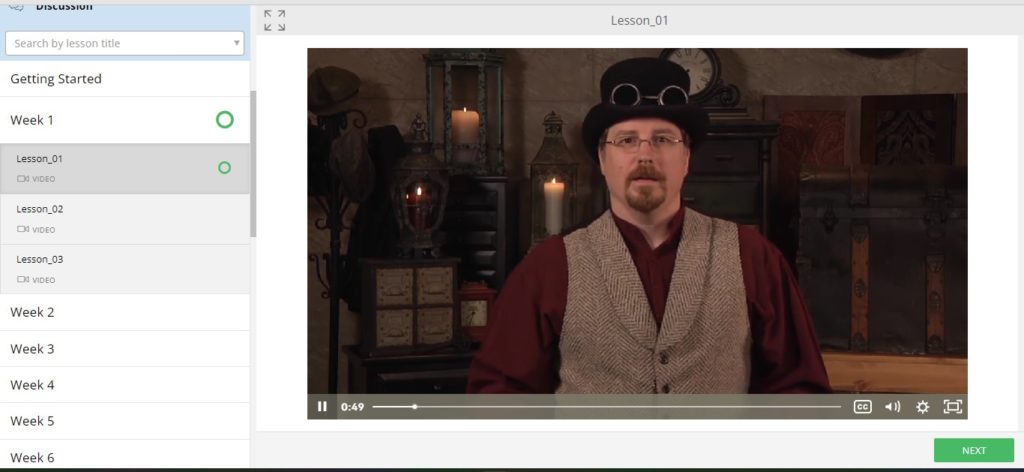
After each video lesson, the kids work in their Student Book. These assignments reinforce what was taught, and kids will work on writing assignments for their magazine.
At the end of the core creative writing curriculum is a set of 12 grammar lessons. These are optional, though I find them very helpful for making this a complete language arts program.
The instructor does an excellent job explaining grammar. His focus on grammar is on the practical use of grammar in writing and how it works. He doesn’t want kids to get hung up on specific names of grammar terms.
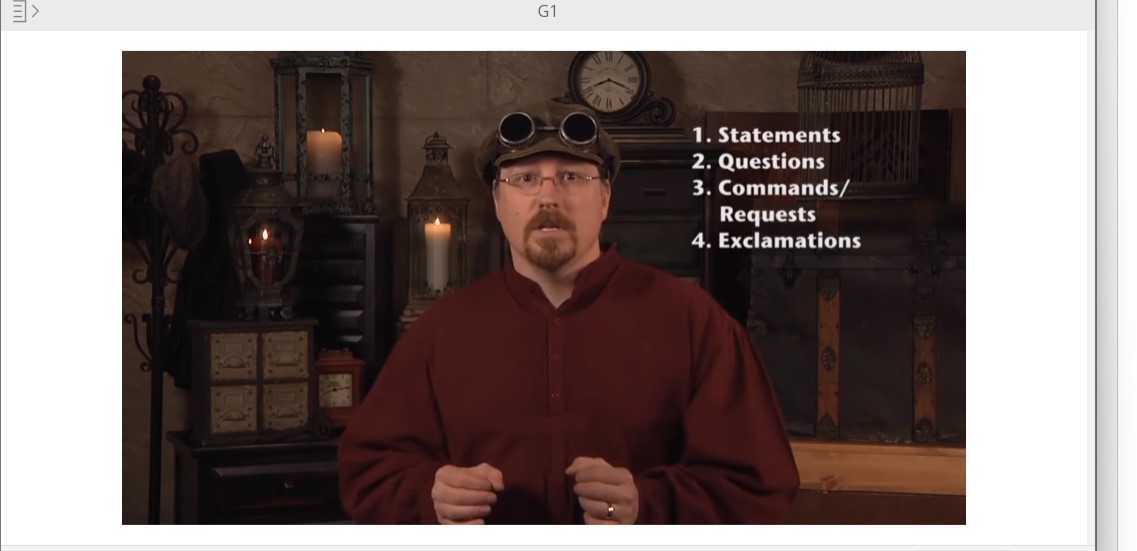
The lessons do a great job of making sure kids don’t feel intimidated by grammar. In the end, Mr. Schwabauer wants kids to learn how to find answers for grammar, so they can communicate clearly. By making grammar less intimidating, it makes grammar fun and easy.
For example, the video teaches a whole class on sentences in one grammar lesson. The instructor explains the formal names for the types of sentences but breaks them down into common terms for kids. Then, he uses a story to explain why these terms have such formal names, making it more fun and exciting.
One of my daughter’s favorite parts of this writing curriculum is the journal. The Remarkable Journal of Professor von Steuben is a journal on this fictional character. Through his journal entries, students receive writing prompts that help them work on writing techniques in a unique and meaningful way. In addition, students write in this journal from the Professor’s perspective, allowing them to create their own story of who this man is and how his story will end.
The journal entries are short assignments. For example, in the first unit, kids write questions 5 days a week. Through this exercise, students are learning to ask good questions, meaningful questions.
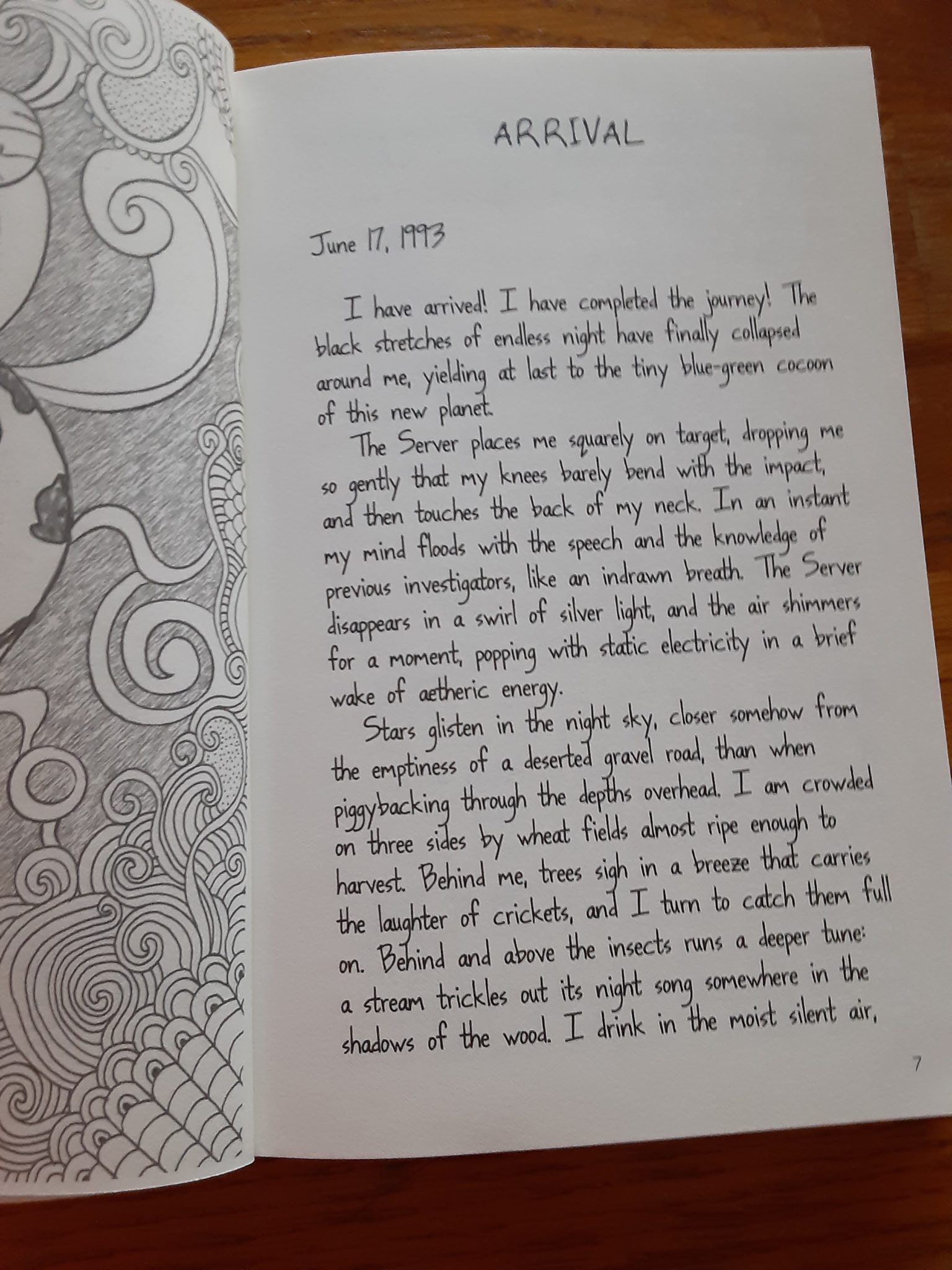
Later, kids will write paragraphs, dialogue, and more.
Again, this is a clever way to engage kids in writing and thinking about writing.
At the end of each unit, kids take a basic multiple-choice question test. They are a quick check-in with their understanding of the material covered. For example, in Unit Test Six, one of the questions is as follows:
To keep your audience engaged, give them story events that produce
A. expectation and surprise. B. surprise and shock. C. relevance and shock. D. exaggeration and timing.
The questions are simple and to the point.

So, who would like Cover Story?
- Busy Moms – With Cover Story, you have little prep work, and the videos teach writing for you. As a parent, you only need to spend some time every four weeks grading work.
- Reluctant Writers – If you have kids that are reluctant writers, this program might get them engaged in writing. There is a purpose to writing: creating their own magazine. The videos may engage them, and the laid-back approach to grammar may be appealing.
- Independent Learners – This program is perfect for kids that like to work independently or to use with kids you want to start teaching to work independently.
- Kids that love creative writing – As I have found with my daughter, this is a lot of fun for kids that love creative writing.
- Enjoy a variety of writing styles – Because kids are creating a magazine, they are learning various writing techniques and styles. Therefore, they work on more than just telling a story.
Is this program for everyone?
No program is for everyone.
However, Cover Story might not be for your family if:
- You like to be very involved in teaching writing . Of course, you could watch and discuss the videos with your kiddos, but this program does lend itself to more independent learning.
- Kids that have no interest in creating a magazine will probably not like this .
- If kids don’t like journaling, they may not like this program . However, there are ways you could modify this.
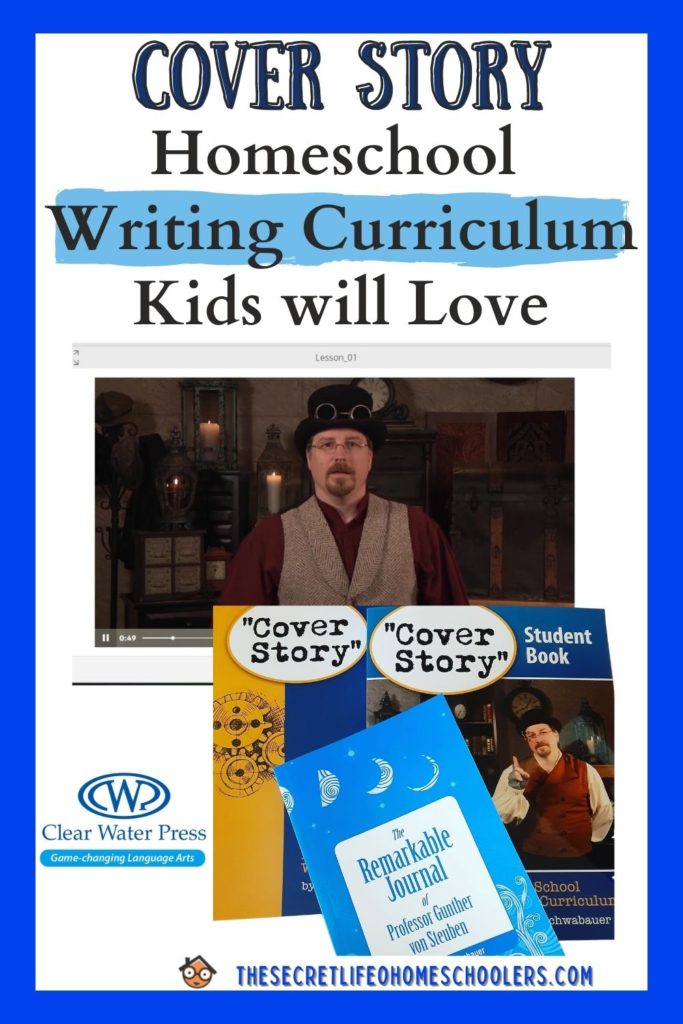
Thoughts on This Homeschool Creative Writing Curriculum
As you can probably tell, we like this creative writing curriculum. This is a great way to teach writing in a meaningful and engaging way. I love finding authentic learning opportunities, and Cover Story does an excellent job creating this for middle school kiddos.
One thing I love about the program is how easy it is to use. My daughter could easily work on this independently. It has an easy schedule to follow and great tools to help with grading your kids. Plus, I REALLY appreciate the workbook pages to record grades on. Record keeping is a weakness for me, so the pages help a lot.
I also like that Mr. Schwabauer recommends grading at the end of a unit. It might sound strange initially, but since this is a creative writing program, he feels kids might become discouraged. Also, as he mentions, if kids see red marks all over their work, it may stifle their creativity on their next assignment. So, do the correcting at the end so kids can write freely.
My daughter has said she wants to finish the program and continue working on it throughout the summer. She finds the video lessons fun and helpful. Plus, she really enjoys the journal.
When it comes to writing, my daughter is kind of picky with writing programs. My girl has self-published one book and is working on another. She looks for writing programs to help her become a better writer. For her, writing isn’t something to get through and move on; she really wants to improve and gain as much knowledge as possible.
Overall, my girl feels she is getting a lot out of this program. She loves the idea she creates her own magazine on gothic horror of the 20 th century. She is thinking of all the possibilities of things to write about (she is fascinated by H.P. Lovecraft and other early 1900s authors like him).
Cover Story Cloud Set from Clear Water Press makes a fabulous homeschool creative writing curriculum. We loved it. Now check out other reviews from fellow Homeschool Review Crew members. Click the banner below to learn more.

You Might Also Like
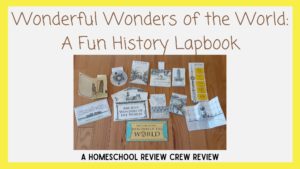
Wonderful Wonders of the World: A Fun History Lapbook
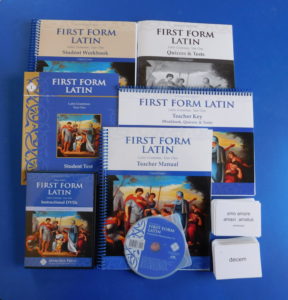
First Form Latin- Latin Curriculum for Grades 5+

Our Homeschool Curriculum for 5th and 7th Grade
This post has 3 comments.
I have heard great things about Cover Story, and your review certainly confirmed it! I can’t want to see the progress of your daughter’s magazine!
We are using this curriculum this year, but my daughter isn’t liking the journaling. Do you find it necessary to do the curriculum?
Hi Melissa, I think kids could probably still do the curriculum without the journal. My daughter said she could still do the curriculum without the journal.
Leave a Reply Cancel reply
Privacy overview.

We make teaching writing easy and enjoyable.
Our materials provide clear, step-by-step instructions for teachers and students, making the process of learning to write effective and enjoyable.
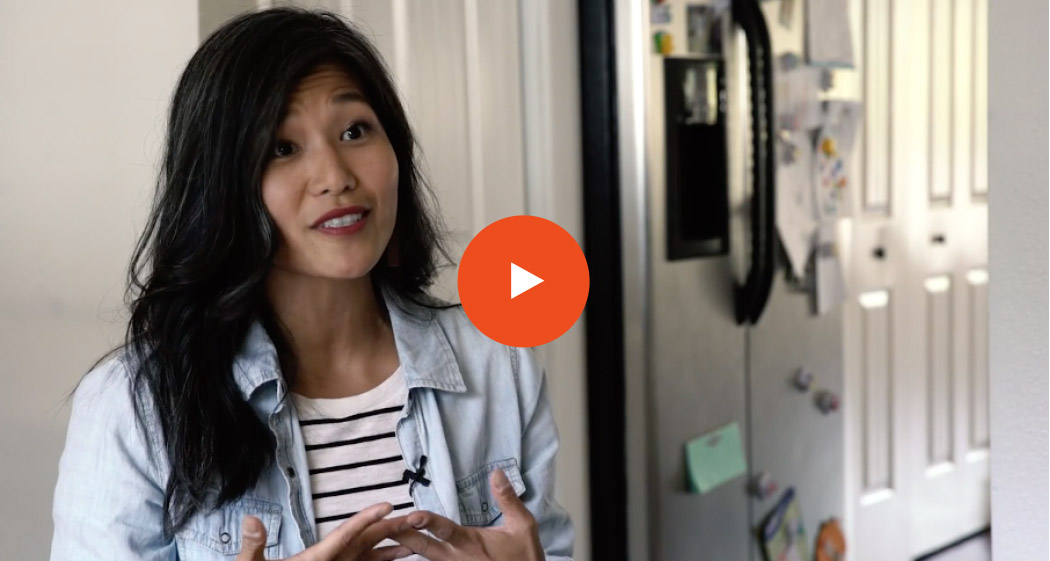
Just like the stories above, we can help you too.
It's easy to get started!

It's easy to get started
How to Get Started with IEW

Interested?
Let's get started, what people are saying.

What a Difference!
My son went from not putting anything on paper to being able to utilize the skills and structure that he got from IEW to writing papers sometimes longer than what's required. All I have to do is check the grammatical errors!

All-time Favorite Curriculum!
I noticed improvement in my kids' writing almost immediately. No more whining from my kids means it's a win for me and them!

Provides Strategies That Work
Writing is not an easy subject to teach well, but IEW provides simple and easy-to-use strategies that support the teacher in her instruction. Before students realize it, they are writing!

Proven Methods That Work
Don't spend a lot of money on curriculums that will come and go. IEW has proven methods.

Fun and Easy to Use
I used IEW materials with all of my kids. Each of them was a different type of student. I found that the material was useful and effective for each of their different learning styles and temperaments. I found it fun and easy to use and very interactive. We have many great memories of leaning over rough drafts and laughing about stories!
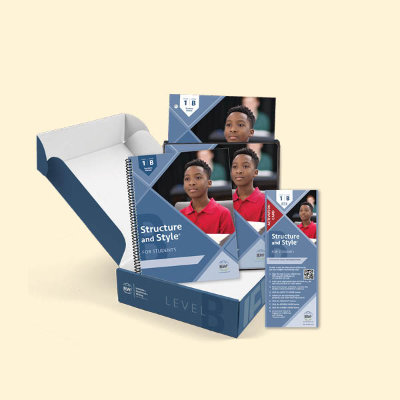
Challenging but Not Overwhelming
Not a question but a big thank you! This is our first year homeschooling our 6th grade son. This writing class has been terrific! Mr. Pudewa does a great job of teaching and keeping my son engaged. So far, the workload has been just right. It’s challenging but not overwhelming! Many, many thanks!

Piece of Cake
I started using IEW in 2018 in my homeschool with my now twenty-year-old son. He wrote circles around all the others in his first-year college writing courses. He is in the top 10% of his college class and received an invitation (nominated by his writing instructor) to join Phi Theta Kappa honor society. My son has told me that he was so glad I had him take all those IEW courses throughout his middle and high school years because it has made college writing a piece of cake. We are continuing the IEW journey with our now seventh-grade daughter and eighth-grade son. Thank you!
100% Satisfaction Guarantee
We offer a 100% satisfaction, no time limit guarantee on everything we sell.
The hardest thing is just doing it. Simply sit down, push play, and start learning!
– Andrew Pudewa
Free Downloads
Reaching the reluctant writer.
Remove the problem of what to write, and you will be free to learn how to write.
Nurturing Competent Communicators
Learn the two most critical things needed for a high level of aptitude in writing.
Four Deadly Errors of Teaching Writing
Avoid four teaching mistakes that contribute to frustration about writing assignments.
Free Language Arts Lessons
Try three FREE weeks of language arts instruction!
Don't wait any longer. Get started today! Get Started
Walking by the Way
the road to inspired learning
Eight Free Creative Writing Lessons
February 17, 2012 by Ami 17 Comments
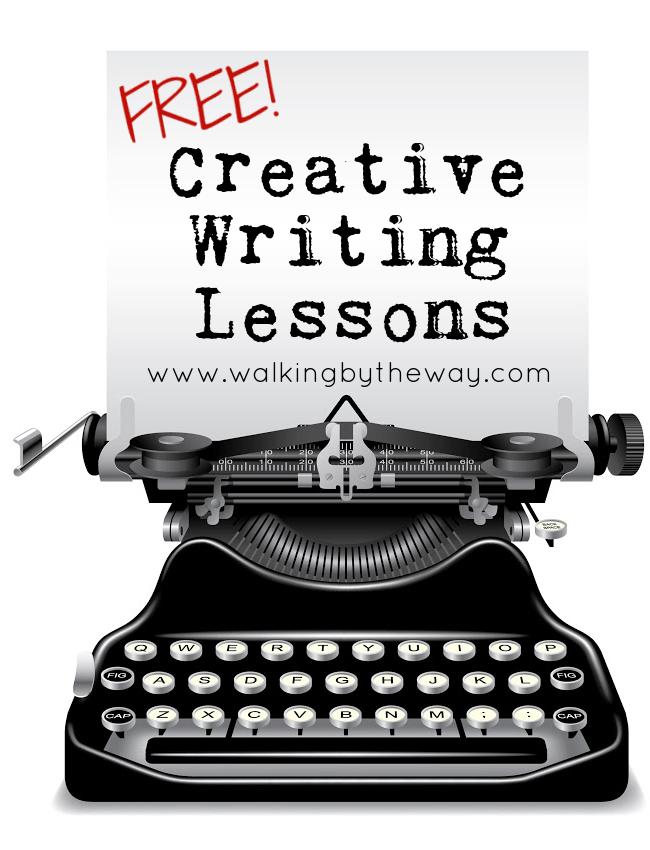
I know I throw around the word favorite all the time. But this is the truth: teaching creative writing lessons is my favorite.
I have taught creative writing enrichment for summer school students. I have taught creative writing in various homeschool settings and co-ops. I have taught big students and little students. And I love it.
Since I love to share homeschool co-op class ideas , I have compiled the creative writing lessons from a co-op class that I taught.
Creative Writing Lessons for a Homeschool Co-op Class
First, please remember that any teacher can use these creative writing lessons. You don’t need to be teaching homeschoolers. You can be a classroom teacher or a homeschool teacher at home with one student. You can even be a librarian who needs a fun program series.
Second, I used these creative writing lesson plans with upper elementary students (with maybe a few 7th graders thrown in). However, you can adapt and use them for older students or younger students!
Creative Writing Lesson Plans
Creative writing lesson one.
The first lesson focuses on cliché and metaphor. It prompts students to consider how words matter.
Grab lesson one here .
Creative Writing Lesson Two
The second lesson teaches students about sensory details: why they are important and how to include them in their writing. Students will begin using sensory details to evoke smells and sounds and sights.
Grab lesson two here.
Creative Writing Lesson Three
The third lesson introduces showing vs. telling. Students learn how to recognize authors who utilize showing, and students are able to articulate the difference between showing and telling.
Grab lesson three here.
Creative Writing Lesson Four
The fourth lesson teaches students how to capture images. We use examples of poetry and prose to discuss this important writing skill.
Grab lesson four here.
Creative Writing Lesson Five
The fifth lesson introduces the story elements of character and conflict.
Note: You may choose to split this lesson into two lessons since it covers two big elements. I only had nine weeks with my students, so I had to jam character and conflict together.
Grab lesson five here.
Creative Writing Lesson Six
The sixth lesson introduces the students to point of view and perspective. We have fun reading poems and using pictures to write descriptions from different points of view.
Grab lesson six here.
Creative Writing Lesson Seven
The seventh lesson puts everything we’ve learned together. I read the students some fractured fairy tales, and we watch some, too. Students then use the prewriting activities and their imaginations to begin drafting their own fractured fairy tales.
Grab lesson seven here.
Creative Writing Lesson Eight
The eighth lesson focuses on revision. After a mini-lesson, students partner up for peer editing.
Grab lesson eight here .
For our final class day, students bring revised work, and I host coffee shop readings. This is a memorable experience for students (and their teacher).
Creative Writing Lessons FAQ
Since posting these creative writing lessons, I have had lots of questions. I decided to compile them here in case you have the same question.
Q: What are copywork quotes? A: Copywork quotes are simply great quotes that students copy as part of their homework assignments. You can use any quotes about writing. I’ve included my favorites throughout the printable packs.
Q: Can I use this with a younger or older student? A: Absolutely! Just adapt it to meet the needs of your student.
Q: Can I use this for my library’s programming or my homeschool co-op class? A: Yes! I just ask that it not be used for profit.
Do you have any questions about teaching creative writing? What’s your biggest hang-up when it comes to teaching creative writing? I’d love to hear from you and help you solve the issue.

January 7, 2016 at 1:57 pm
Hi Theresa,
As long as you are not profitting from using them, they are yours to use! Enjoy! Wish I could be there to help facilitate all those young writers!
[…] Creative Writing Class […]
Leave a Reply Cancel reply
Your email address will not be published. Required fields are marked *
Save my name, email, and website in this browser for the next time I comment.
- Create a List
- Cathy Duffy Reviews Home >
- Homeschool Reviews Core Curricula >
- Composition & Grammar >
- Graded Language Arts Curricula >
The Creative Writer
The Creative Writer is a series of four courses, each of which should take one school year or 36 weeks to complete. While the target audience is students in grades five through eight, this series definitely can be used with older students too. Volumes Three and Four might even be a better fit for high school students. Volume designations rather than grade levels make it easy to use this series at whatever level is most appropriate for your students.
Lessons in all four courses are presented in two, 18-week sections—the first section on fiction and the second on poetry. Lessons are presented in multi-week units, so students might spend four weeks working on character.
In Level One , fiction units cover plot, character, dialogue, observation, setting, point of view, and writing a short story. The poetry units are introduction to poetry, description, getting the words right, sound, and writing a poem. Distinctions between the two sections often seem fuzzy, but this is intentional. For example, students learn to observe and write descriptively in both fiction and poetry lessons. Likewise, other skills are learned and applied in both realms.
Student books are consumable. Some lessons have space for students to do written exercises directly in the book. Students will also maintain a “practice notebook” for ideas, notes, vocabulary words and other written work. Sometimes space to write in the text won’t be sufficient, and students might be better off completing the exercises entirely in their notebook rather than in the text.
The author also suggests that students get in the habit of carrying a little notebook and pencil with them to jot down observations and ideas when they strike. In this digital age, I suspect students would be more likely to either record voice notes or type them into their smartphones as an alternative.
The purpose of each lesson is stated clearly at the top of the first page of the lesson. Lessons are written directly to the student so they need not be presented by a teacher. They often use excerpts from literary works or poems both as examples and as springboards into student exercises. For example, an excerpt from Tom Sawyer and the story of “Rapunzel” are used to teach about plot. The author first walks students through his own selection of plot points for Tom Sawyer then students discover plot points within “Rapunzel” on their own. Whether using literary excerpts or not, author Boris Fishman does an excellent job of first helping students see how authors use techniques before asking students to implement those techniques. When students have to come up with their own ideas, he offers many creative suggestions to make it easier for students to find a starting place.
Most lessons conclude with one or two “Challenge Exercises,” optional activities that reinforce the lesson but stretch students to go even further in working with a particular skill or technique. These are usually so worthwhile that it would be worth slowing down the course if necessary to make time to use them.
The courses are designed to help students develop skills and strategies for writing. While assignments are clearly spelled out they aren’t as narrow and prescriptive as some programs. For example, in a lesson on characterization, Fishman presents ten questions for students to answer about their selected character. Students then use those questions and answers as fodder for writing a 500-word descriptive narration. In a less-structured exercise, students are to spend a short period of time observing a scene with a person or group of people (e.g., dad mowing the lawn for five to ten minutes) then quickly write 500 words either in narrative form or as bullets. You might have picked up on the fact that many of the fiction lessons ask students to write 500-word assignments each week--more if you add the challenge exercises.
Fishman includes some unusual assignments that I would love to try myself such as one that directs students to write two separate descriptions of the same barn—one from the point of view of a happy character and one from the point of view of a sad character.
Students conclude the fiction lessons in Level One by writing their own 1000-word story from scratch.
This is probably a more demanding program in terms of the amount of writing required than are most other programs for students in grades five through eight.
Levels Two through Four gradually become more difficult, and Level One is challenging to begin with! By the time they reach Level Four, students are working at high school or even college level. In Level Four , they learn how to integrate backstory into their fiction. Lessons on fantasy fiction begin with an assignment to first read at least 30 pages each of five different fantasy novels, noticing how fantasy stories differ from ordinary drama then create a plot, characters, and setting for a fantasy short story and compose 500 words of one scene from any part of the story—assignments all for one week. Another lesson has students write a scene from a play that they create. A poetry lesson has students “write a poem that maintains a single metaphor for its duration.”
I have focused thus far primarily on the fiction lessons. While half of the lessons are designated as poetry, there is a tremendous amount of “cross fertilization” between fiction and poetry lessons. Poetry assignments are not restricted to use of rhyme and meter, especially the first year, but are much more open ended with an emphasis on free verse. However, The Creative Writer’s approach to poetry emphasizes learning the craft of poetry—the techniques that make poetry poetry rather than loosely organized prose. Students gradually learn these different elements as they work through the four courses, working on various elements rather than on complete poems most of the time until they reach Level Four . For example, in Level One , this includes learning about rhymes, alliteration, repetition, and other poetic elements. And many lessons involve “word play” that helps students develop more creative and precise vocabulary. Students conclude the Level One poetry lessons by writing their own poem of any sort they choose. Students learn about meter and stress in Levels Two and Three (along with many other topics). By Level Four students should have learned techniques well enough that they are able to tackle the first poetry lesson assignment to write four poems in one week, aiming for a rough guideline of at least 16 lines per poem.
Students can work independently through the lessons, but the program is better used with a mentor assisting or overseeing the student. Either at the end of the units for each semester or at the end of the entire book are sections of “Mentor Materials” with notes on each lesson that help a mentor to assist and evaluate the student. Often, the notes provide tips that might help students focus on the primary objective of the lesson to ensure that they don’t just complete an assignment but really get the point. Students working independently, especially older students, might read through the mentor notes themselves to glean anything that might be helpful.
Students might begin Level One in fifth grade, but any student up through high school who has not been introduced to the basics of creative writing such as plot, character, setting, and point of view could begin at this point. Older students who already have a some foundation might start in Level Two which also presents the basics, albeit more briefly. Level Three shifts from the basics into technique, so students need to have a foundation and some experience writing fiction before tackling Level Three . Levels Two and Three could easily be used by adults who want to develop their own writing skills. While they might be used by students at the publisher’s suggested sixth and seventh grade levels, I think they will probably work better with students a grade or two higher.
While many writing courses are written by teachers, The Creative Writer was obviously written by a writer who loves his craft. He sometimes mentions his own approaches or techniques he’s learned. He reveals how a poetry course requirement first opened up new ways of thinking about his own prose writing. All of this conveys a sense of Fishman serving as a mentor to those using these courses. While the courses are challenging, they are also inspiring and engaging. Students who really want to develop their writing craft are likely to love this series, and reluctant writers might find that they enjoy writing more than they thought they ever would.
Pricing Information
When comparison prices appear, please keep in mind that they are subject to change. Click on links where available to verify price accuracy.
digital downloads (available from the publisher) - $13.50 each
Creative Writer Level One: Five Finger Exercises
- $12.69 at Amazon.com
- $2.32 Used at Amazon.com Marketplace
- $16.95 at ExodusBooks.com
- $12.15 at Christianbook.com
- $12.25 at Rainbowresource.com
Creative Writer Level Four: Becoming a Writer
- $4.23 Used at Amazon.com Marketplace
Creative Writer Level 3: Building Your Craft
- $7.05 Used at Amazon.com Marketplace
Creative Writer Level Two: Essential Ingredients
- $10.04 at Amazon.com
- $4.84 Used at Amazon.com Marketplace
- $18.95 at ExodusBooks.com
Core Curricula
- Art & Music
- Bible & Religion
- Catholic Curricula
- Composition & Grammar
- Early Learning / Preschool
- Foreign Language
- Handwriting
- History & Geography
- Grade Level Packages & Courses
- Math Supplements
- Phonics & Reading
- Spelling & Vocabulary
- Unit Studies & All-In-One Programs
- Register | Log in
Instant Key
- Need For Parent or Teacher Instruction: low
- Learning Environment: one-on-one or independent study
- Grade Level: grades 5-12
- Religious Perspective: secular but Christian friendly
Publisher's Info
- Well-Trained Mind Press
- (877) 322-3445
- https://welltrainedmind.com/
Note: Publishers, authors, and service providers never pay to be reviewed. They do provide free review copies or online access to programs for review purposes.
Disclosure of Material Connection: Some of the links in the post above are "affiliate links." This means if you click on the link and purchase the item, I will receive an affiliate commission. Regardless, I only recommend products or services that I believe will add value to my readers. I am disclosing this in accordance with the Federal Trade Commission's 16 CFR, Part 255 "Guidelines Concerning the Use of Endorsements and Testimonials in Advertising."
- Skip to primary navigation
- Skip to main content
- Skip to footer

Essentials in Writing
Where learning to write well has never been so easy
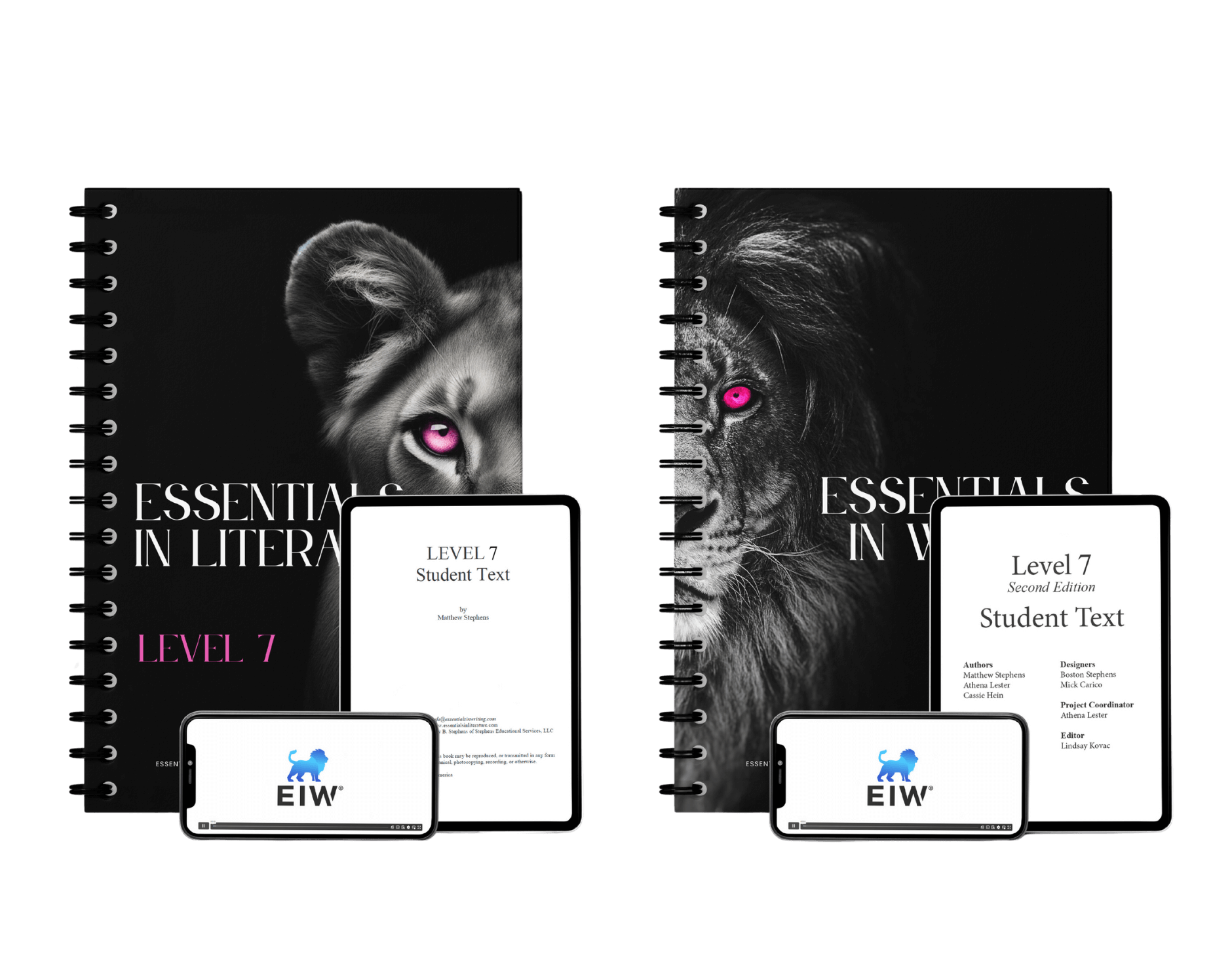
Essentials in Writing Level 7 Second Edition
EIW™ Level 7 is a homeschool writing curriculum that features a slow, systematic approach for students aged 12-13 who want to learn how to write well. The step-by-step approach allows students to focus on small, daily assignments, so they don’t feel overwhelmed.
Order Essentials in Literature only Order replacement textbooks & assessment resource books
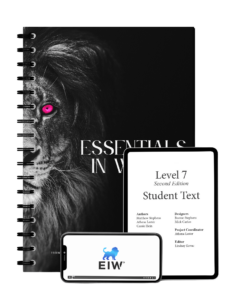
- Writing Student Book
- Teacher Handbook
- Video Lessons
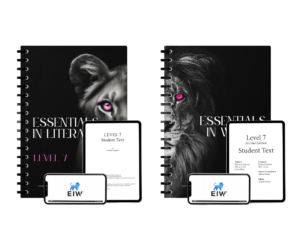
English Bundle
Writing and literature.
- Writing and Literature Student Book
- Teacher Handbooks
- Novel (Roll of Thunder, Hear My Cry)
Customize your package
Add Assessment/Resource Booklet
Add Digital Level 7 Assessment/Resource Booklet
Includes: all online videos on DVD for offline remote viewing if needed
Add Scoring Service
Level 7 Scoring for 2024-2025
Add a printed Level 7 Assessment/Resource Booklet
Add Additional Writing Textbooks
Add Additional Printed EIW7 Second Edition Textbook
Add DVDs – Writing
Add DVDs – Literature
Add Print Assessment/Resource Booklet
Add Printed Level 7 Assessment/Resource Booklet
Add Additional Writing Textbook
Add Additional Literature Textbook
Add Additional Printed EIL7 Textbook
Add Additional Novel
Roll of Thunder, Hear my Cry by Mildred Taylor
Package Total $ 0
Don't forget
Customers often also purchase
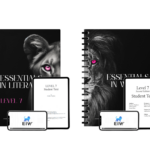
Add Literature to Bundle
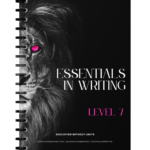
Assessment/Resource Booklet
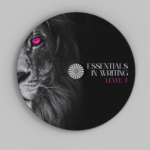
Scoring Service
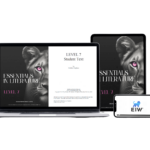
Additional Writing Textbooks

DVDs – Writing

DVDs – Literature

Print Assessment/Resource Booklet

Additional Writing Textbook

Additional Literature Textbook

Additional Novel
Homeschool students will learn to apply parts of speech as well as use them as tools for effective communication. They will learn to write effectively by using a variety of sentence structures in paragraphs, a narrative, personal and business letters, an essay, and a research project. Students will explore expository, descriptive, persuasive, and compare, and contrast writing.
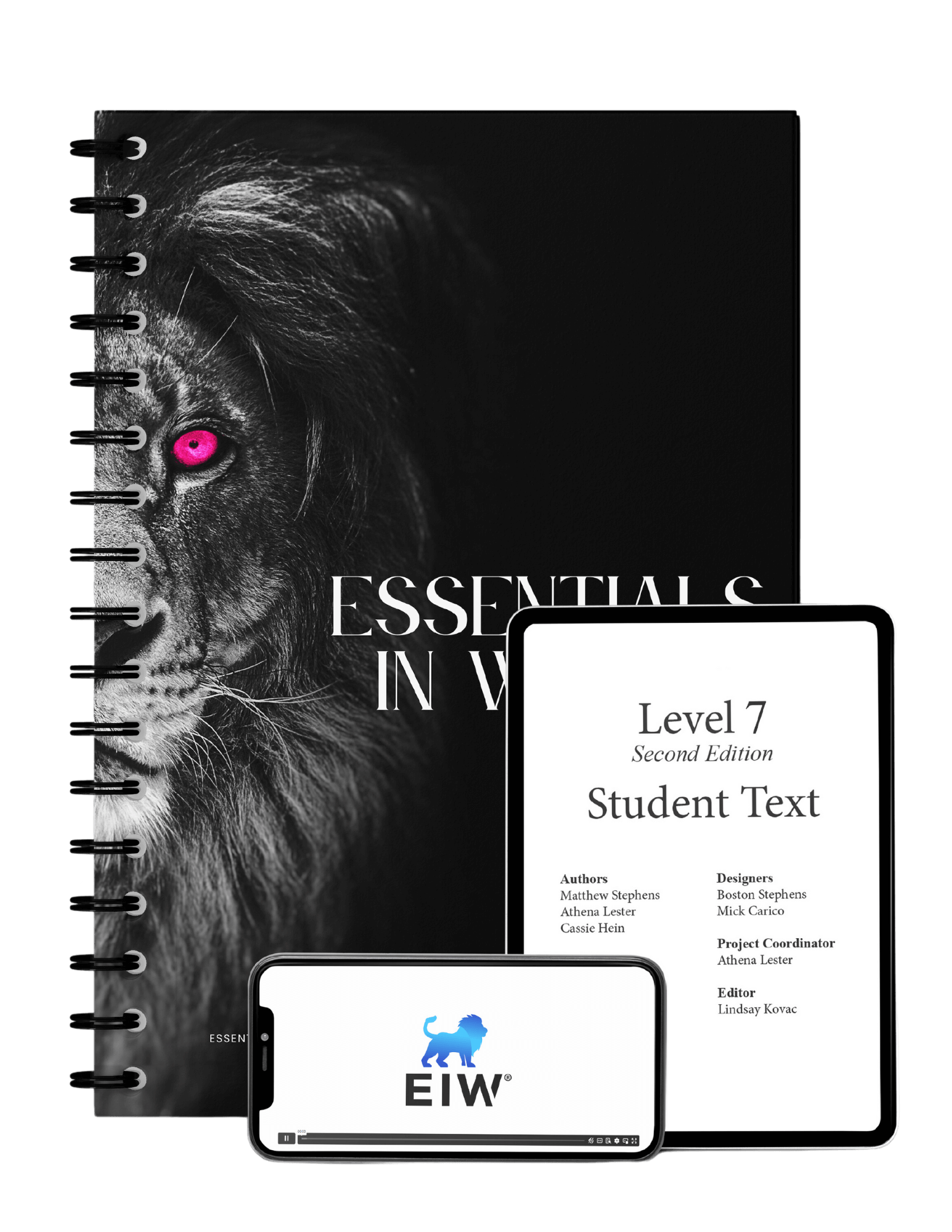
UNIT ONE: GRAMMAR
Apply Activities for Parts of Speech
- Action Verbs
- Prepositional Phrases
- Vivid Language
Apply activities for sentence structure:
- Independent and Dependent clauses
- Simple and Compound Sentences
- Complex Sentences
- Avoiding Sentence Errors (fragments, run-ons, and comma splices)
- Varied Sentences in a Composition
- Appositives
- Transitions
Apply activities for common problems:
- Pronouns and Antecedents
- Subject/Verb Agreement
- Don’t/Doesn’t Problem
- Unclear Subjects
- Paraphrasing
- Writing a Summary
UNIT TWO: COMPOSITION
Follow the writing process for:
- Paragraphs (expository, persuasive, descriptive, compare, and contrast writing)
- Personal narrative
- Persuasive business letter
- Expository essay
- Descriptive personal letter
- Research project
Additional composition skills:
- Audience and purpose
- How to choose an appropriate writing form
- Informal and formal writing
- Finding and using quality sources to research and explain a topic
- Effective narrative writing skills (first and third-person point of view, mechanics of dialogue, narrative hook, narrative writing)
- Letter formatting (personal letters and business letters)
- Effective writing skills (sensory details, hooks, thesis statement and restatement, mechanics of dialogue, first and third-person point of view, transitions, variety of sentence structures and word choice)
- Summarizing and paraphrasing someone else’s content in their own words
- Develop supportive, strong details and examples
Sample Lesson Video – Level 7
Level 7 – Sample PDFs
- Level 7 Second Edition Textbook Sample
- Level 7 Assessment/Resource Sample
- Level 7 34-Week Plan
- Alternative Instructional Strategies – PDF
Frequently Asked Questions About Level 7 Writing Curriculum
How old are 7th level students.
The general age for students completing Level 7 is 12 or 13 years old. The age can vary depending on if a child has started school early, on time, or is repeating a grade. The age of the student does not delegate if a child can complete this writing course. Instead, we recommend that students have a basic understanding of spelling, grammar, sentences, composition, and the skills taught in Level 6 before beginning.
What is taught in Level 7?
Level 7 will teach students to apply parts of speech and sentence structures to produce more complex and purposeful writing and introduces them to new grammatical concepts such as gerunds and appositives. Writing activities in Level 7 reinforce the writing process for persuasive, expository, descriptive, narrative, and research writing. Students will gain familiarity with the business letter format and the mechanics of dialogue and continue to learn techniques that will allow them to write with greater clarity and development.
What is the 7th grade homeschool writing curriculum?
In homeschool, 7th grade writing curriculum consists of online video lessons, a student textbook/workbook, and an answer key. Parents use this homeschool writing curriculum to guide their students through grammar and writing for the 7th grade. Seventh grade students should already have a basic understanding of grammar, how to write sentences and a basic paragraph, and the basic concept of beginning, middle, and end in writing.
Why choose Essentials in Writing?
Essentials in Writing is an excellent choice for homeschool curriculum because it is not parent intensive, and each composition follows a step-by-step process (The Writing Process) broken down into small chunks of information with the act of modeling provided by the teacher, Mr. Stephens, on video.
7th grade writing as a Tutoring Program
Many parents and teachers use this program for the children and students as a middle school writing tutor. Because each composition follows a step-by-step process (The Writing Process) broken down into small chunks of information with the act of modeling provided by the teacher, Mr. Stephens, on video, students learn to write well with ease. Additionally, given the fact that the lessons are short and compositions are written over several days rather than in one sitting, Essentials in Writing is an easy add to a student’s school day, like an after-school tutoring program. Most lessons are a maximum of 30 minutes each day, including the time students spend watching the teacher on video and working on the assignment.
What is included in the Workbook and Assessment Resource Book?
7th Grade Writing Workbook
- Lesson content that accompanies the video lesson
- Lesson activities that accompany the video lesson
- Writing graphic organizers that accompany the video lesson
- Separate parent/teacher handbook
- How to use the program
- 34-week lesson planning option
- Writing icon descriptions
- Sample answers for each lesson
- Scoring rubrics for compositions
- Point values for each activity and composition
- How to score activities and compositions
7 th Grade Writing Assessment (A) / Resource Book (R)
- (A) Multiple choice, underline, fill-in-the-blank for each mini section of the grammar unit
- (A) Composition assessments for each composition completed in the workbook
- (A) Unit One and Unit Two comprehensive assessments
- (R) Extra graphic organizers
- (R) Extra helpful graphics
- (R) Extra composition rubrics
- (R) Research project source cards
- (R) Extra writing checklists
- (R) Additional word lists
The Assessment/Resource Book will provide students the opportunity to show what information they are retaining. Although some parents/teachers use the assessments as actual evaluations, others use them as extra practice. The point values are included to help parents/teachers track and evaluate the student’s progress, though some parents may not use them. The additional word lists and graphics are valuable in improving student vocabulary and remind the student of important writing techniques.
What if I have multiple students?
Additional 7th grade writing workbooks can be purchased to provide a workbook for another child/student. The workbook does not have additional information and is just another core workbook for another student so that each student has their own workbook to use.
What should a grade 7 homeschool student know by the end of the year?
Students completing their 7 th grade year should have mastered a number of skills and writing techniques.
- Apply parts of speech in writing
- Identify and correct common writing problems
- Use writing techniques to communicate effectively in written language
- Identify and use a variety of clauses and sentence structures to develop quality sentences
- Know and understand how to effectively paraphrase and summarize content
- Follow the writing process to communicate in paragraphs, narratives, letters, and essays
- Know and understand how to use strong details and examples to support opinions and explanations in writing
- Know and understand how to develop thesis statements for larger compositions
- Identify audience and purpose
- Use graphic organizers effectively to organize writing content
- Know how to choose an appropriate writing form
- Understand informal and formal writing
- Understand how to format personal and business letters
- Know and understand effective writing skills: strong details, transitions, variety of sentence structure, effective use of dialogue, and effective use of vivid language and sensory details
- Research a topic using quality sources, paraphrase content, and include multiple small compositions in a research project
What is included in the course?
Unit One covers grammar instruction with activities where students learn to apply parts of speech, to identify and correct common problems in writing, to use parts of speech along with a variety of sentence structures and vivid language as tools for effective communication, and to effectively paraphrase and summarize content.
Unit Two covers the writing process for multiple compositions as well as how to communicate effectively in written language through a variety of styles and formats by applying effective writing tools. The unit ends with a research project.
Does each unit come with worksheets and tests?
Both units are included in the 7 th grade writing curriculum Workbook/Textbook. This book contains instructional content as well as worksheet activities related to both units (grammar and composition). An Assessment/Resource Book is available for purchase to accompany the Workbook/Textbook and includes a variety of assessments in different formats as well as additional resources such as graphic organizers and resource word lists.
Does the workbook include a daily/weekly curriculum planner?
Each level of Essentials in Writing includes a 34-week suggested, yet optional, lesson planner.
How much time will students need to complete a course?
The time needed to complete the 7th level writing curriculum is a typical academic year (34 weeks). If students follow the 34-week plan included, they will complete individual lessons and activities during the week; however, because the lessons are broken up into small, daily mini-lessons, students can double up on some lessons and activities and complete the entire course sooner. Each day, students will spend 15-30 minutes on writing.
Can I grade my student papers myself?
Yes. Essentials in Writing provides both scoring checklists and rubrics for your convenience with sample compositions for comparison purposes.
Some parents, however, choose to use The Essentials in Writing Scoring Service. This service is an optional add-on that takes the scoring burden off parent/teacher and places it on the scoring team! Our Scoring Team includes a variety of qualified individuals including long-time educators, librarians, and professionals with Bachelor’s degrees in English.
Parents of students completing Levels 6, 7, 8, 9, 10, 11, or 12 of Essentials in Writing are eligible to purchase this service. Offered from September 1 to June 15 of each school year, one composition for each EIW assignment may be submitted for scoring. If purchased after the September 1 start date, services still expire on June 15 of the following year.
The scoring system includes:
* Online access through Gradient where the Scoring Services are conducted
* One final composition from each lesson of Essentials in Writing to submit for scoring
* Feedback in the form of a rubric with a score as well as a one-paragraph write-up from their scorer complementing strengths and sharing areas to improve, plus, detailed comments and suggestions within the composition
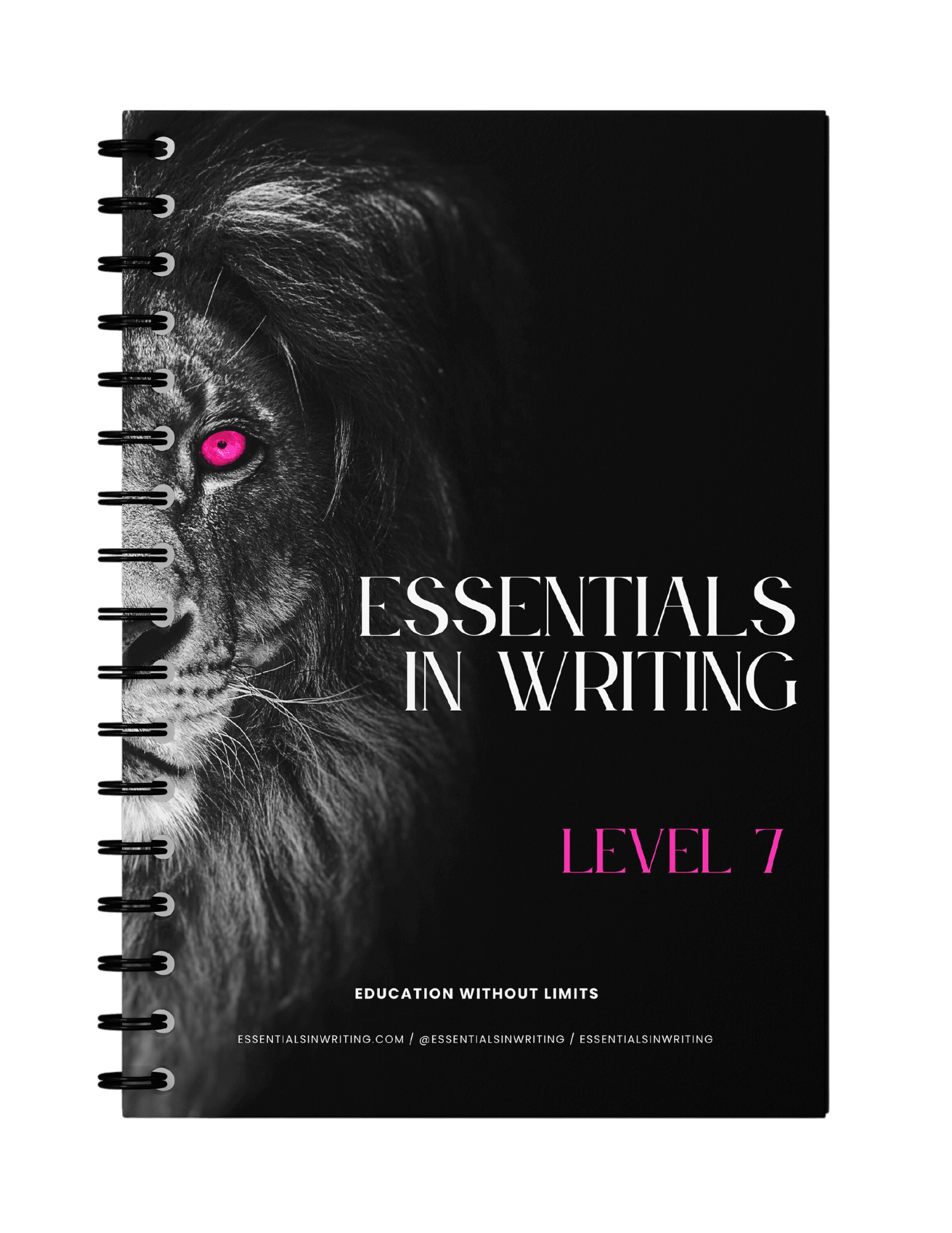
The Difference Between Digital and Print Textbook/Workbook
The online version of the curriculum includes all of the required materials for completing a level of Essentials in Writing or Essentials in Literature, but in a digital format. With the online version, all of your materials are in one spot within the member’s dashboard for you to view and print!
The required online materials include: Student Workbook/Textbook Lesson Videos Teacher Handbook (EIW Levels 1-10 and EIL 7-9)
For EIW Levels 1-10, you can get a digital Assessment/Resource Booklet as well!
How does this compare to the print version? The print version of the curriculum includes all the online access to the digital materials AND the printed, physical, tangible version of the textbooks. The printed books are great for students who prefer to complete their assignments directly within an organized, bound book.
It simply comes down to personal preference. Now, families have the added convenience of being able to access their materials in different formats.
Additional Student Level Textbook/Workbook
Additional Workbook is compatible only with second edition Essentials in Writing video instruction. This is only a Student Workbook for an ADDITIONAL student using the same level of video instruction. Please note that the Workbook is not functional without the related video instruction.
About The Scoring Service
Let Essentials in Writing take the scoring burden off your mind! Our Scoring Team includes a variety of qualified individuals, including long-time educators, librarians, and professionals with Bachelor’s degrees in English, and they are ready to take the burden of grading compositions away from you.
Parents of students completing levels 6*, 7*, 8*, 9, 10, 11 or 12 of Essentials in Writing are eligible to purchase this service. (*Second Editions only.) Offered from September 1 to June 15 of each school year, one composition for each EIW assignment may be submitted for scoring. If purchased after September 1 start date, services still expire on June 15 the following year.
How Do The Scoring Services Work?
- Available from September 1 to June 15 (one school year).
- One final composition from each composition lesson of Essentials in Writing may be presented for scoring.
- Students receive a rubric with a score as well as a one-paragraph write-up from their scorer complimenting strengths and sharing areas to improve, plus, detailed comments and suggestions within the composition.
- Scoring Services will be conducted online through Gradient, Essentials in Writing’s online grading platform.
PLEASE NOTE: Scoring services are for Essentials in Writing only and are not eligible for unconditional money back guarantee.
Read More About Our Scoring Service
(Assessment/Resource Booklet is compatible only with second edition Essentials in Writing curriculum)
- Assessments 15 grammar assessments in a variety of formats (fill in the blank and revision activities associated with both sentences and larger compositions), five composition assessments, and two comprehensive unit tests
- Resources Parent/student full-color word lists, composition resources, and multiple graphic organizers
Essentials in Writing comes with Online Streaming Video Instruction
- ONLINE STREAMING 12 month access to ONLINE lesson-by-lesson video instruction (Free renewals upon request)
- DVD DVD video lessons can be added for $45.00 plus shipping (This includes access to online streaming as well)
The Level 7 Literature course is broken down into four units with each unit focusing on a different type of literature. Unit One focuses on short story fiction with fiction unit terms and explanation, seven short stories (application), and one summative assessment.
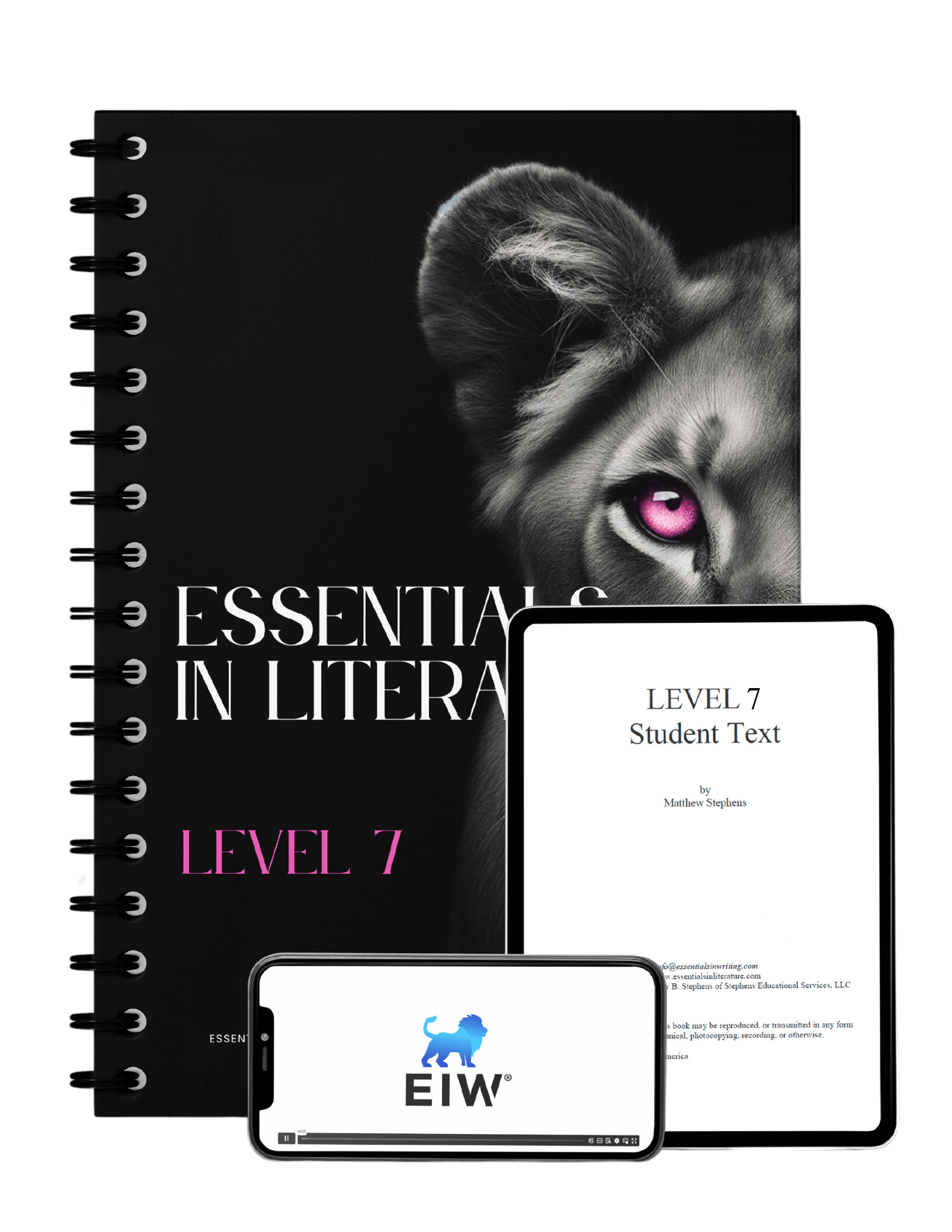
Unit 1: Fiction (Short Stories)
- Fiction unit terms and explanation
- 7 short stories (application)
- 1 summative assessment
Unit 2: Nonfiction (Short Literary Works)
- Nonfiction unit terms and explanation
- 6 nonfiction works (application)
Unit 3: Novel
- 1 Novel (literary analysis application)
- 1 character study project
Unit 4: Figurative Language/Poetry
- Figurative Language/Poetry Unit terms and explanation
- 5 units of up to 10 literary works (application)
- Level 7 Textbook Sample
- Level 7 Literary Works
Frequently Asked Questions About Level 7 Essentials in Literature
The Level 7 Literature course is broken down into four units with each unit focusing on a different type of literature. Unit One focuses on short story fiction with fiction unit terms and explanation, seven short stories (application), and one summative assessment. Unit Two centers on short nonfiction literature and includes nonfiction unit terms and explanation, six nonfiction works (application), and one summative assessment. Unit Three has one novel with a literary analysis application, one summative assessment, and one character study project. Unit Four is all about figurative language/poetry terms and explanation, five units of up to ten literary works (application), and one summative assessment.
How are tests and assignments graded?
Scoring is for Essentials in Writing only, and there is no scoring for Essentials in Literature. The literature curriculum provides parents with scoring guides found in the answer key that include sample answers for each activity.
How much time will students need to complete Essentials in Literature?
The Essentials in Literature material follows the same 34-week timeline as Essentials in Writing, but students can work faster than the intended timeline to finish the course sooner. Each day, students will spend 15-40 minutes on writing.
Does the Workbook include a daily/weekly curriculum planner?
Essentials in Literature Level 7 includes a 34-week suggested, yet optional, lesson planner geared for middle school level learning.
Will I need to purchase additional reading material for this curriculum?
Shorter works for Units One, Two, and Four can be found online. Instructions are given in the Parent/Teacher Handbook. The chosen novel for Unit Three is included with the purchase of Essentials in Literature Level 7.
What is included in the bundle?
The bundle for Level 7 includes both Essentials in Writing and Essentials in Literature. The textbook, workbook, and video content are included in the bundle price.
Difference between the writing workbook and literature workbook?
Essentials in Writing texbook/workbook is the writing component whereas Essentials in Literature textbook/workbook is the literary analysis component in order to earn an English credit at the middle school level.
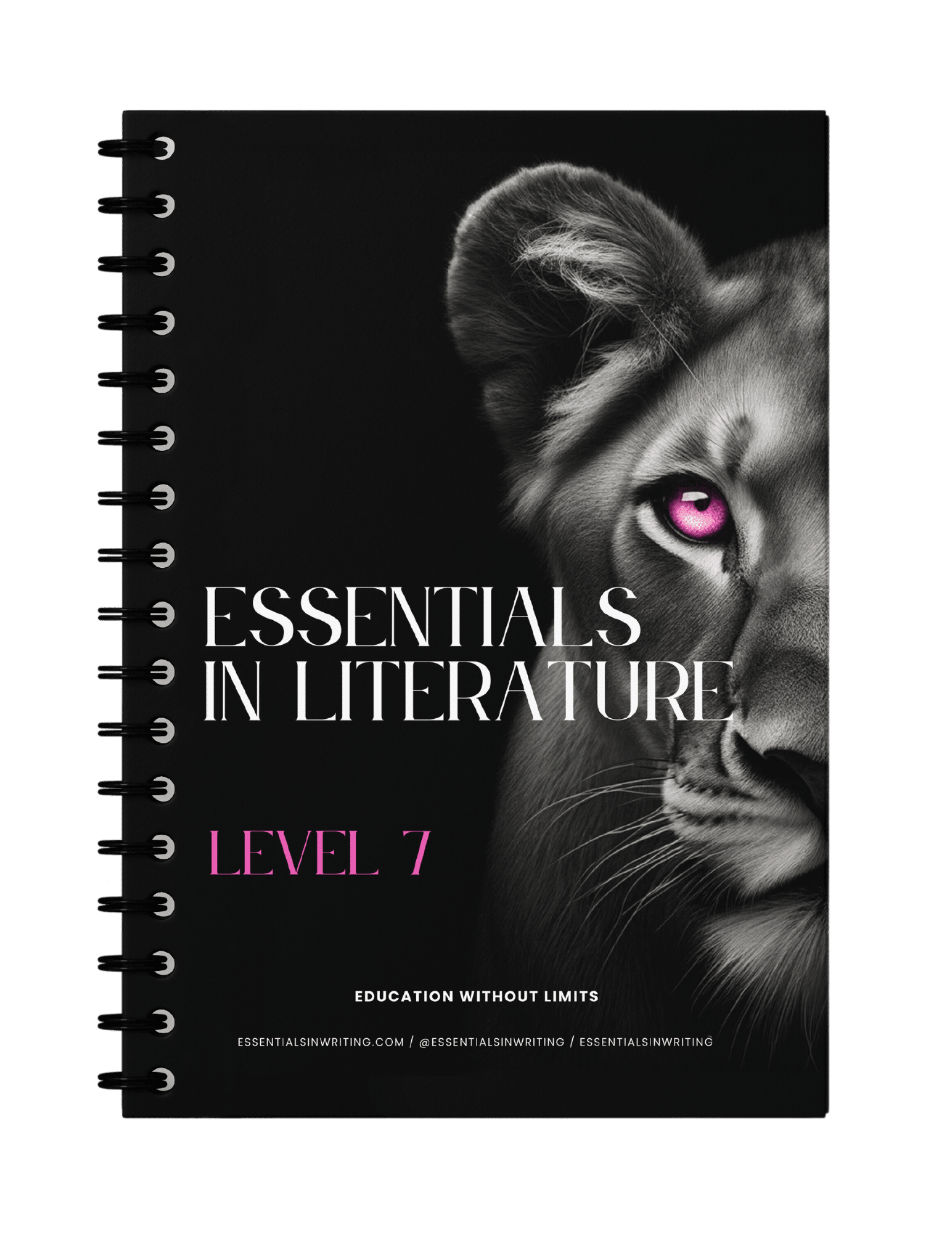
The required online materials include:
- Student Workbook/Textbook
- Lesson Videos
- Teacher Handbook (EIW Levels 1-8 and EIL 7-9)
For EIW Levels 1-8, you can get a digital Assessment/Resource Booklet as well!
Scoring Services are for Essentials in Writing only.
- DVD DVD video lessons can be added for $25.00 plus shipping (This includes access to online streaming as well)
Try it Free!
Try it Now!
Not sure which level is right for your student? Use the level wizard .
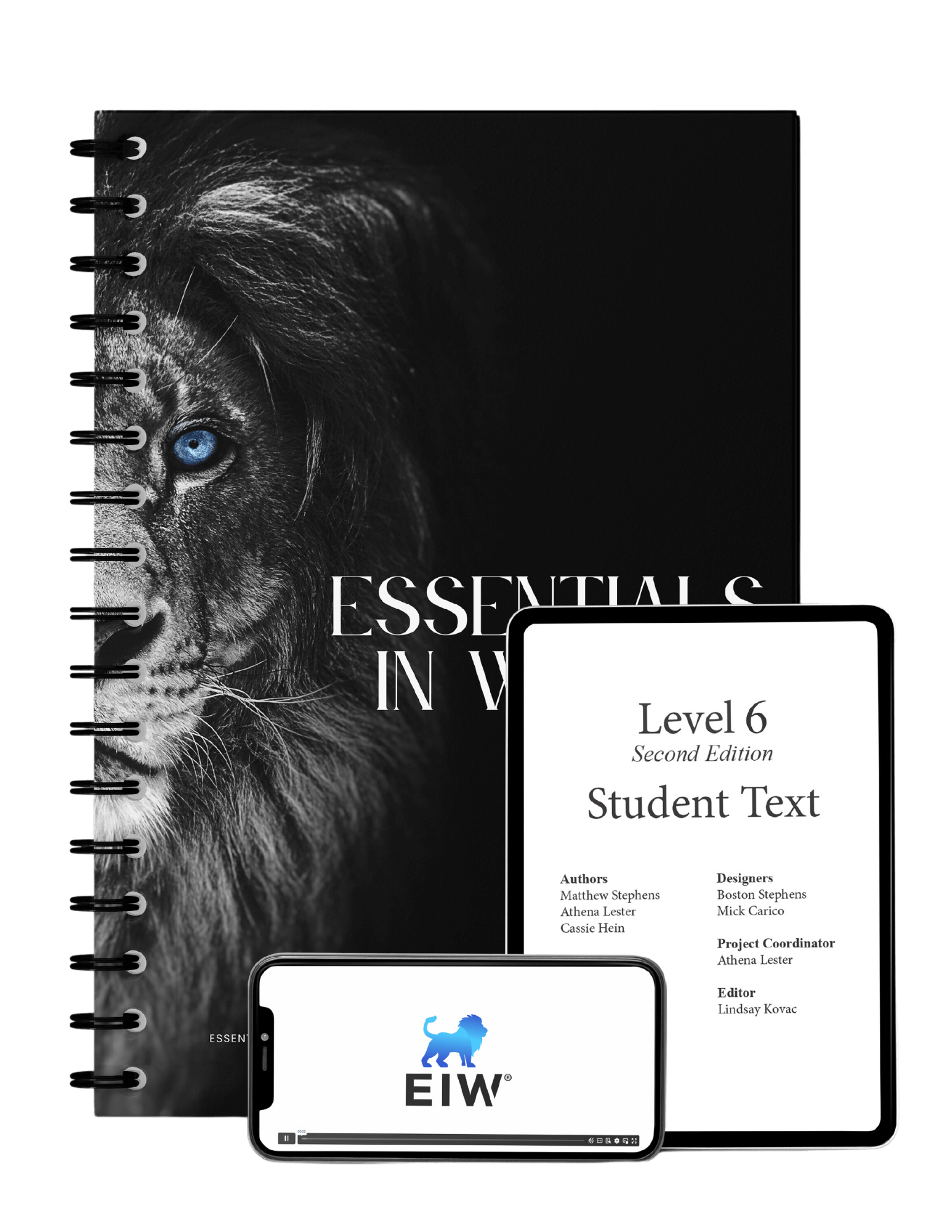
Recommended ages 11-12
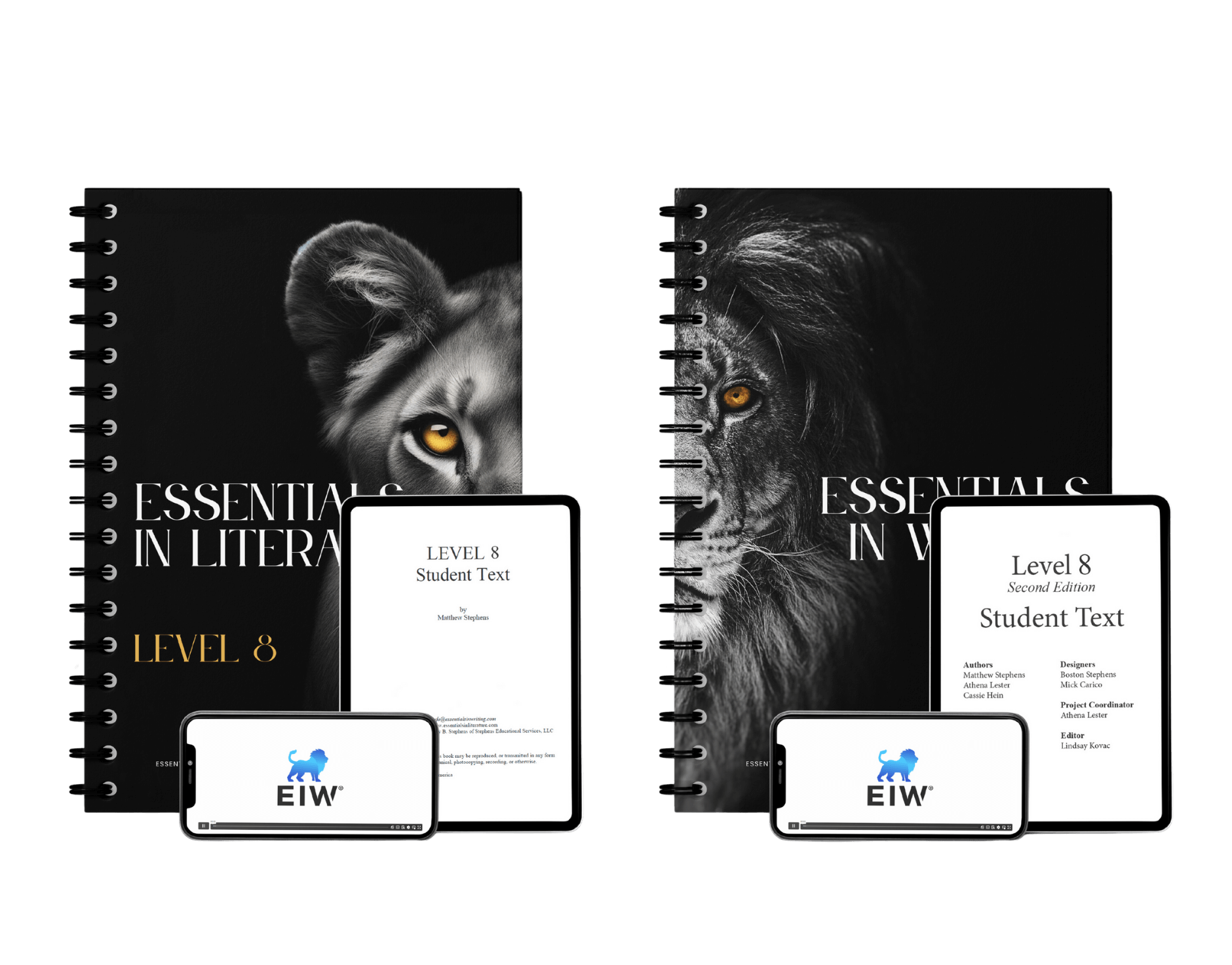
Recommended ages 13-14

Writing Courses
- Level 1 (ages 6-7)
- Level 2 (ages 7-8)
- Level 3 (ages 8-9)
- Level 4 (ages 9-10)
- Level 5 (ages 10-11)
- Level 6 (ages 11-12)
- Level 7 (ages 12-13)
- Level 8 (ages 13-14)
- Level 9 (ages 14-15)
- Level 10 (ages 15-16)
- Level 11 (ages 16-17)
- Level 12 (ages 17-18)
Literature Courses
- Level 7 (ages 12–13)
- Level 8 (ages 13–14)
- Level 9 (ages 14–15)
- Level 10 (ages 15–16)
Other Services
- Scoring Services
- Frequently Asked Questions
- Home School Resource Center
- Supplemental Writing Program (18-week plan)
- Summer Writing Program (10-week plan)
- EIL Corrective Plans
- Charter Schools
- Homeschool Heroes
- Giving Back
- International Customers
- Terms of Use

(417) 256-4191
Creative Writing | 24-25

Cradle to Crypt

Fantasy to Farce

Short Stories to Tall Tales
Our three live online creative writing courses are designed to delight 7th-12th grade homeschoolers who love to write their own stories and poems and who pine to have time to explore, refine, and share their creations. These small classes offer students a safe place to share, compare, and support each other.
Class Details
Creative Writing | One-semester electives
Classes can be taken in any order.
Tuition & Resources :
Tuition: $450 per semester
All resources are provided by instructor. See HERE .
Instructor : Christine Proctor
Fall Sessions | August 26-December 8, 2024
Spring Session | January 6-April 27, 2025
Live Class Times :
Cradle to Crypt | Every other Friday | 2-3 p.m . Eastern | FALL 2024 | Register Here
Fantasy to Farce | Every other Friday | 12;30-1:30 p.m. Eastern | FALL 2024 | Register Here
Short Stories to Tall Tales | Every other Friday | 12:30-1:30 p.m. Eastern | SPRING 2025 | Register Here
- Please see our FAQ for all dates/times/breaks for our classes.
Grade level: 7th-12th (12+)
Class size: 10-12
See our FAQ for:
age/grade guidelines, prerequisites, and class fit recommendations
a complete list of days, times, and breaks
a list of CA charter schools where this course is a-g approved
Zoom and an online classroom.
Students will be actively discussing their writing and interacting with their classmates in live classes.
Students should plan to keep their webcams on and actively participate during live Friday meetings.
All live sessions will be recorded for students who cannot attend live.
All Blue Tent creative writing courses are NCAA-approved.
Foundational Elements
In all three classes, stud ents will test drive four categories of imaginative writing:
Cradle to Crypt: children's book (think: Eric Carle), elementary educational fiction (think Magic Tree House), young adult/dystopian, ghost/mystery story
Fantasy to Farce: fantasy/fairy tale, historical fiction, autobiography, satirical play
Short Stories to Tall Tales: short story, animal tale, song lyrics or myth, tall tale
Each one-semester class can serve as half an English credit or as a separate elective. Our creative writing classes can be taken in any order.
Every other Friday there will be a live one-hour class on Zoom where the teacher--Christine Proctor-- will offer instruction and guidance. This will be a venue for students to enjoy sharing and discussing with webcams on!
Attending live is highly recommended but not required. All live sessions will be recorded since we know preferences vary and "life happens."
Once Upon a Time . . .
Any writing can be creative. But if a student has a penchant to push the limits of the written word and transport readers to a different time, place, and state of mind, these one-semester workshops might be just what is needed to get the creative juices flowing.
In these classes, students will peer into the intellects of renowned writers of fiction, poetry, philosophical essays, and even comic strips in order to inspect and dissect the tools and techniques of their trade.
Assigned reading will include excerpts of lengthy works in addition to poems, short stories, speeches, and essays.
Mastering the Mechanics
The reading and writing that ensues will focus on identifying and employing elements such as fantasy, subtle symbolism, setting techniques that transform both mood and tone, seamless figurative language, and methods to turn one’s writer’s voice from serious to satirical as the art of mystery, persuasion, and delight is refined.
Let's Collaborate!
Discussion of the class reading and the instructions for each writing assignment will be offered up in an active online classroom as well as in regular live meet-ups.
Live sessions will be a time for questions and answers as well as for the demonstration of techniques.
Students will write, respond to edits, contemplate each others’ work, and tackle the reading for the following week’s assignment before the next live session occurs.
In-depth feedback from the instructor will be both detailed and uplifting, and students will be "met" wherever they might be along the writer's journey.
The instructor will be available for questions--both live and in the online classroom--and will always be a source of support and encouragement.
Ready to take your writing to a happily-ever-after status?

Are you looking for the best online creative writing courses? You may have found some promising classes online, but you may also be unsure if the course is actually good. How can you know you’ll benefit from the course without spending your money first?
The good news is, there are creative writing courses out there for everyone, and they’re sure to improve your writing. Even better news, the best online creative writing courses share many of the same qualities.
If you want to learn how to write creatively, or if you simply want to improve your everyday writing, the best online creative writing courses can transform your writing abilities. Let’s explore what you might learn in creative writing classes, and how they help writers of all skill levels.
The Best Online Creative Writing Courses: Contents
What do you do in a creative writing class?
- Reputable Instructor
- Clear Course Description
- Promise of a Great Experience
- Constructive Feedback
- Focus on Craft
- Respect Your Creative Autonomy
- A Writing Community
- Motivate You to Write
- Jumpstart a Writing Habit
- Broaden Your Literary Horizons
- Offer a Healthy Creative Outlet
- Give You Next Steps
How to Make the Most of Online Creative Writing Courses
Every online creative writing class is unique, and different courses emphasize different things. We have classes that are entirely generative, meaning the focus is on writing new poems, essays, stories, or making headway into a novel or memoir project. Other courses might have more of a workshop component, in which you share your work with the class and receive feedback on how to improve your writing.
Some online writing courses also focus on specific skills or types of writing. You might take a class focused entirely on learning the tools for revision, or on learning the elements of fiction writing so you can later employ them in a story or novel.
In short, the best online writing courses typically include the following:
- Lectures and discussions on a topic of creative writing craft.
- Assignments that help you generate new work or revise old work.
- Opportunities to give and receive feedback with your fellow classmates.
- Feedback on your work from the instructor, who themselves is a successfully published author of the type of writing you’re producing.
- A weekly video call. Some courses, including ours, are entirely text-based and asynchronous, but many classes meet at least once a week on Zoom.
In addition to all of this, you will make new friends and connections in the best online creative writing classes. Writing is often a lonely experience for writers, and the bonds you make in creative writing workshops can last a lifetime.
12 Things to Look For In the Best Online Creative Writing Courses
The best online creative writing courses will sharpen your writing skills, help you find your confidence, and introduce you to new communities of writers. How do they do it? Here’s 12 things to look for to make sure you’re spending your money on the right online writing class.
1. The Best Online Creative Writing Courses Have a Reputable Instructor
Your course is only as good as the instructor who teaches it. For online writing classes to teach you the craft, they need to have reputable, trustworthy instructors. A great instructor will also be empathetic, community-oriented, adaptive to your writing needs, and a great writer themselves.
A great instructor will also be empathetic, community-oriented, adaptive to your writing needs, and a great writer themselves.
Do some research on the course instructor: they should have a terminal degree in their field (M.A., M.F.A., Ph.D., etc.), as well as a significant publication history. A reputable instructor will make all the difference in your course: as part of their education, the instructor should have undergone dozens of writing workshops, submitted to countless literary journals, and had their work scrutinized by critics and book lovers alike.
In order for an instructor to help you develop your creative writing skills, they need to be successful on their own. The best instructors are what make the best online creative writing courses.
2. The Best Online Creative Writing Classes Have a Clear Course Description
What does the course teach you, and what will you learn week by week? In addition to listing a reputable instructor, the course description should tell you exactly what you’ll gain from taking the course.
In addition to listing a reputable instructor, the course description should tell you exactly what you’ll gain from taking the course.
Be sure you know exactly what you’re getting out of your online creative writing course, including what you might learn and write in the process. Consider what will help you the most as you embark on your writing journey: entering a course with certain goals or learning objectives will help you make the most of the course’s lectures and writing assignments.
There should be no ambiguity: if you’re paying for the course, you deserve to know exactly what you’re paying for. And, if you have questions, ask the program administrator before you enroll. They should be happy to hear from you!

3. The Best Online Creative Writing Classes Promise a Great Experience
The best online creative writing courses prioritize one thing: YOU! Your learning, your goals, and your writing should be at the center of your experience. And, your course should guarantee that experience.
The best online creative writing courses prioritize your learning, your goals, and your writing.
Creative writing classes can be a risk, since they probably won’t confer university credit and you probably haven’t interacted with that instructor before. You want to be confident that your learning is guaranteed, otherwise you’ll only waste your time, money, and creativity.
Before you enroll in an online writing course, look to see if the program administrators have a student promise . Your experience in the course should be the number one priority of the instructor and administrators; otherwise, you’re better off looking elsewhere for the best online creative writing courses.
4. The Best Online Creative Writing Courses Offer Constructive Feedback
In addition to useful lectures and assignments, creative writing courses give you access to helpful, instructional feedback. Most instructors hold Masters or Doctoral degrees in English or creative writing and, as a result, they have ample knowledge of what works in literature, as well as tons of experience in giving feedback.
Creative writing courses give you access to helpful, instructional feedback.
In the best online creative writing classes, an instructor will both inspire you to write and guide you towards being a better writer. Their feedback will cover the many aspects of great writing. For example, your instructor might comment on:
- Unclear language
- Ideas that need to be expanded
- Sentences that are too wordy or passive
- Opportunities to use more engaging vocabulary
- Places to improve writing structure
- Grammar and spelling corrections
Finally, an instructor will tell you what you are already doing well in your writing. When you write a really great metaphor , use interesting word choice, or find a moment of great insight, your instructor will tell you—highlighting the creative writing skills you have already mastered.
5. The Best Online Creative Writing Courses Focus on Craft
You might be wondering how creative writing classes are different from high school English. The big difference is that, where a typical English class focuses on basic grammar and literacy skills, creative writing classes focus specifically on craft.
Creative writing classes focus specifically on craft: the elements of language and storytelling that make a work of prose or poetry successful.
What is creative writing craft? Craft involves the elements of language and storytelling that make a work of prose or poetry successful. Focusing on craft is how creative writing classes primarily improve your writing.
Your writing class might focus on the structure of a short story, the different types of literary devices , the importance of effective word choice , or the elements of storytelling . A writing class should break down successful works of literature into the components that make it work, giving you the tools to practice your own creative writing skills.
Additionally, craft-focused writing helps you with everyday writing. From improving your vocabulary to structuring an email, the creative writing practice translates to improved writing in every aspect of your life.

6. The Best Online Creative Writing Classes Respect Your Creative Autonomy
One of the benefits of creative writing classes is the perspective you get from different writers. No two writers are working on the same projects, and in your course, you’re likely to work with students of different genres and writing styles.
your creative authority should be respected no matter how new you are to creative writing.
With so many different writing philosophies in one class, the new ideas you encounter can help strengthen your own writing. But in the worst-case scenario, a student or instructor might try to force their writing philosophy onto you. This is always unfair, as there is no one-size-fits-all writing advice, your creative authority should be respected no matter how new you are to creative writing .
For example, let’s say you’re writing a poem about your childhood cat, and the instructor thinks it should be a poem about your experiences growing up. No matter how many times you explain you want this poem to be about your cat, the instructor keeps telling you to write more about your childhood. By ignoring your goals for the poem, the instructor is not respecting your creative autonomy, because they think they know your writing needs better than you do.
No matter where you are in your writing journey, you are a writer, and you deserve respect and compassion as such. Every writer is on a constant journey of growth and discovery; your instructor and course should acknowledge and respect that. In your course, you will encounter many different ideas, but you should also encounter the freedom to accept or reject those ideas. It’s your writing: you get the final say!
7. The Best Online Creative Writing Courses Foster a Writing Community
A creative writing course fosters a creative writing community . This community gives you the motivation to create, as it creates a safe environment to experiment, take risks, and grow in your writing practice.
A writing community gives you the motivation to create, as it creates a safe environment to experiment, take risks, and grow in your writing practice.
For even the most solitary of writers, writing doesn’t happen in a vacuum. Participating in a community of word enthusiasts can jog your creativity and give you useful feedback on your work. Additionally, the feedback you provide other writers in the community also helps you learn. It’s a self-fulfilling, self-sustaining process, where members of a writing group can continuously grow, improve, and fine-tune their love of the craft.
In fact, well-known authors throughout history have been a part of valuable writing communities, such as The Beat Poets, Stratford-on-Odeon, and other famous writing groups .
When you enroll in creative writing classes, you also take part in a writing community. Foster relationships, make new writing friends, and forge your own writing group—it may one day be famous, too!
8. The Best Online Creative Writing Classes Motivate You to Write
Writing is a skill that you can only develop through practice. For anyone just starting on our writing journeys, the best online creative writing classes keep you motivated and accountable.
The best online creative writing classes keep you motivated and accountable.
Every instructor works differently, but you can expect the following in a creative writing class:
- Creative writing prompts
- Daily journaling assignments
- Helpful revisions
- Inspirational readings
- Ideas to combat writer’s block
- Different opinions on how to write creatively
Some courses are even designed to motivate you, such as our course Write Your Novel! The Workshop With Jack . Sometimes, the biggest struggle is simply to begin, and creative writing courses help you do that.
9. The Best Online Creative Writing Classes Jumpstart a Writing Habit
The best online creative writing courses will get you into a writing habit. By combining lectures with thought-provoking assignments, one of the primary goals of a writing course is simply to get you writing.
You’ll gain the most from your creative writing courses if you block out the time to write every day.
To make the most of your creative writing classes, try to find time to write every day. It’s best to write at the same time every day, but if your schedule doesn’t allow this, sneak time where you can.
Here are some ways you can steal time as a writer:
- Journal for 15 minutes before you go to bed.
- Write while you wake up with your morning breakfast or coffee.
- Keep a journal on your phone during work and lunch breaks.
- Write on your commute to and from work. If you’re driving, consider keeping an audio journal, where you write by speaking into your phone’s recording device.
- Write on your phone while running on the treadmill.
- Put pen to paper while taking a bath.
These ideas won’t work for everyone, and it all depends on your schedule and lifestyle. Nonetheless, you’ll gain the most from your creative writing courses if you block out the time to write every day, no matter how brief that time is. And, your course should help you find the time to write!
10. The Best Online Creative Writing Courses Broaden Your Literary Horizons
You need to read great writing to produce great writing. The best online creative writing courses will introduce you to great literature, giving you additional opportunities to explore the writing craft.
The best online creative writing courses will introduce you to great literature, giving you additional opportunities to explore the writing craft.
In creative writing classes, you might read both classic and contemporary literature. As writers, it’s good to have knowledge of both worlds. Classic literature introduces you to the bedrock of modern writing, including the devices and rhetorical strategies that make for effective poetry and prose.
Contemporary literature, on the other hand, gives you a glimpse into today’s literary zeitgeist. It’s important to understand today’s publishing landscape and the type of work that’s being published, even if you don’t intend to write like contemporary authors.
In fact, it’s better if you don’t try to write like anyone else! Reading other writers shows you what works in literature and what doesn’t, giving you opportunities to experiment with form and style. But, at the end of the day, your writing is for you, not for publishers or particular writing schools.
Use your creative writing classes as opportunities to explore literature, experiment with words, and discover what you’d like to write yourself.

11. The Best Online Creative Writing Classes Offer a Healthy Creative Outlet
Creative writing classes offer a healthy outlet for your creativity and emotions.
A healthy writing space can supplement your emotional health and wellbeing.
How is that so? With a space to put thoughts to paper, many writers inevitably reach breakthroughs about their own feelings and experiences. This is true regardless of whether you write poetry, fiction, plays, articles, or creative nonfiction.
Now, even the best online creative writing courses can’t replace the benefits of therapy. But, a healthy writing space can certainly supplement your emotional health and wellbeing. Between the prompts, community, and writing habits that a creative writing class fosters, you’re sure to come away from your course with renewed emotional health.
12. The Best Online Creative Writing Courses Give You Next Steps
Your education doesn’t end at the end of your course. If anything, the best online creative writing courses are only the beginning of your writing journey!
The best online creative writing courses are only the beginning of your writing journey!
The best online creative writing courses give you opportunities for continuous growth. Those opportunities can take many forms, such as: a list of literary journals to submit to, further readings on a topic of interest, future creative writing classes, or even simply the instructor’s email.
If you’re ready to move on to the next level of your career, your instructor should provide you with next steps. And if you crave more learning, ask the instructor!
A creative writing course is much like life: the more you put into it, the more you get out of it. Being an active participant will teach you as much about creative writing as the instructor will, because engaging with language is how you grow as a writer. Actively working with suggestions and ideas, keeping a daily writing practice, and offering other students constructive feedback will all boost your creative writing skills.
A creative writing course is much like life: the more you put into it, the more you get out of it.
Additionally, do your research before you enroll in the course, or you might end up taking a class that isn’t suited to your needs. Look up the instructor for the course, their teaching style and previous publications, and how much experience they have as a writing coach. If they don’t seem well suited towards your learning style, they might develop your creative writing skills, and they won’t be worth the cost.
Find the Best Online Creative Writing Courses at Writers.com!
Are you looking for a writing community? Are you ready to get writing? Check out some of the upcoming courses at Writers.com , the oldest creative writing school on the internet.
Sean Glatch
Leave a comment cancel reply.
Save my name, email, and website in this browser for the next time I comment.
Free Mad Libs-Style Creative Writing Class
Join us for a free arctic animals-themed creative writing class with Heather Huhman from Love of Learning Live. Heather will give an overview of the steps beginning and emerging writers can take to develop a short story. Then, Heather and the participants will work together to write creative -- and sometimes silly -- stories about a variety of arctic animals.

Watch Our Free Homeschool Classes
- Add new comment
Thank you to our sponsors!
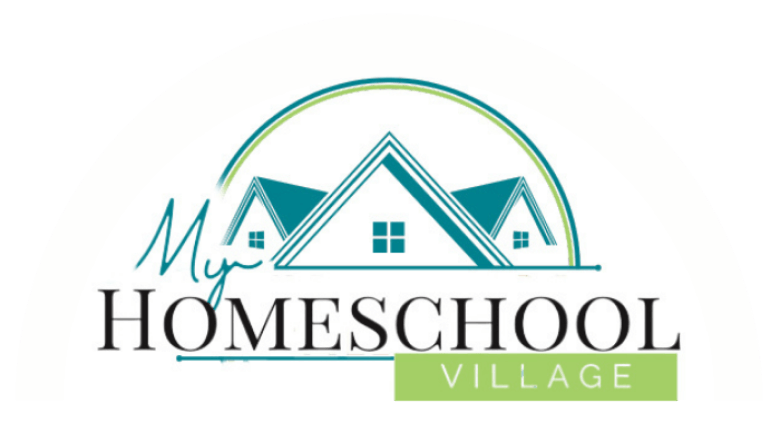
Click here to get a full Prek-12 curriculum from My Homeschool Village for only $30 a month with coupon code HQ5.
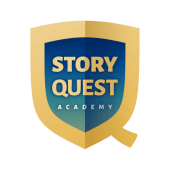
Sign-up To Get Email Updates
Get free & affordable homeschool resources delivered to your inbox.
We use Elastic Email for our newsletter. By submitting this form, you agree we can add your to our newsletter list. <a href="https://elasticemail.com/resources/usage-policies/terms-of-use/" target="_blank">Terms of Use</a> and <a href="https://elasticemail.com/resources/usage-policies/privacy-policy/" target="_blank">Privacy Policy</a>.
We use Elastic Email for our newsletter. By submitting this form, you agree we can add your to our newsletter list. Terms of Use and Privacy Policy .
The Homeschool Quest
- Meet The Team
- Ask A Question
- Newsletter Sign-Up
- Privacy Policy

IMAGES
VIDEO
COMMENTS
Considered a best homeschool writing curriculum, EIW is featured in Cathy Duffy's Top102 Picks! Free Parent/Teacher Support. Any time you have a question while working through the curriculum, you can call customer service, submit a ticket to the curriculum team, or schedule a call with one of our teachers. ...
It includes a total of 480 writing and essay prompts to inspire both elementary and teen students for an entire calendar year! You get two different products with a total value of $7.00. Print the prompts in your choice of three formats: calendars, cards, or strips. Only available for a limited time. Grab their "Journal All Year!".
What You Need to Buy: Student Workbook, Instruction Manual, and access to video lessons. Price: $69-$89. Details About Essentials in Writing: Essentials in Writing is a video-based course that will take a lot of stress off the busy homeschool parent or the parent who is intimidated to teach writing.
Winning With Writing is a secular homeschool writing program designed for grades 1 to 8, corresponding to each grade level. The curriculum is structured based on a 36-week school year, with each week consisting of five separate daily lessons. The program covers various writing aspects, including direct and indirect quotations, dialogue ...
It emphasizes creativity and individuality, incorporating various elements of language arts such as grammar, spelling, literature, and writing. This curriculum is by far the most popular one with Prisma parents! Grade Levels: Pre-K to 12th grade. Cost: Individual online classes range from $99 to $199 per course.
WriteShop Primary is an exciting, parent-guided writing curriculum. Using pre-writing activities, skill builders, and more, WriteShop Junior introduces students ages 8-13 to genre while teaching important writing, editing, and grammar skills. Writing doesn't have to be a tearful experience for your child—or a hair-pulling one for you!
In this creative writing curriculum for middle schoolers (roughly 6th- to 9th-grade), young writers of fiction and poetry learn vital skills such as point of view, characterization, plotting, dialogue, and description. Simple but innovative exercises encourage young writers to strengthen their vocabulary and become aware of the patterns of ...
The Write Foundation is a homeschool writing curriculum developed to equip students with the tools to quickly organize and compose sentences, ... 10, Grades 2-4) Students begin by writing complete basic sentences and quickly develop their basic sentences into creative, more complex sentences using the 9 foundational parts of speech.
The One Year Adventure Novel writing curriculum guides students (grades 8-12) step by step through the process of writing a compelling, fully structured novel in one school year. DVD-based and self-directed, it is ideal for home school students but also works in co-ops and schools.
A homeschool writing curriculum can be a single program or a set of educational materials used to teach writing skills. These resources can be digital or physical and include lessons, activities, games, and exercises that cover different aspects of writing such as: ... Other creative writing (such as poetry) There are many reasons for using a ...
Home 2 Teach. Home 2 Teach offers college-prep writing classes for students aged 8-18. Sessions are six weeks and offered four times per year. It is exclusively for homeschoolers, and students must submit a writing sample for placement. These courses are a great way to give your advanced writing student an edge.
Top 5 High School Writing Curriculums. IEW. Easy Grammar. Analytical Grammar. Jensen's Grammar. BJU Press Grammar & Writing. Research papers, essay writing, grammar, and communication are several of the critical writing skills that are learned in high school.
WriteAtHome has offered online writing courses since 2001, and we have since added literature, ELA, and history courses for students of all abilities in grades 4-12. Our writing courses include personalized tutoring from our writing coaches, and our other classes provide teacher and TA support. WriteAtHome exists to support families by helping ...
Cover Story Cloud Set is a homeschool creative writing curriculum for grades 6-9. Students work on language arts skills by creating their own magazines. That is why it is called Cover Story! Through a wide range of writing assignments, kids create a magazine on a topic of interest. Kids create short stories, poems, reviews, editorials, and more
Piece of Cake. I started using IEW in 2018 in my homeschool with my now twenty-year-old son. He wrote circles around all the others in his first-year college writing courses. He is in the top 10% of his college class and received an invitation (nominated by his writing instructor) to join Phi Theta Kappa honor society.
First, please remember that any teacher can use these creative writing lessons. You don't need to be teaching homeschoolers. You can be a classroom teacher or a homeschool teacher at home with one student. You can even be a librarian who needs a fun program series. Second, I used these creative writing lesson plans with upper elementary ...
The Creative Writer is a series of four courses, each of which should take one school year or 36 weeks to complete. While the target audience is students in grades five through eight, this series definitely can be used with older students too. Volumes Three and Four might even be a better fit for high school students.
EIW™ Level 7 is a homeschool writing curriculum that features a slow, systematic approach for students aged 12-13 who want to learn how to write well. The step-by-step approach allows students to focus on small, daily assignments, so they don't feel overwhelmed. Includes access to ONLINE Student Book and Teacher Handbook Includes lesson-by-lesson online video instruction for students ...
Short Stories to Tall Tales. Our three live online creative writing courses are designed to delight 7th-12th grade homeschoolers who love to write their own stories and poems and who pine to have time to explore, refine, and share their creations. These small classes offer students a safe place to share, compare, and support each other.
7. The Best Online Creative Writing Courses Foster a Writing Community. A creative writing course fosters a creative writing community. This community gives you the motivation to create, as it creates a safe environment to experiment, take risks, and grow in your writing practice.
Watch this free arctic animals-themed creative writing class with Heather Huhman from Love of Learning. Heather gives an overview of the steps beginning and emerging writers can take to develop a short story. Then she will teach you and your children how to write creative -- and sometimes silly -- stories about a variety of arctic animals.To get the most out of this live
Writing with Hobbits is part of the new series Creative Writing Through Literature. Purchase the whole series or explore one of the lecture sets for your homeschool: Writing through the Wardrobe. Writing through To Kill A Mockingbird. Writing with the Bog Owl. License: This product is licensed for use by one family.
Free Mad Libs-Style Creative Writing ClassJoin us for a free arctic animals-themed creative writing class with Heather Huhman from Love of Learning Live. Heather will give an overview of the steps beginning and emerging writers can take to develop a short story. Then, Heather and the participants will work together to write creative -- and sometimes silly -- stories about a